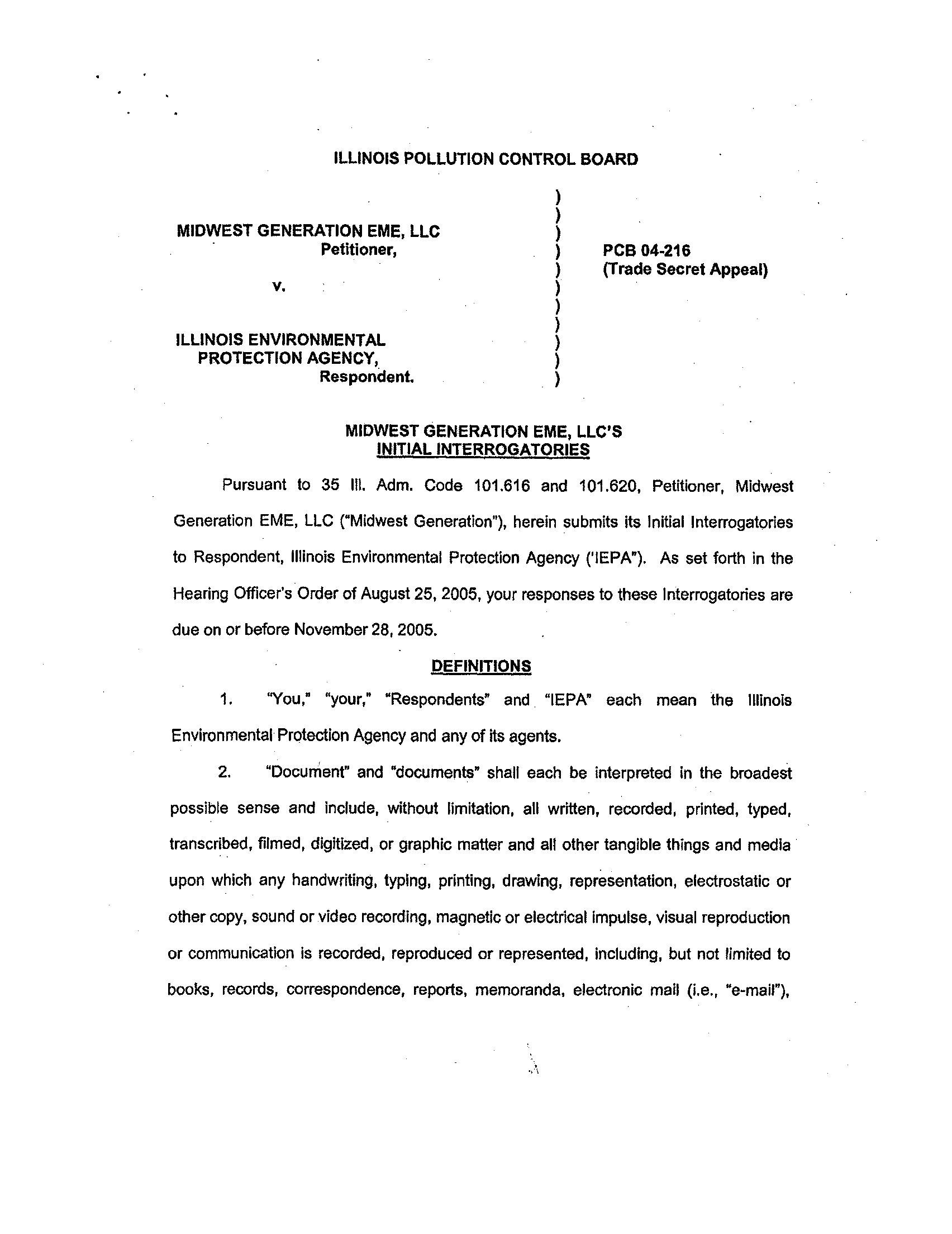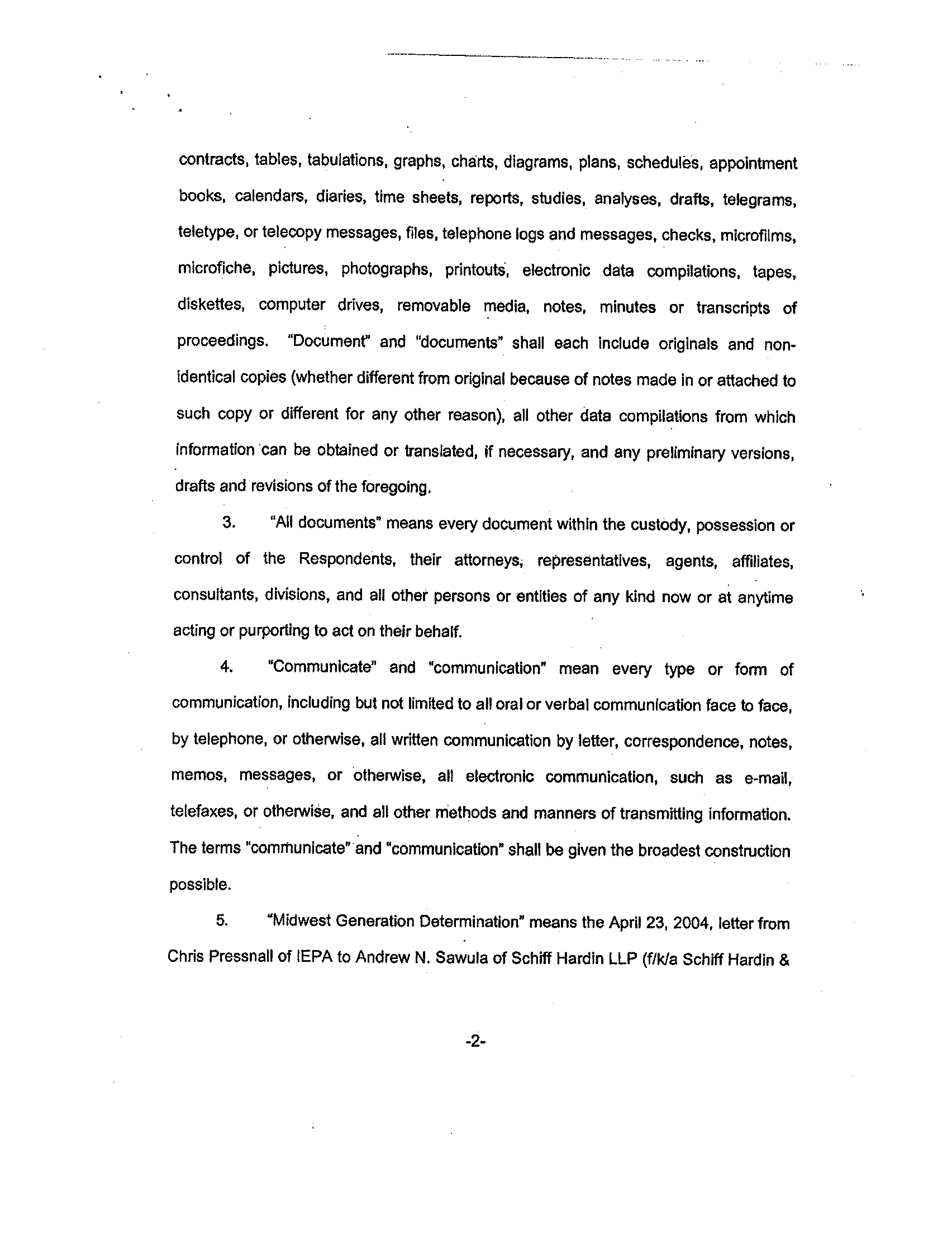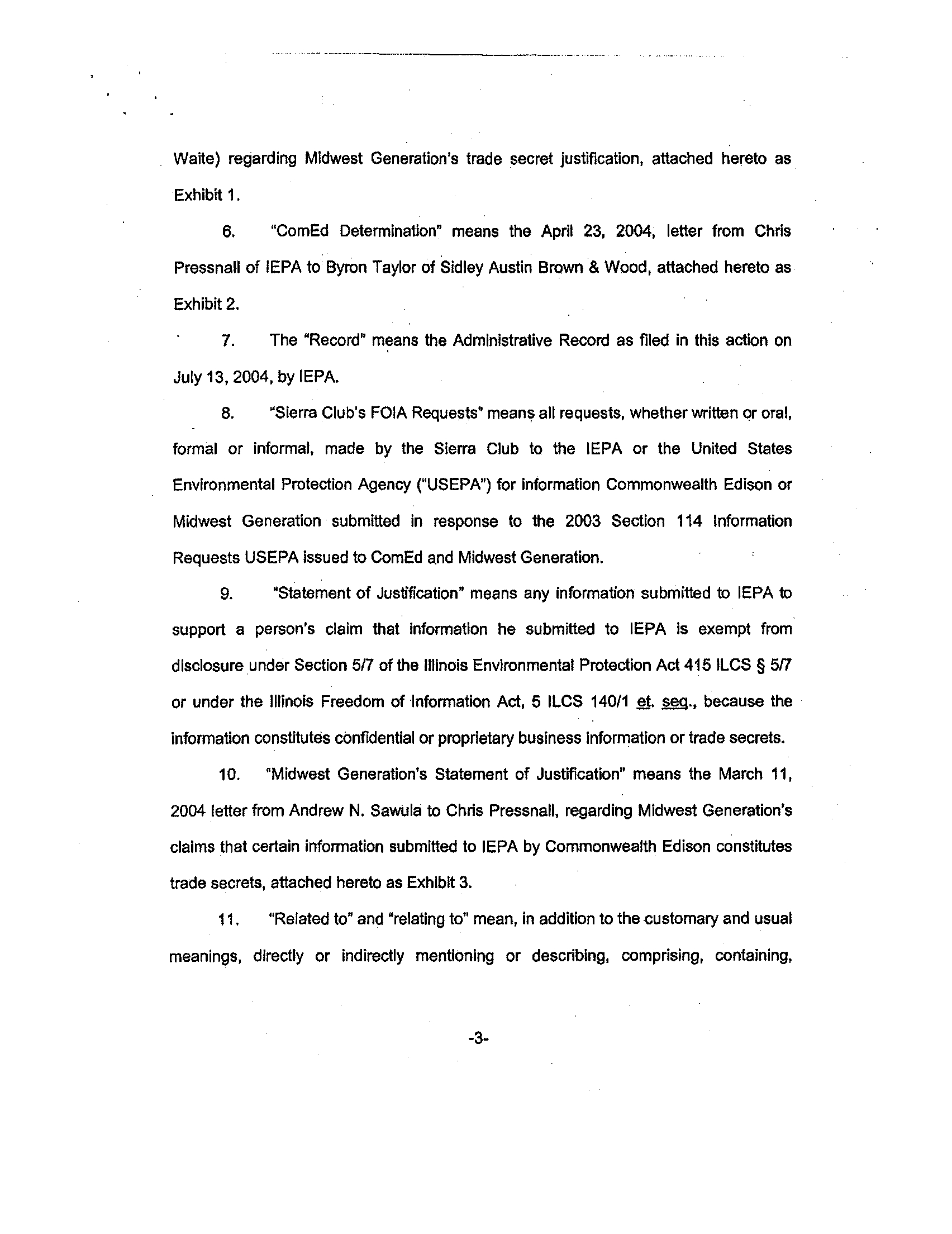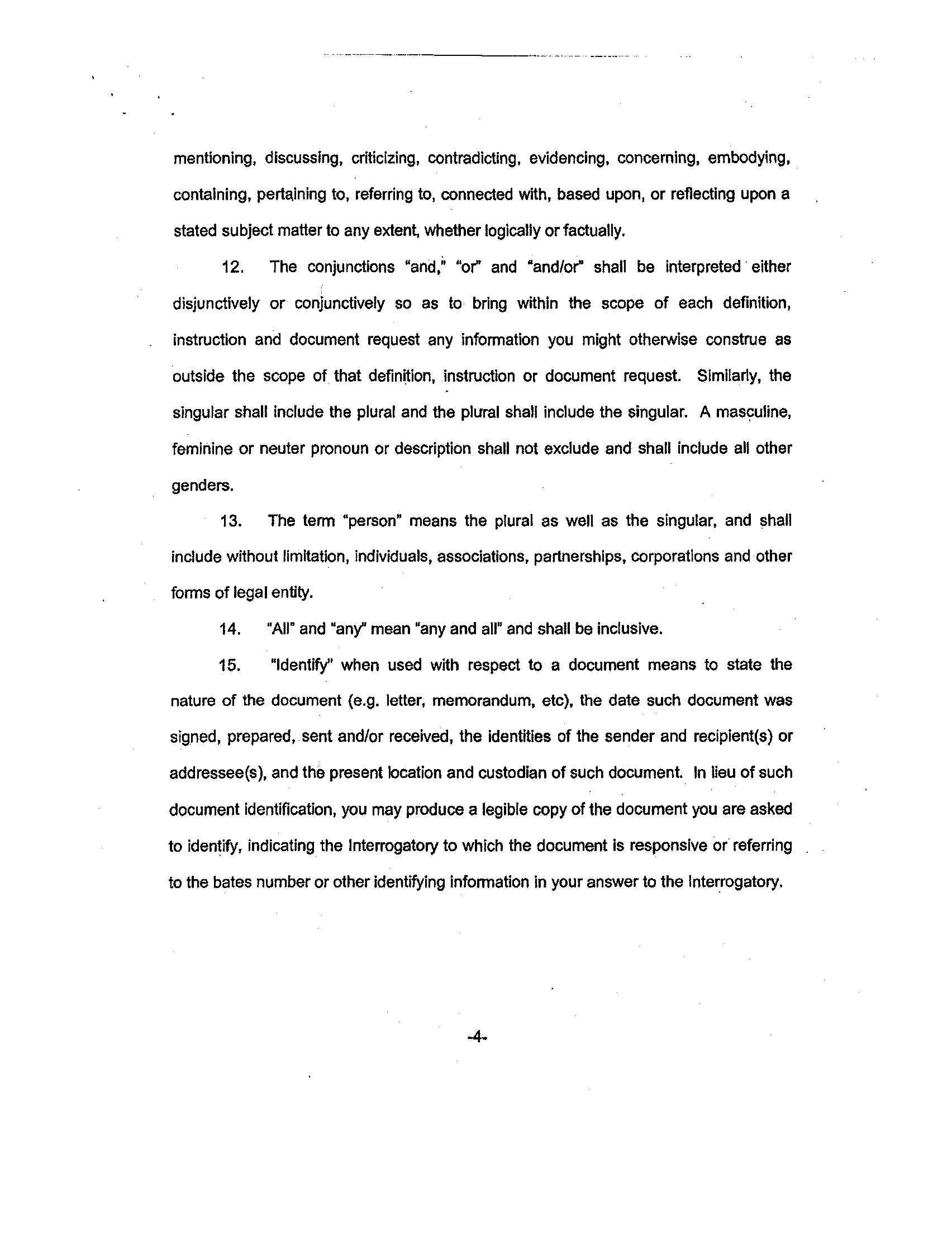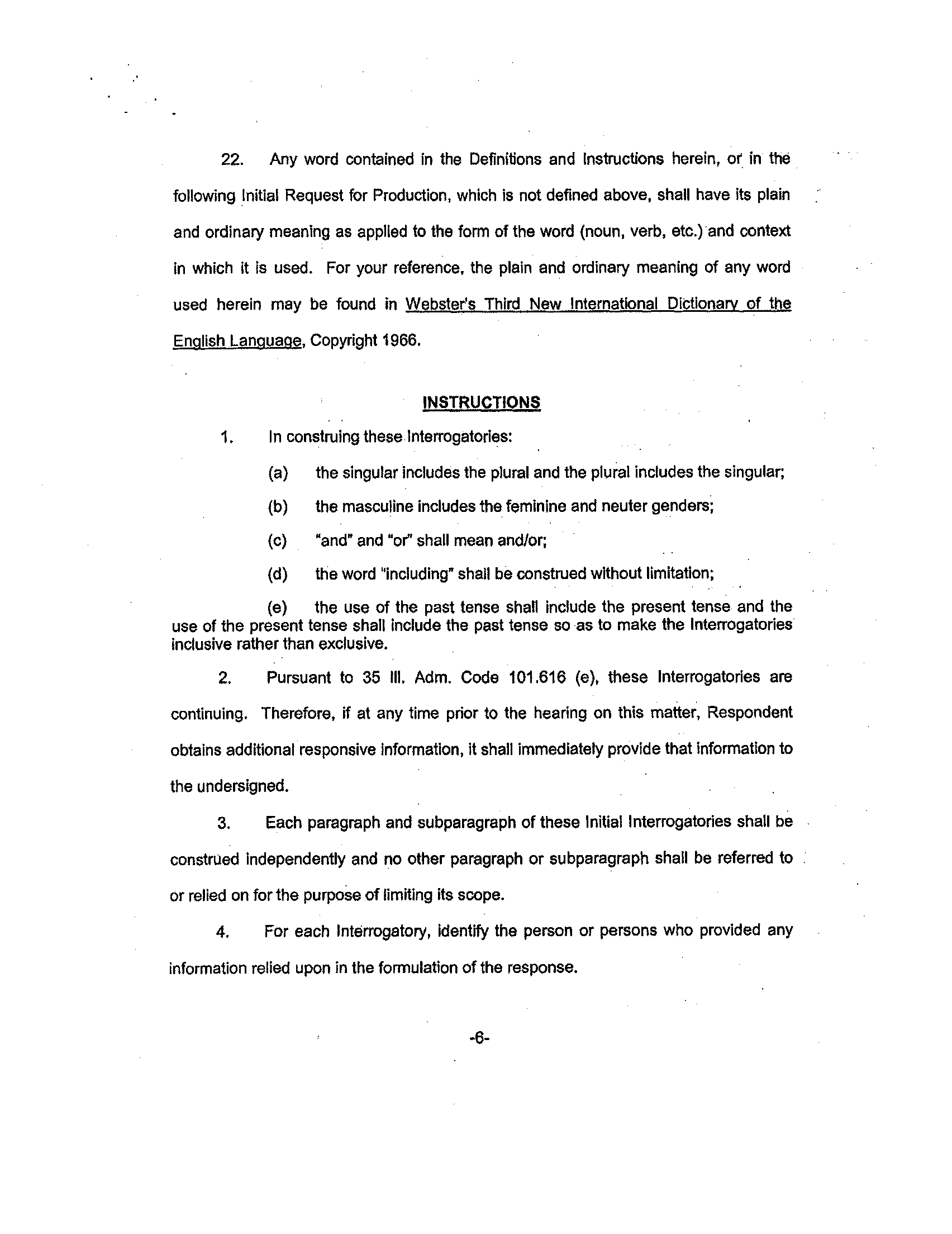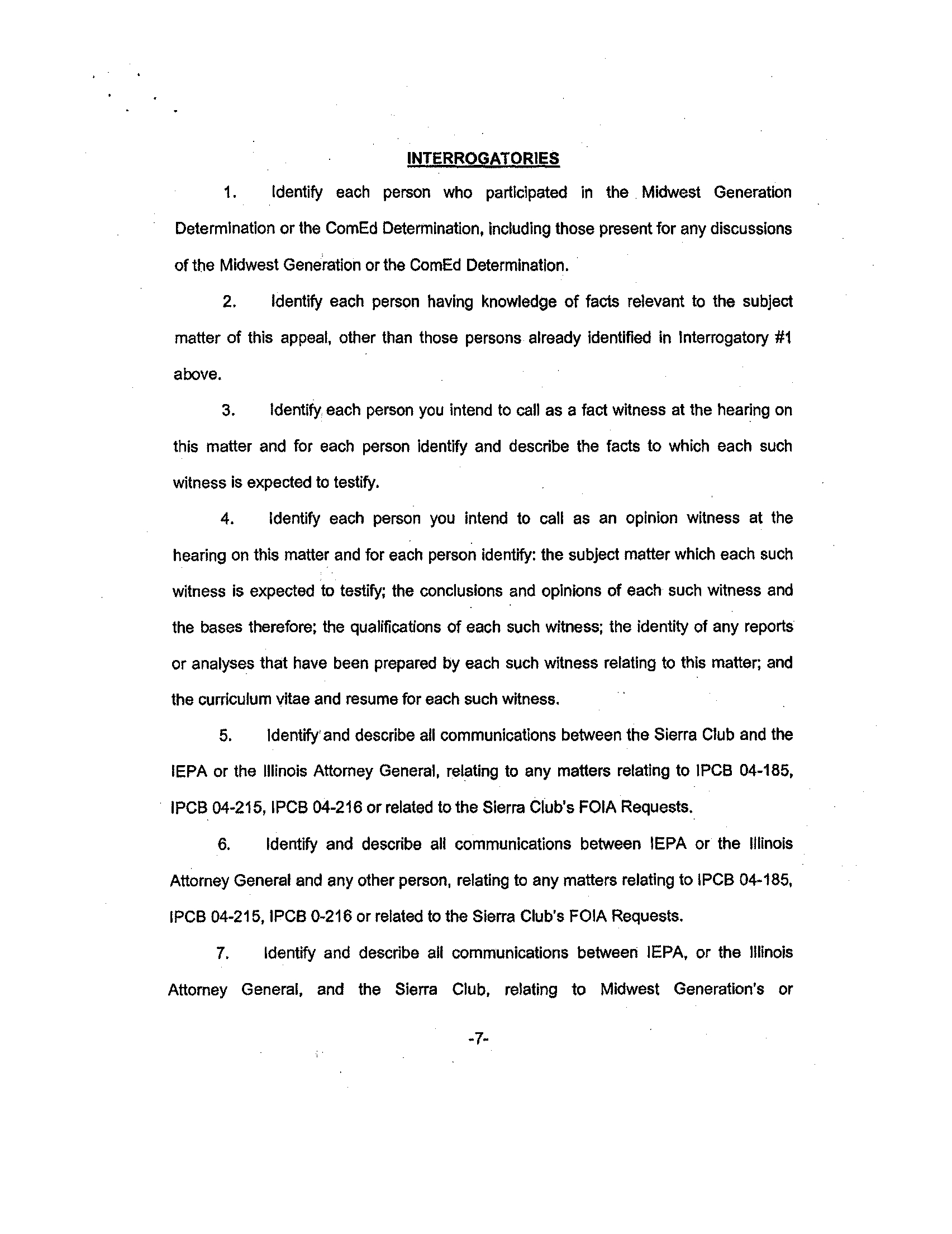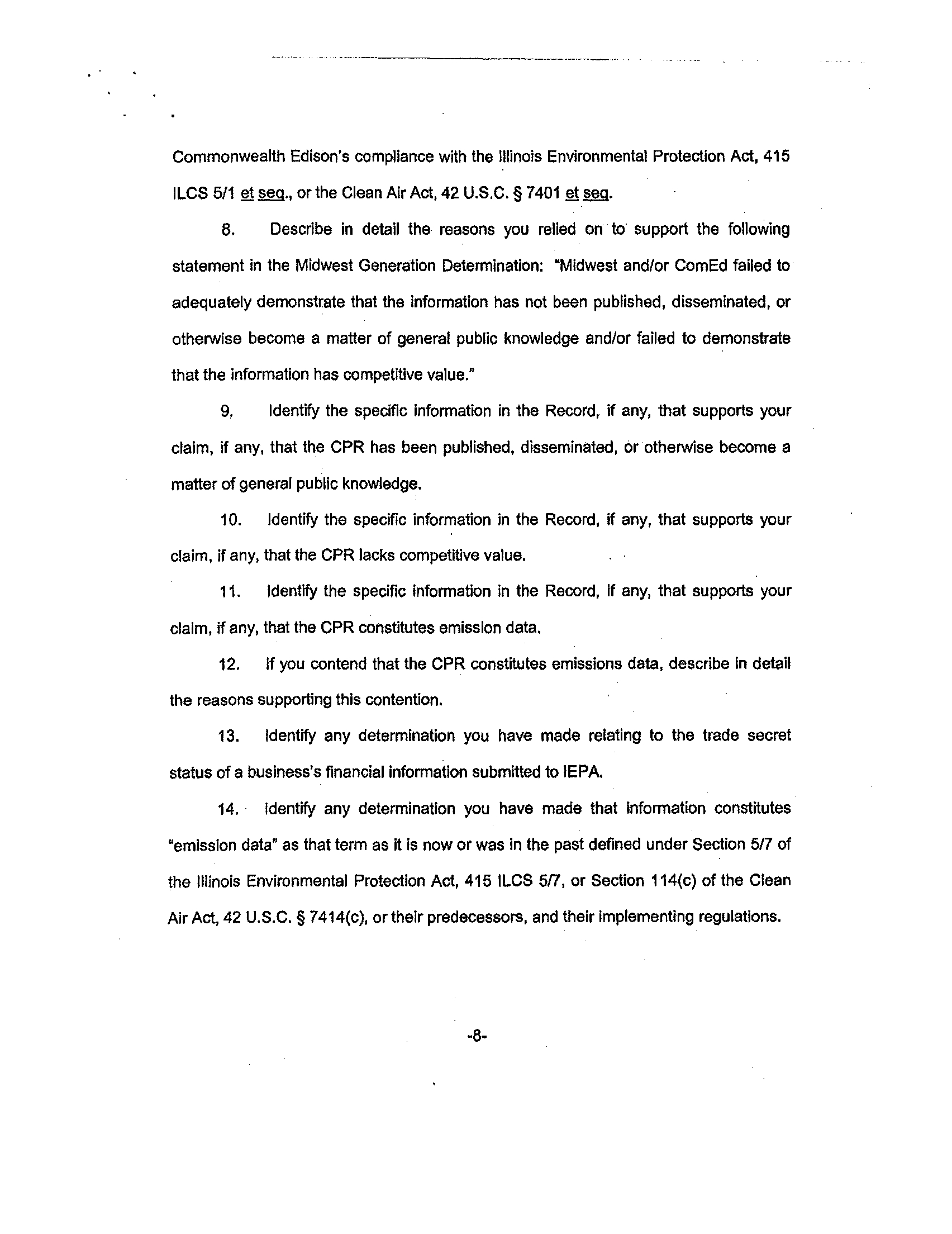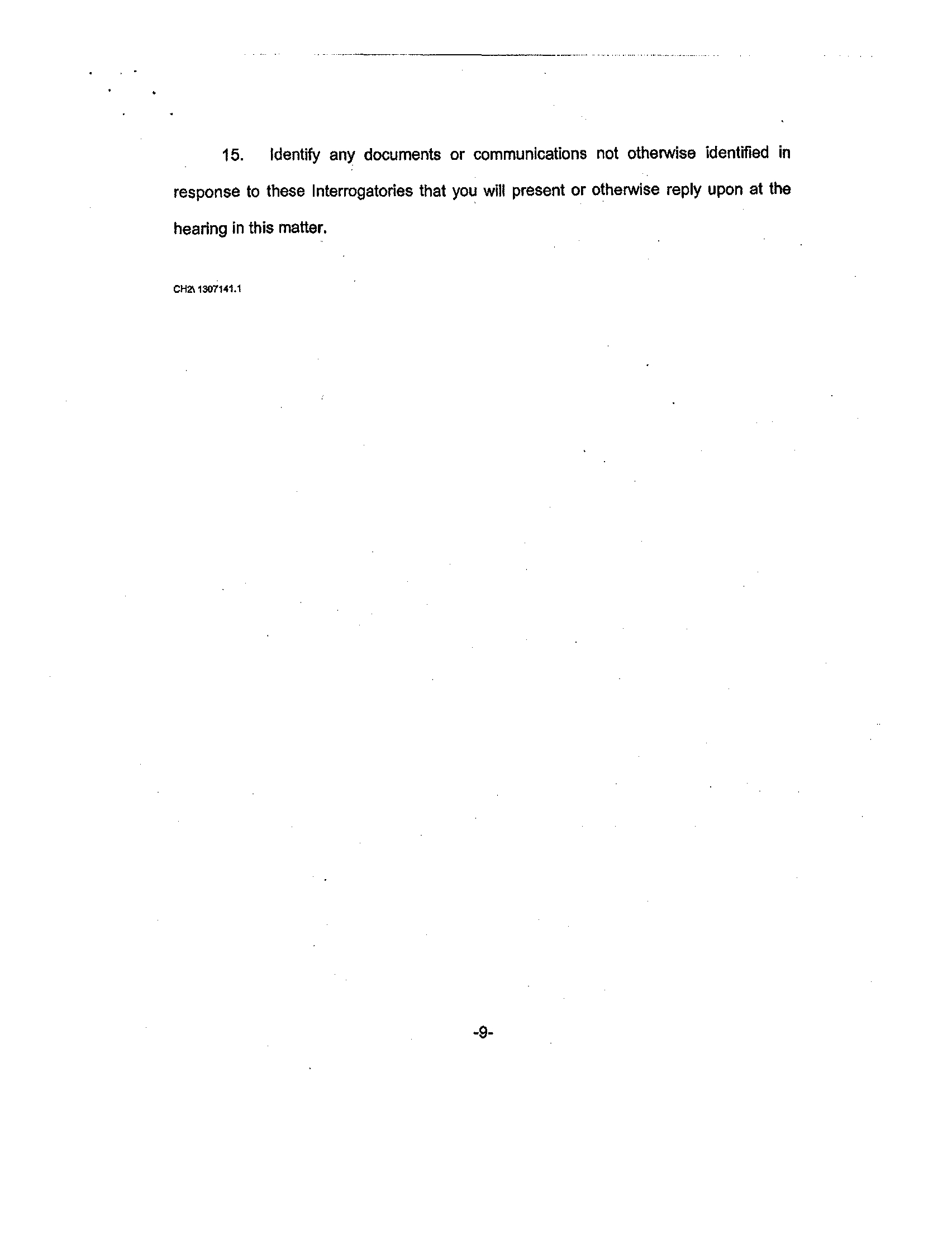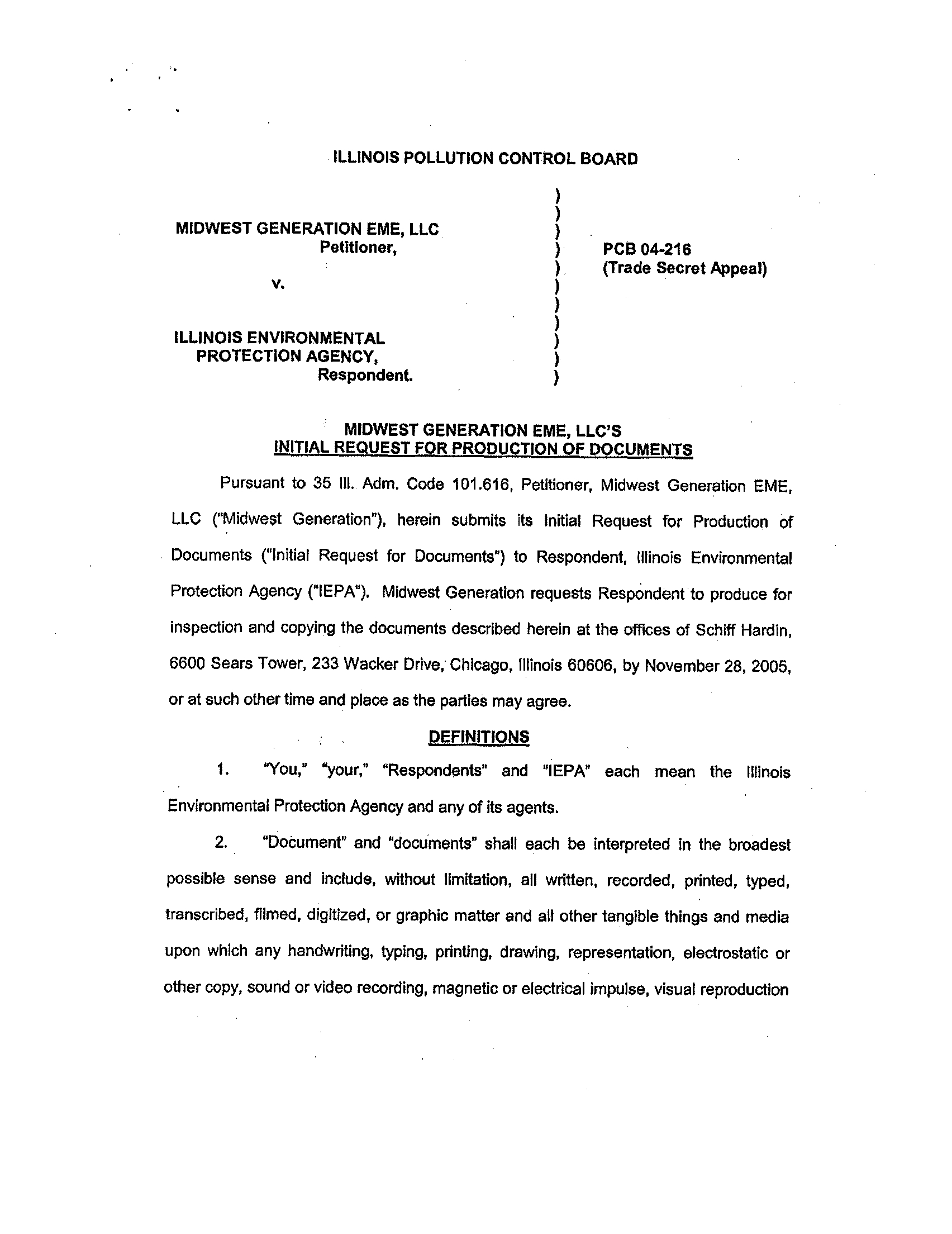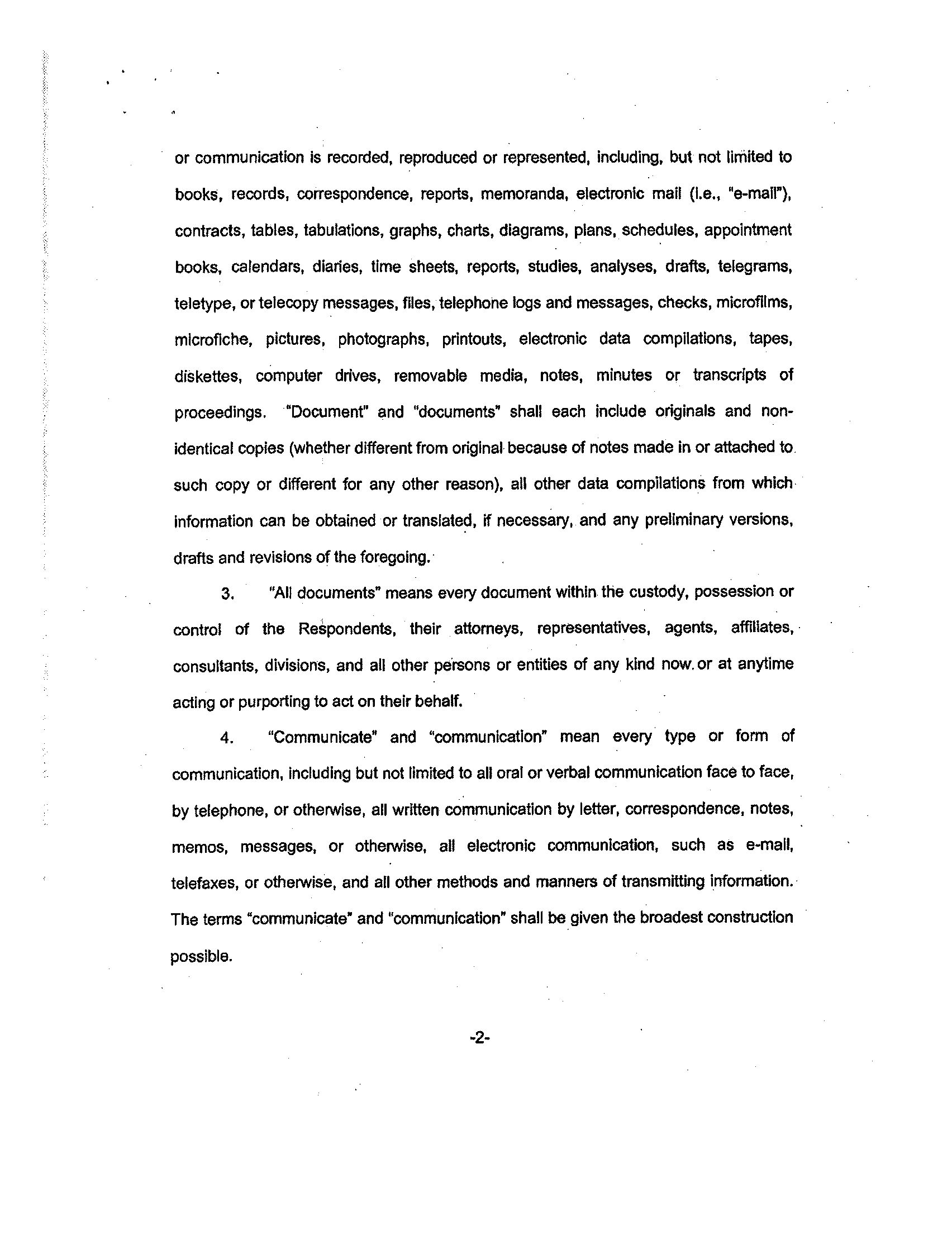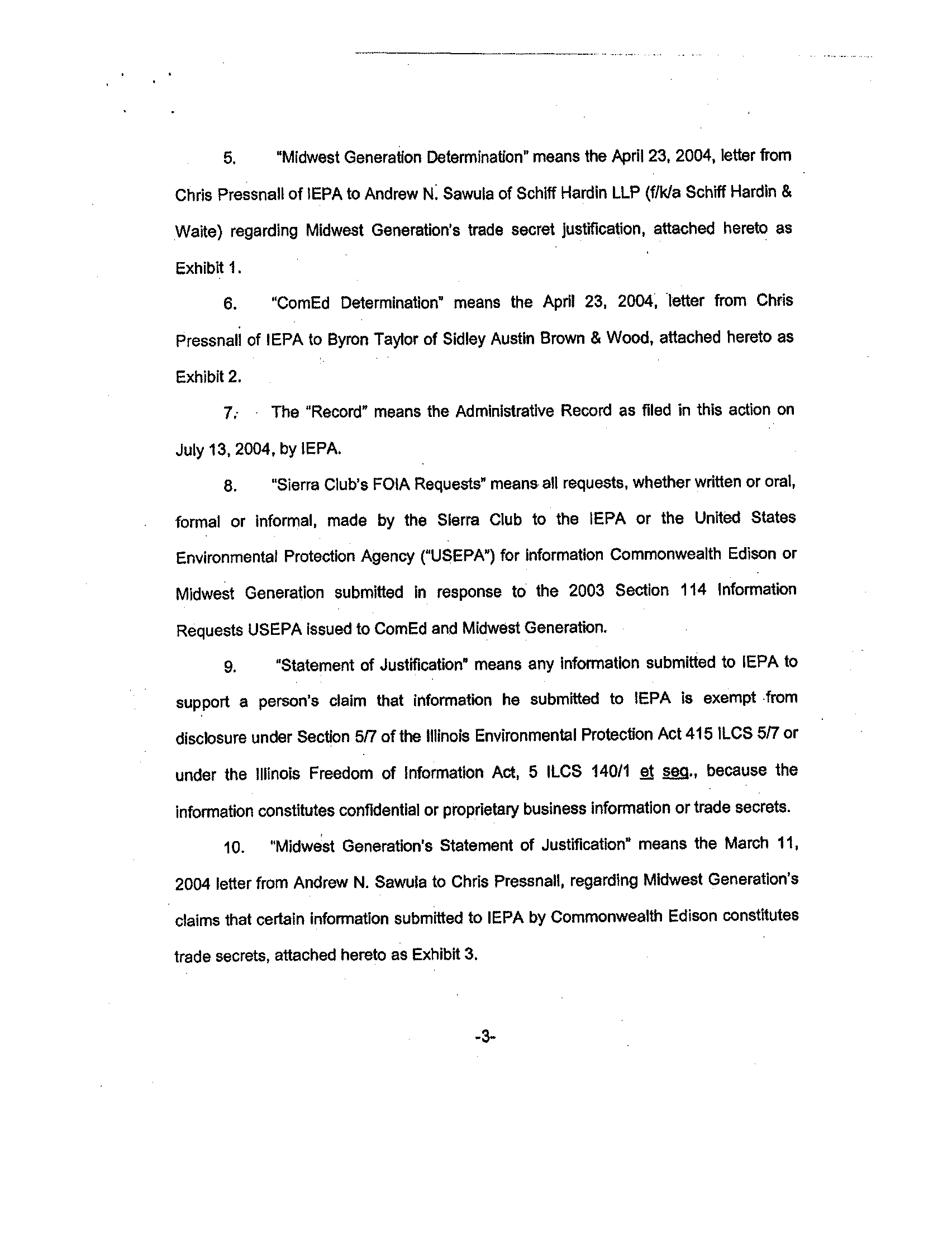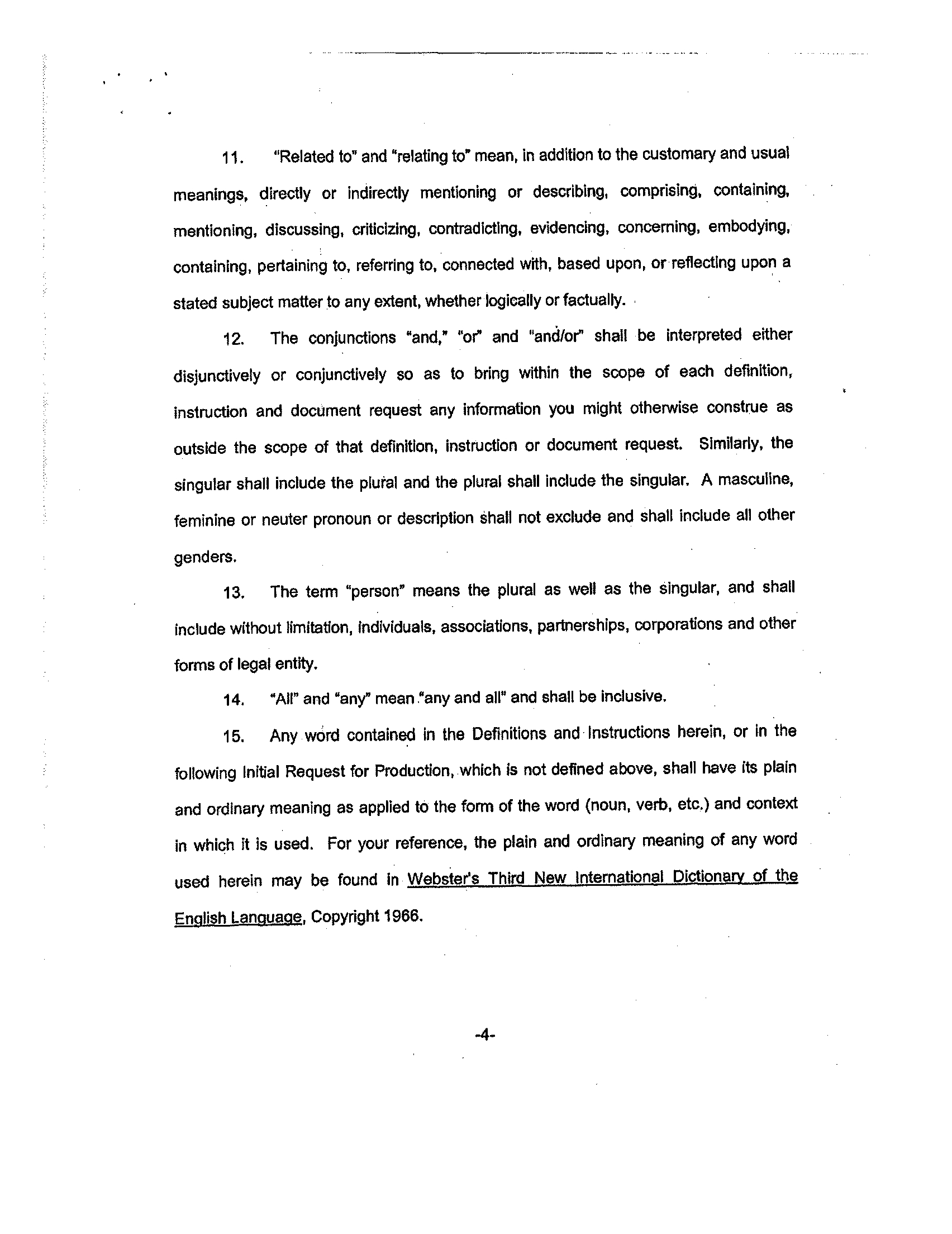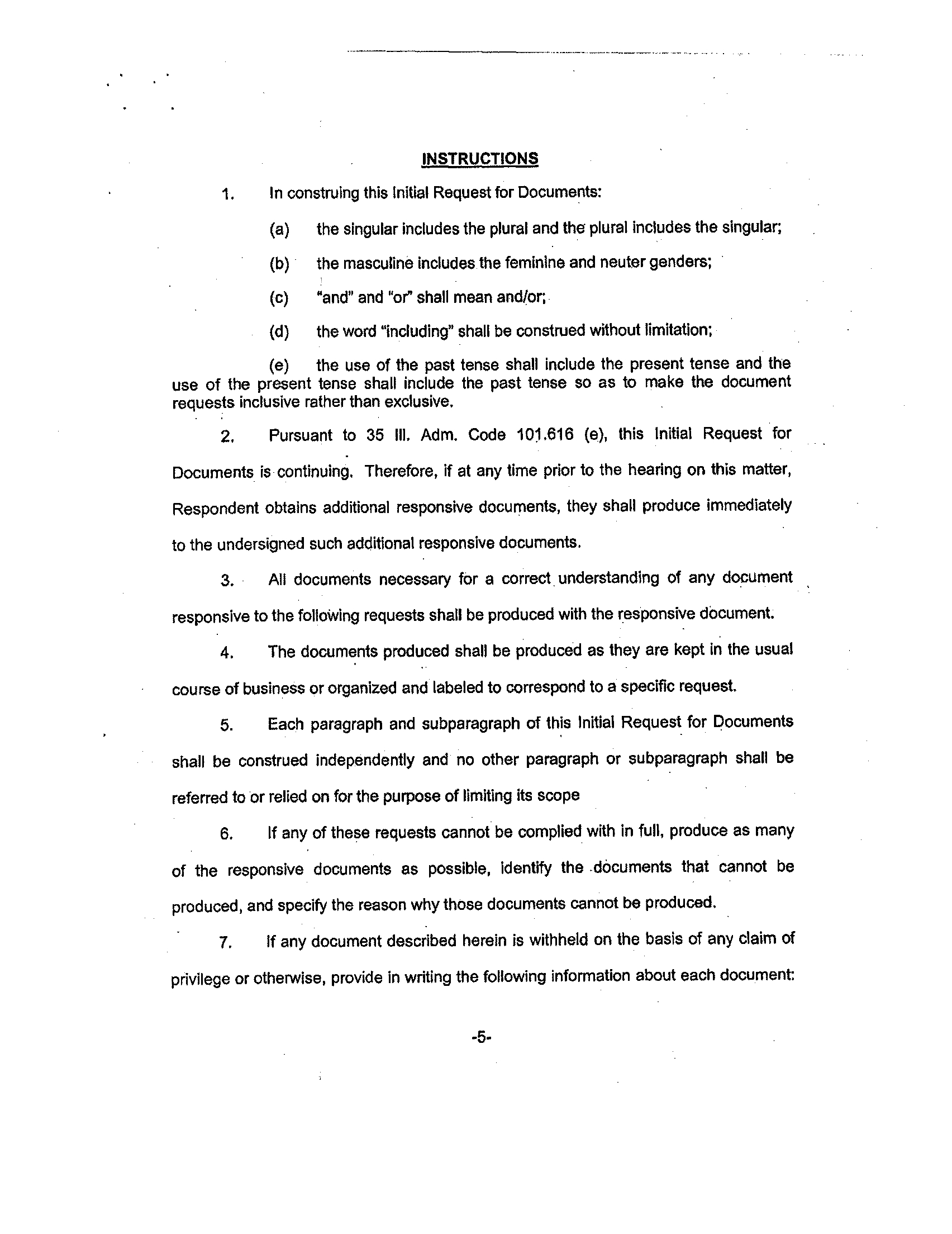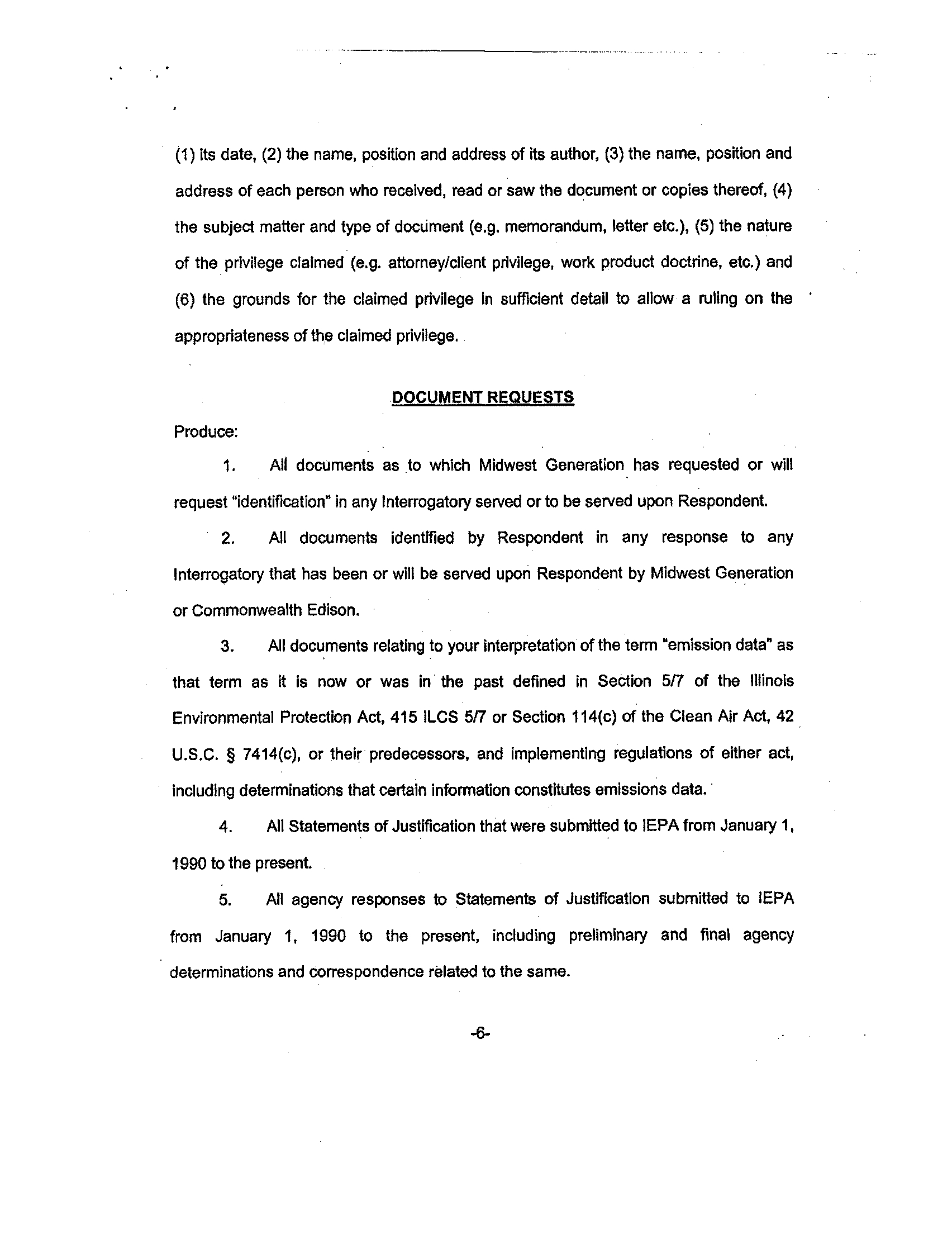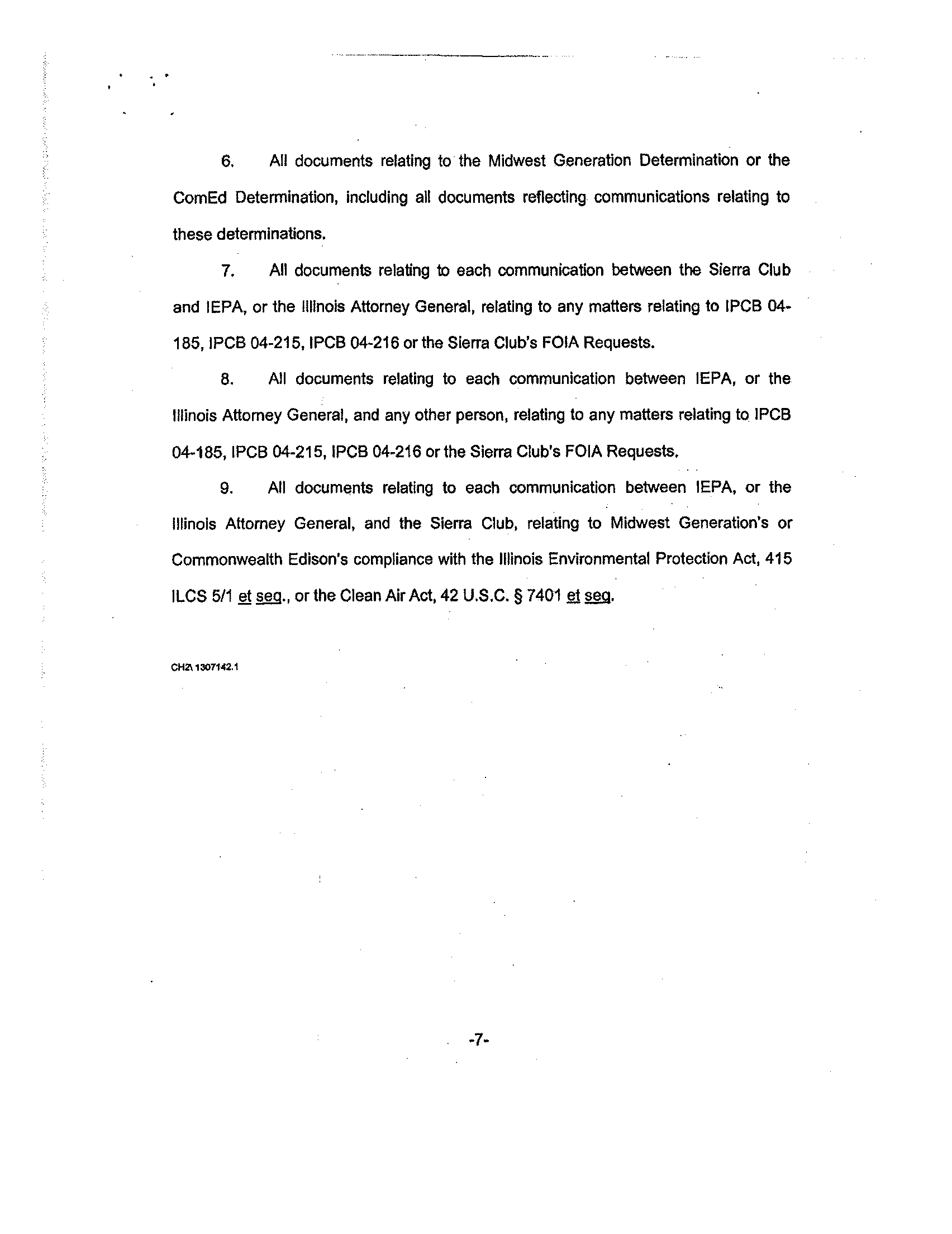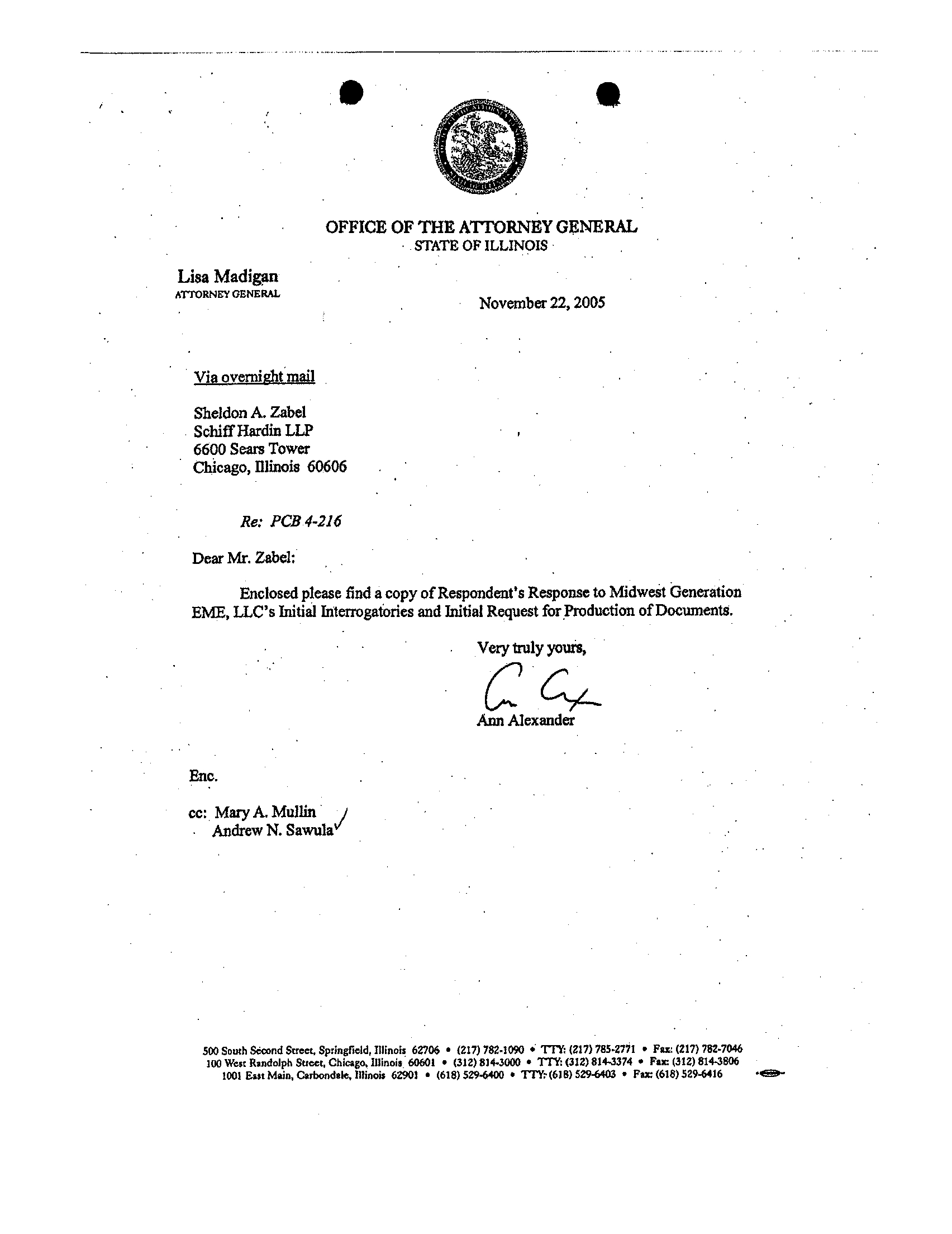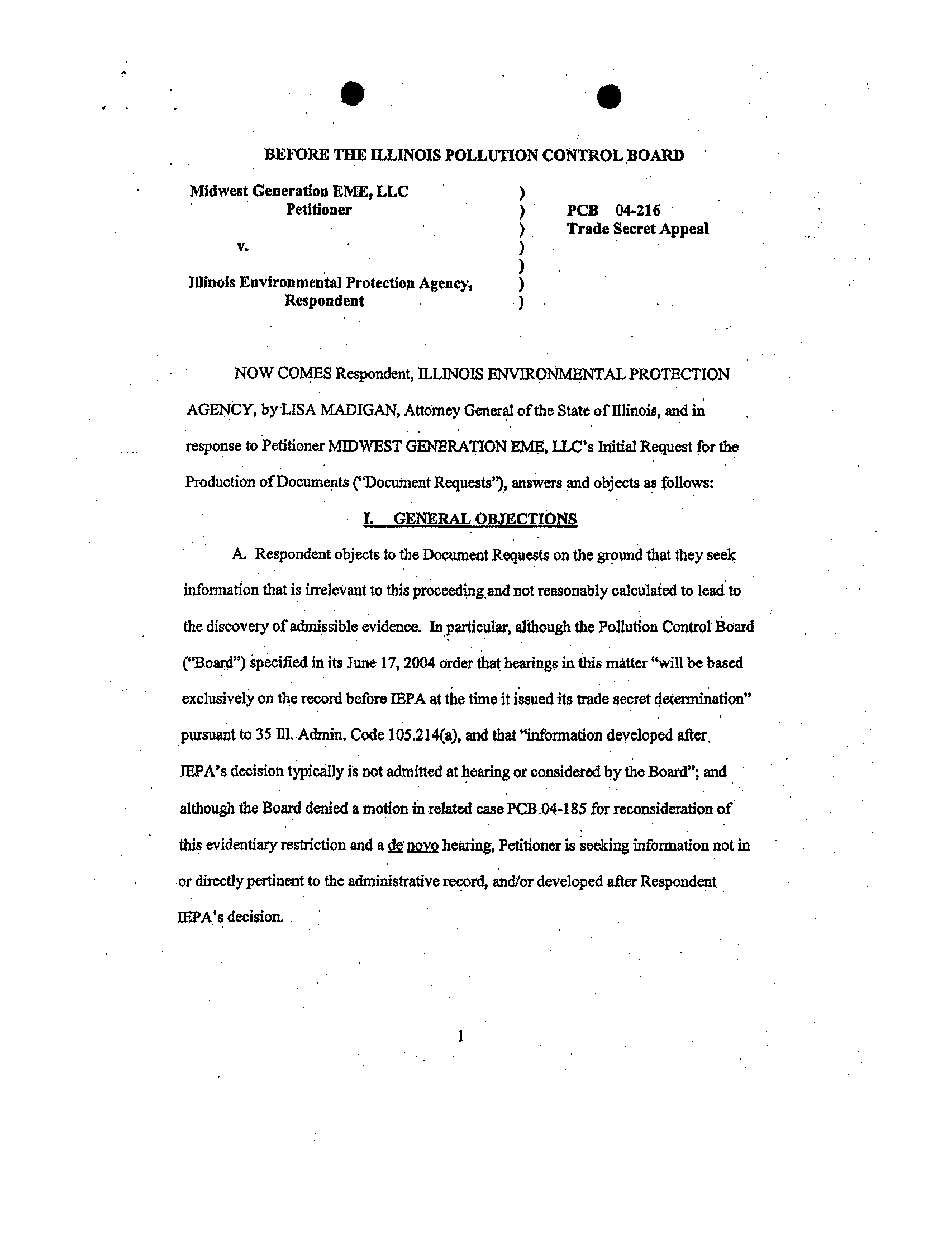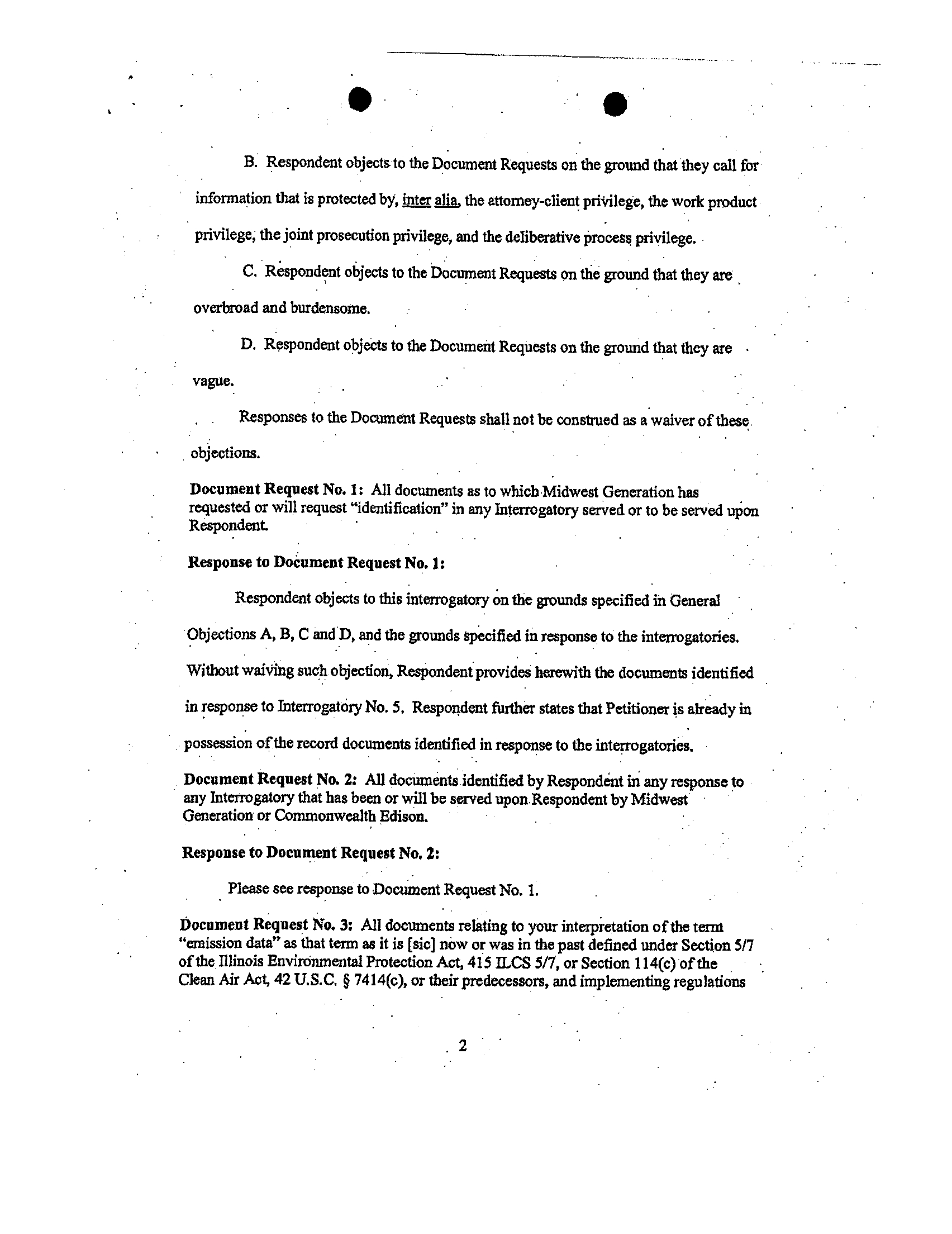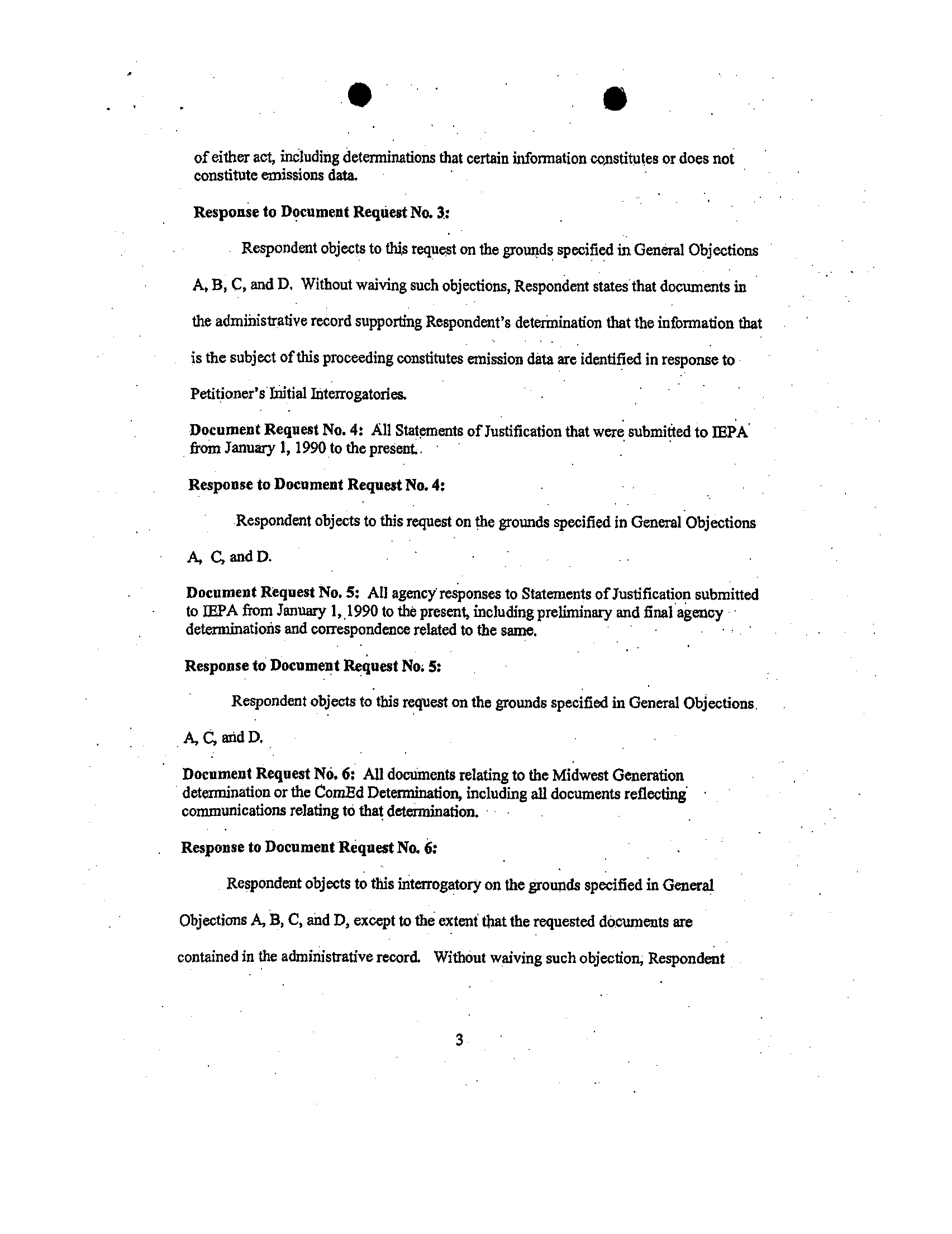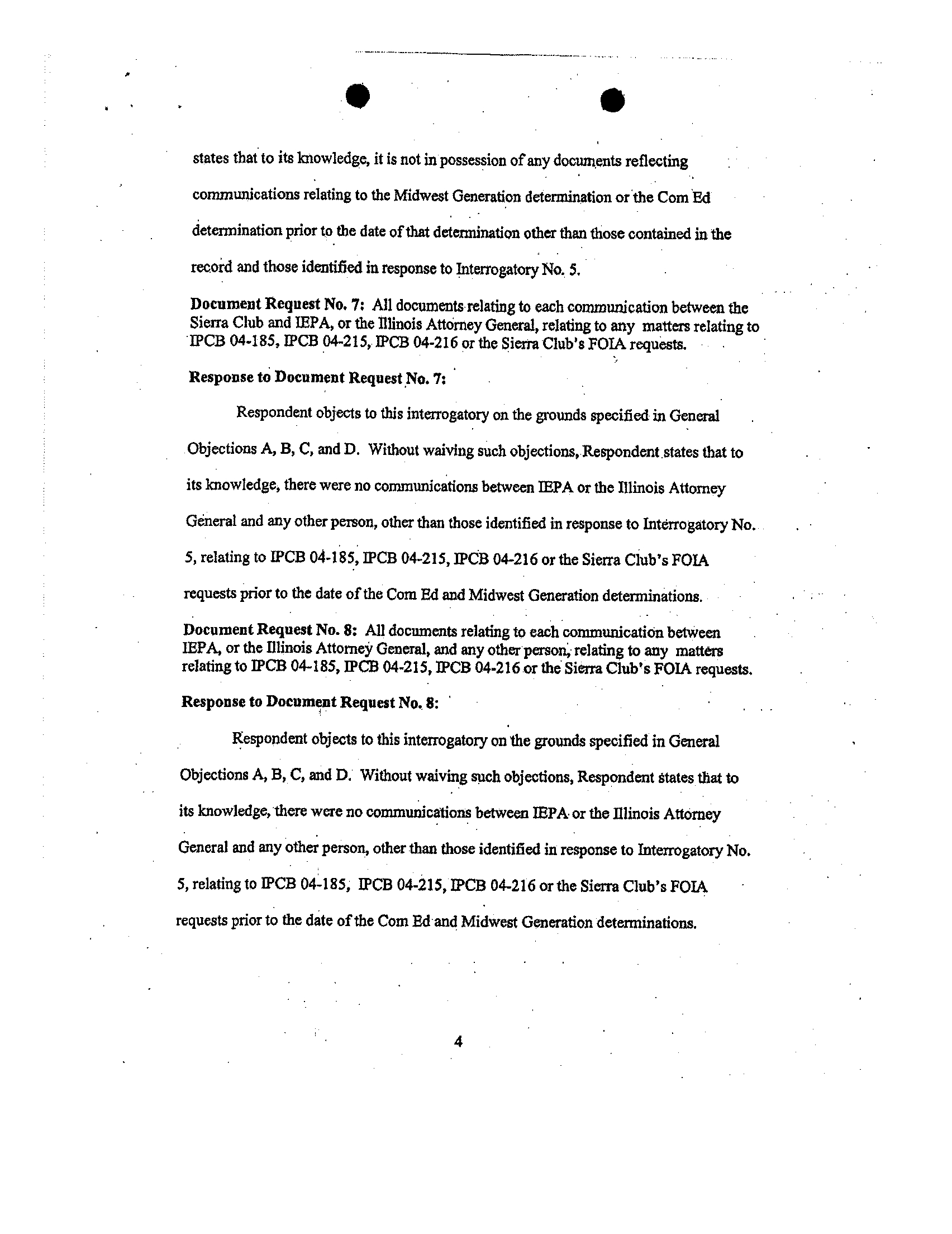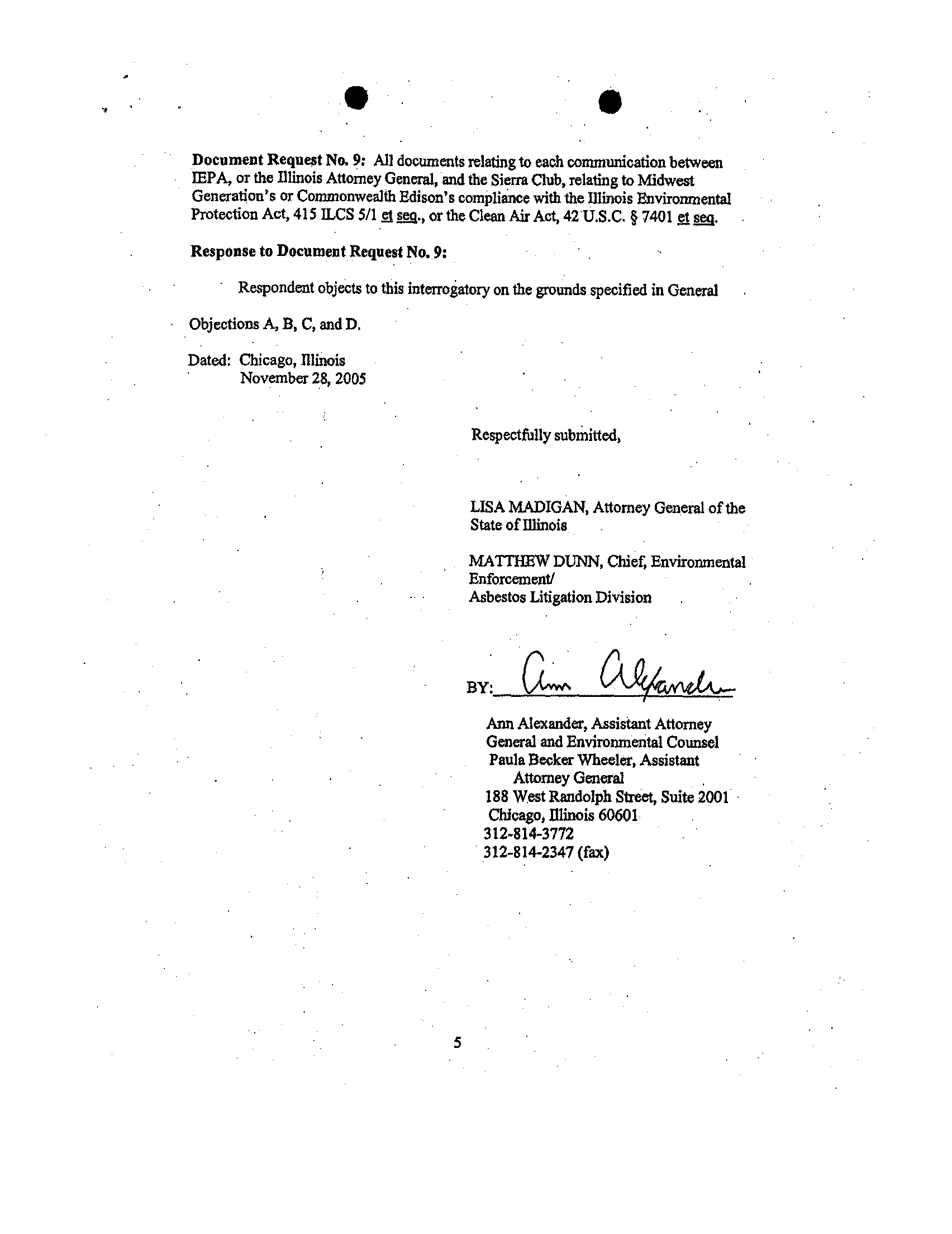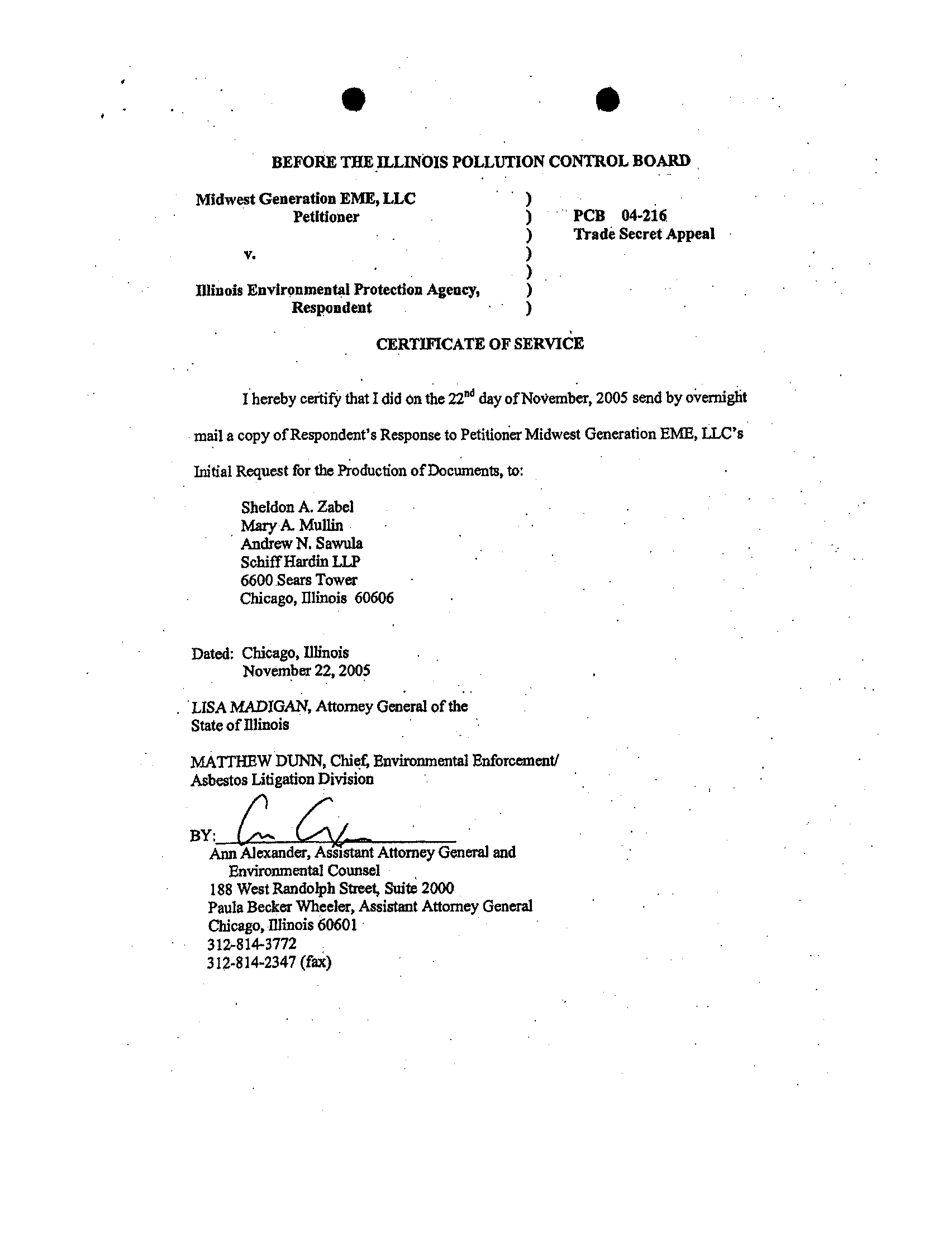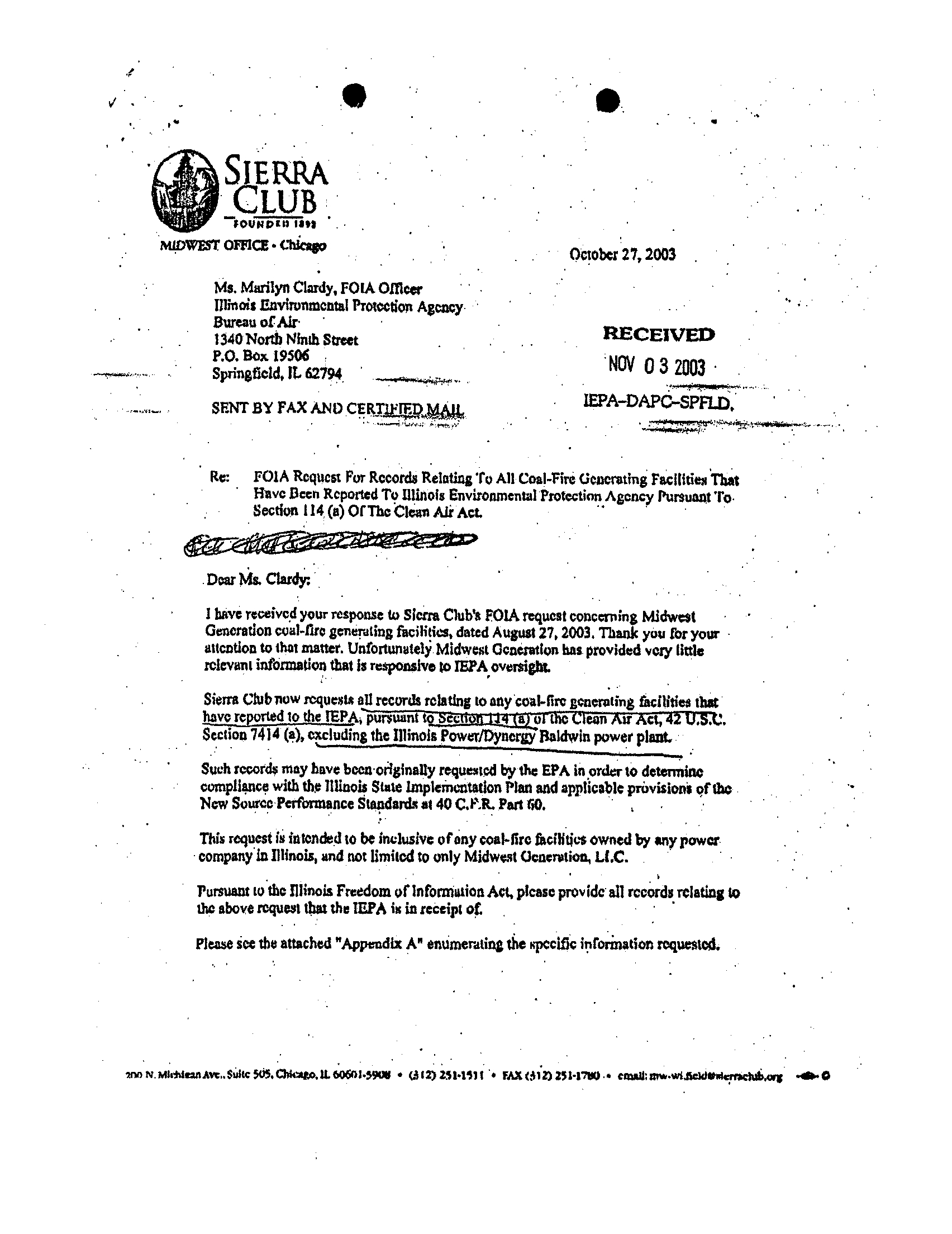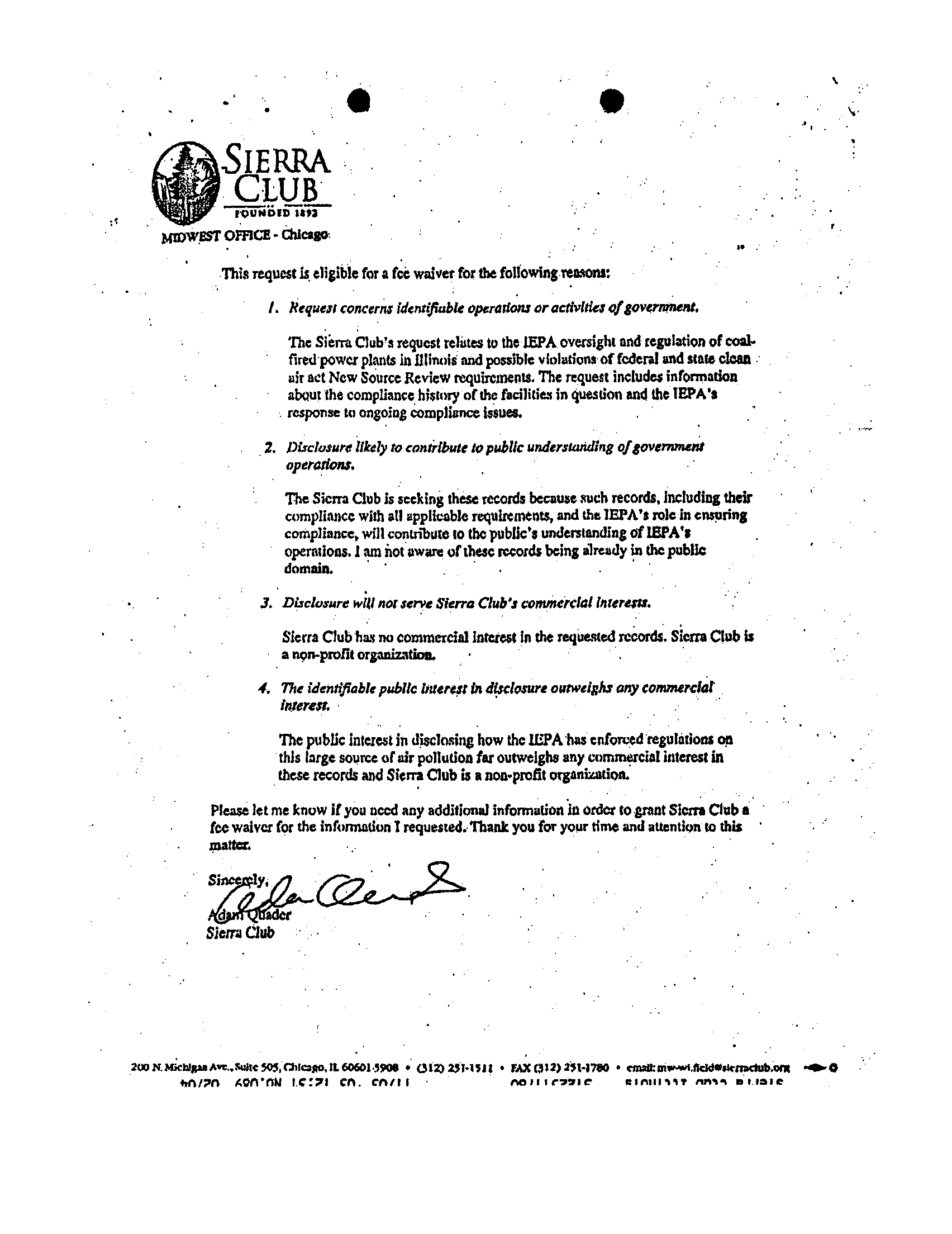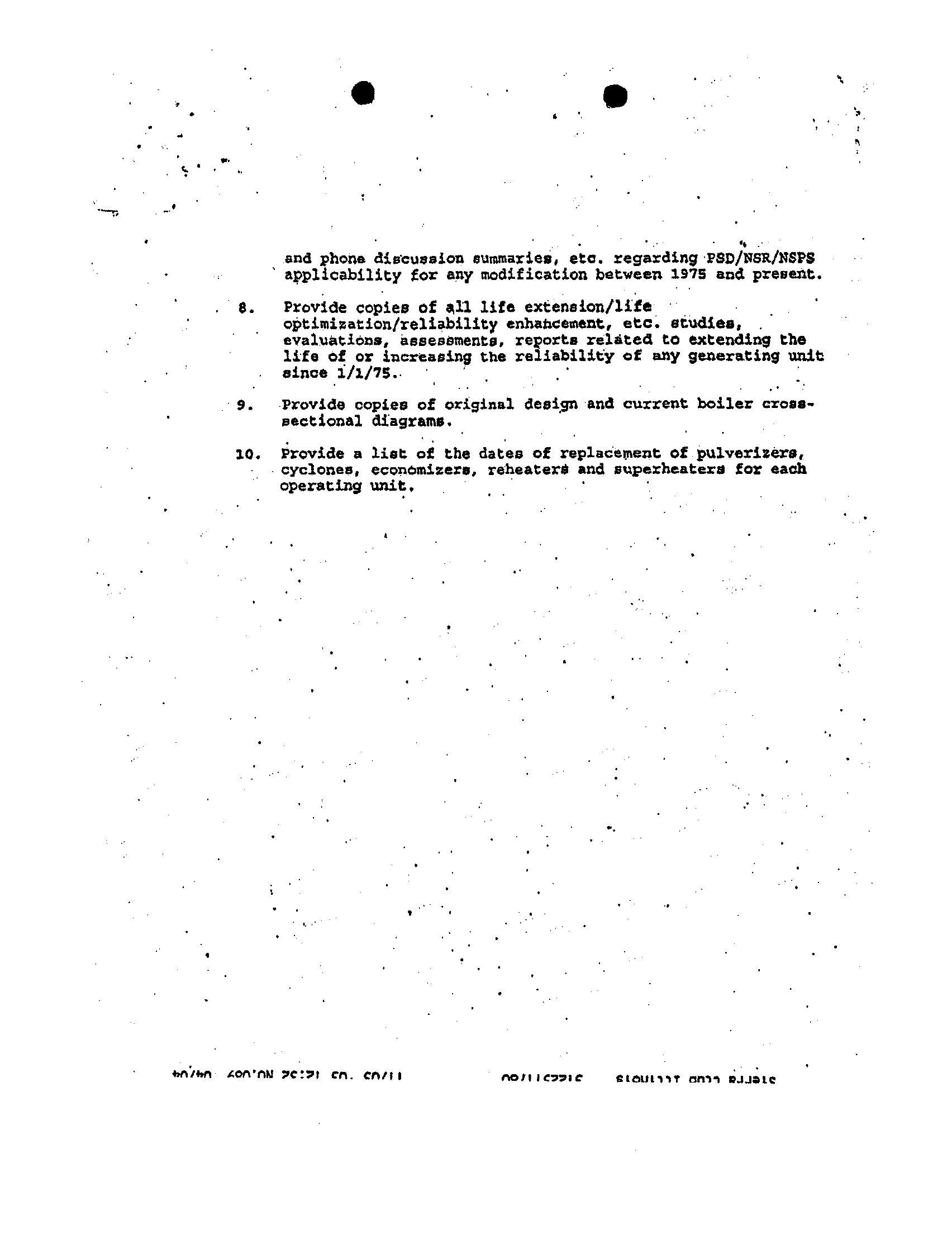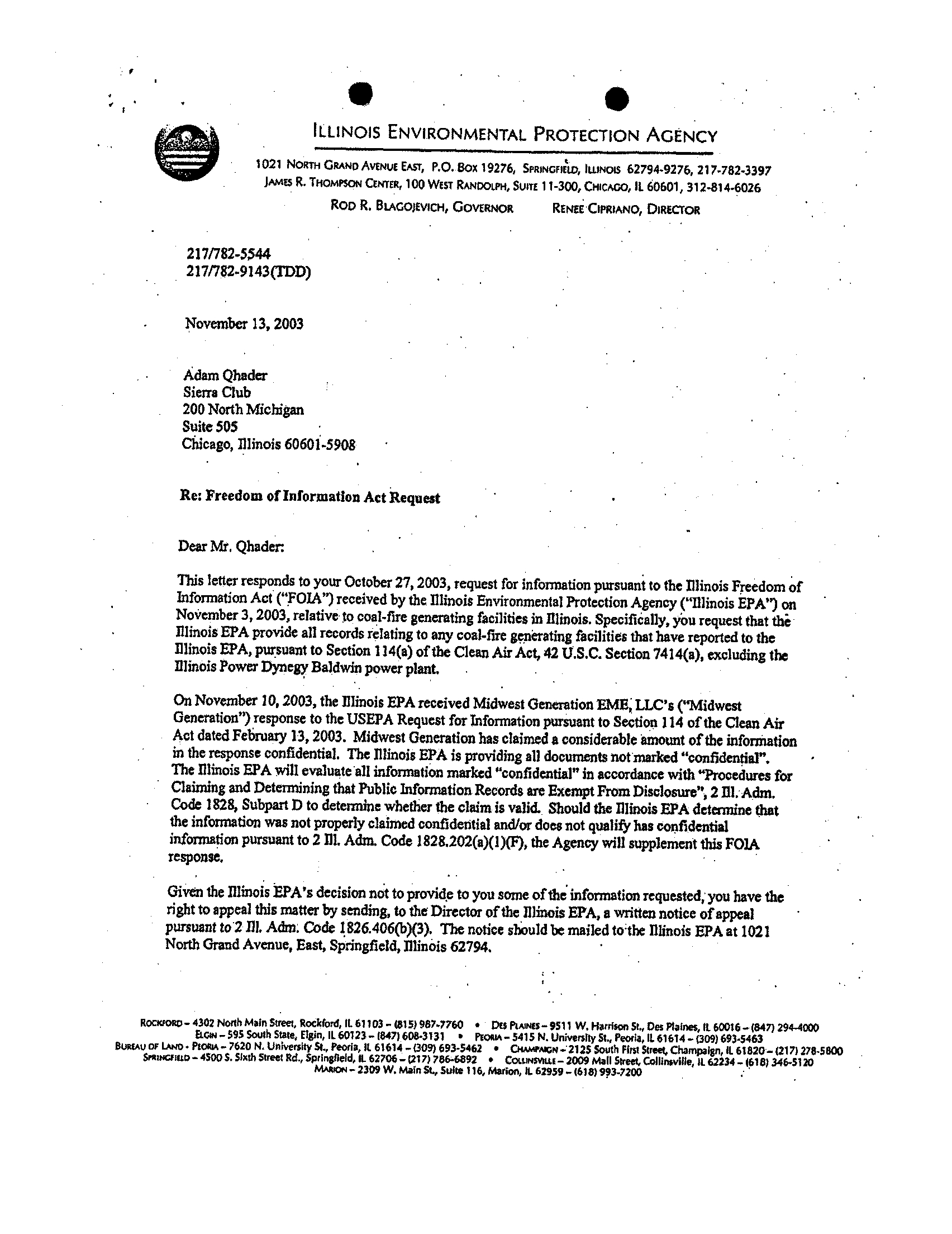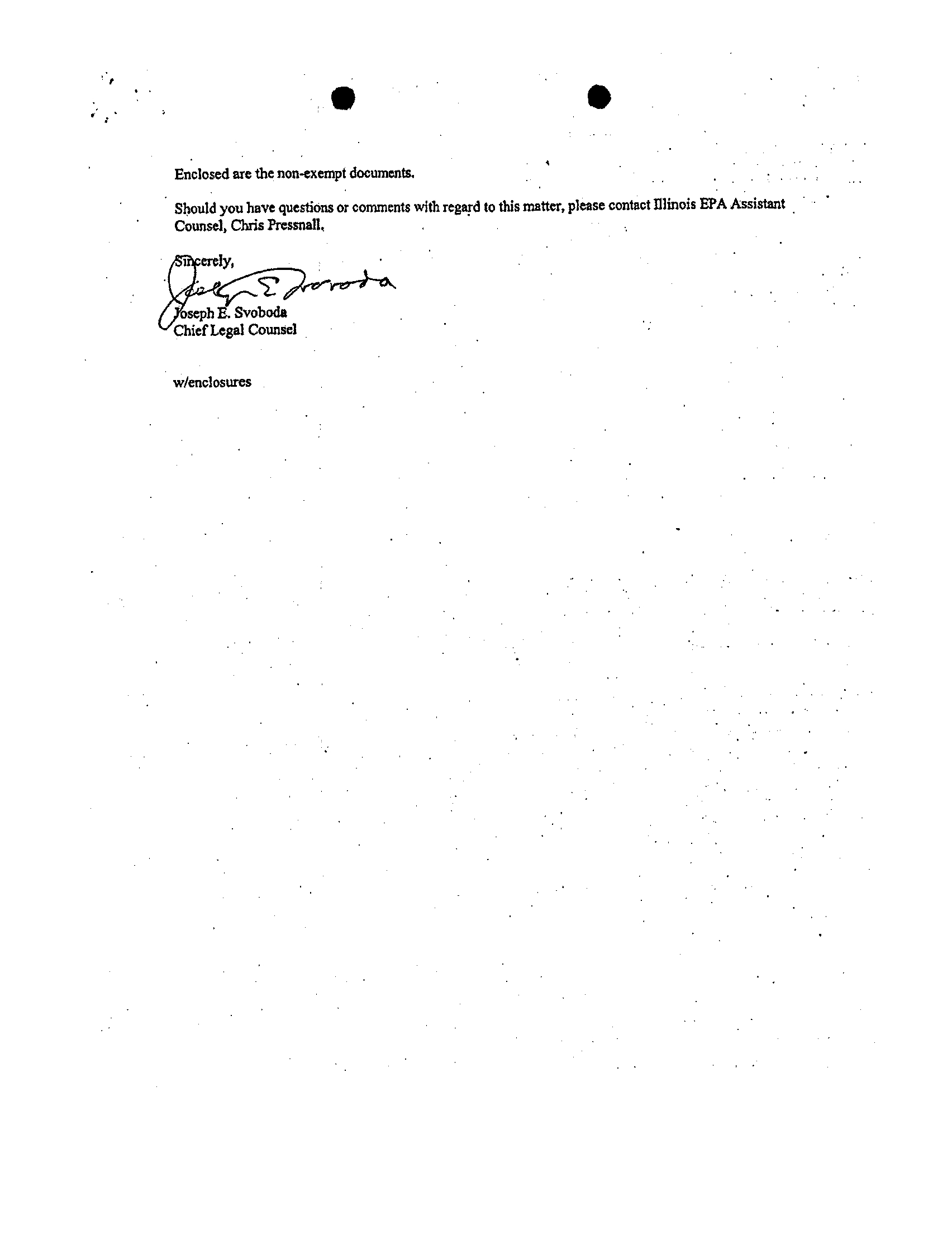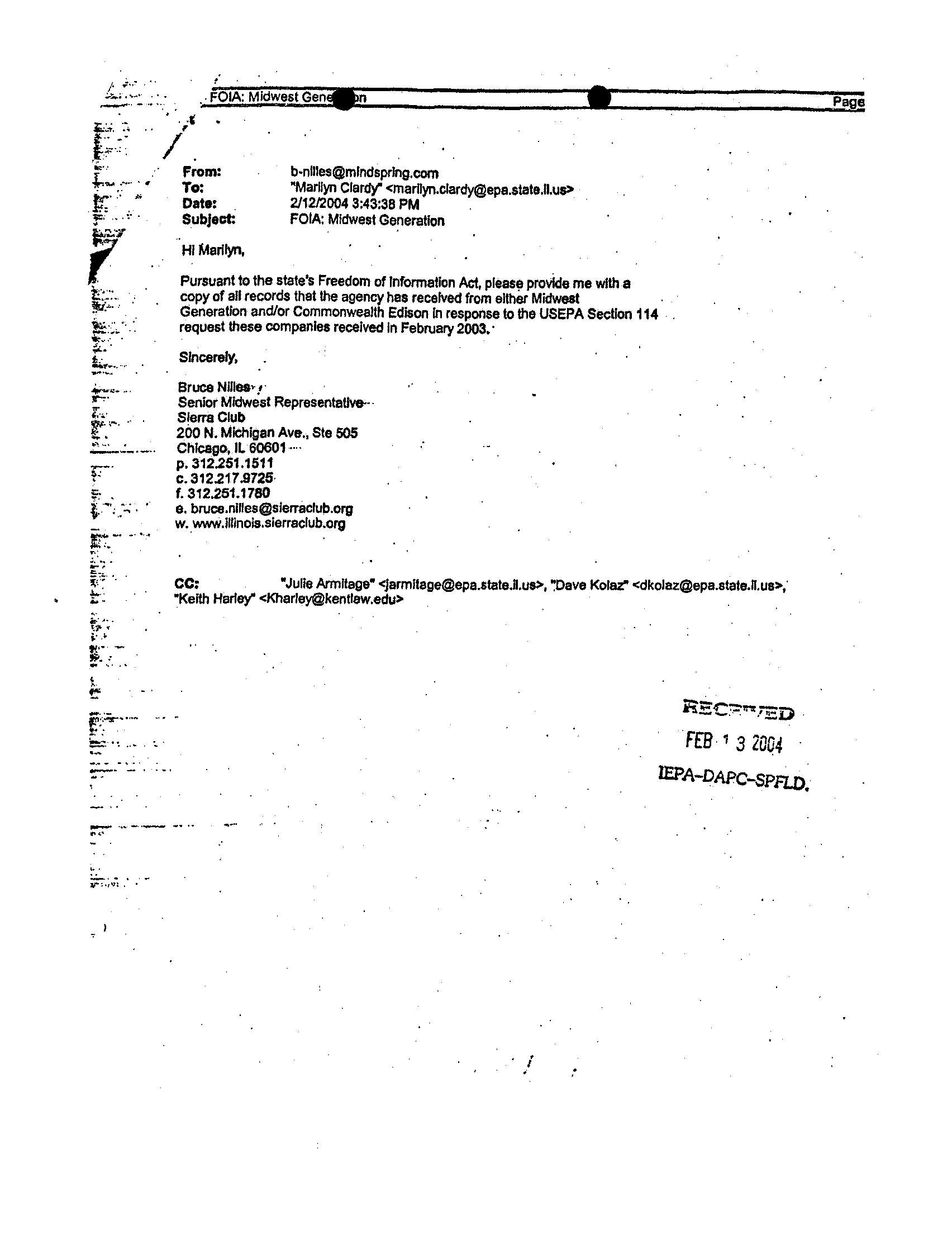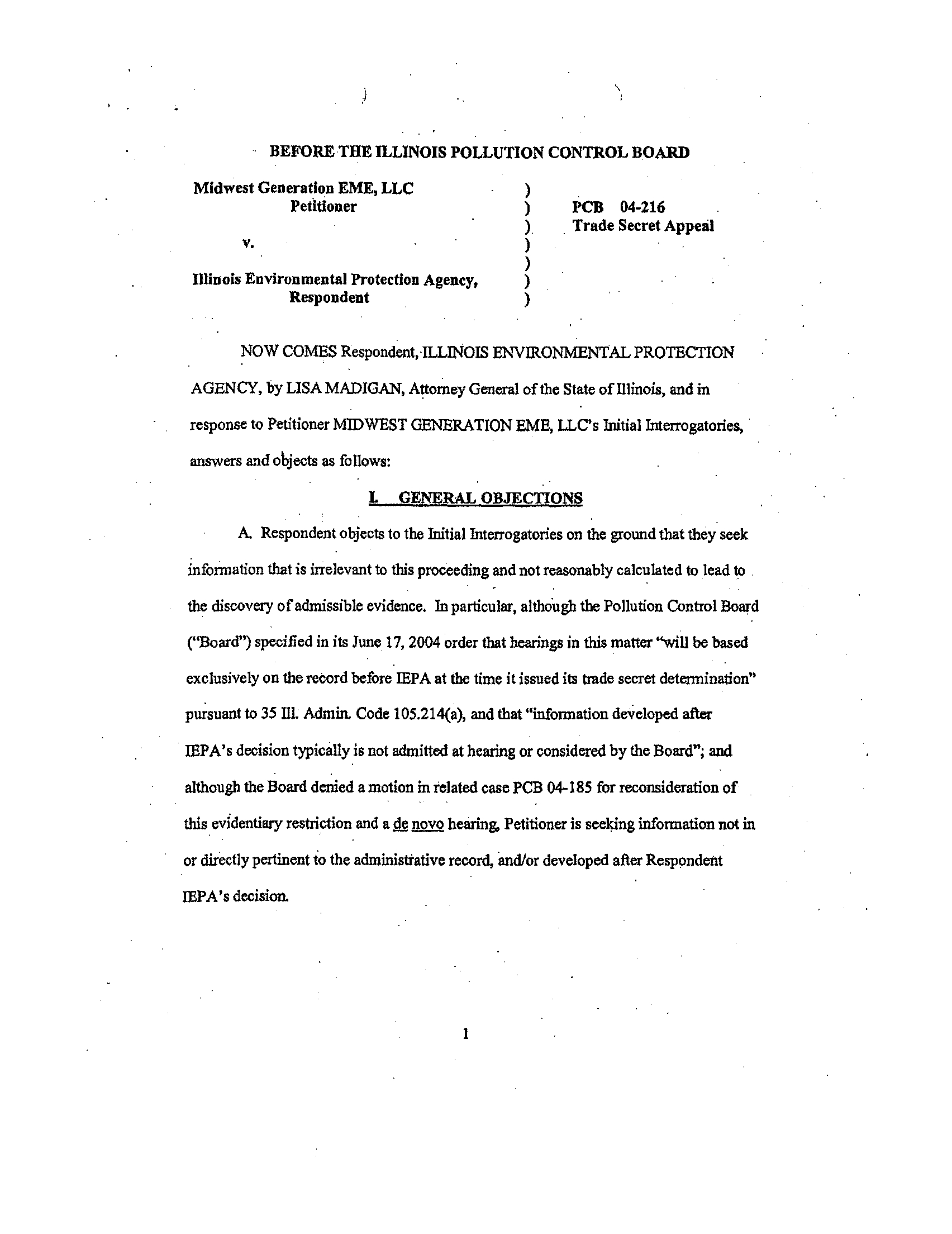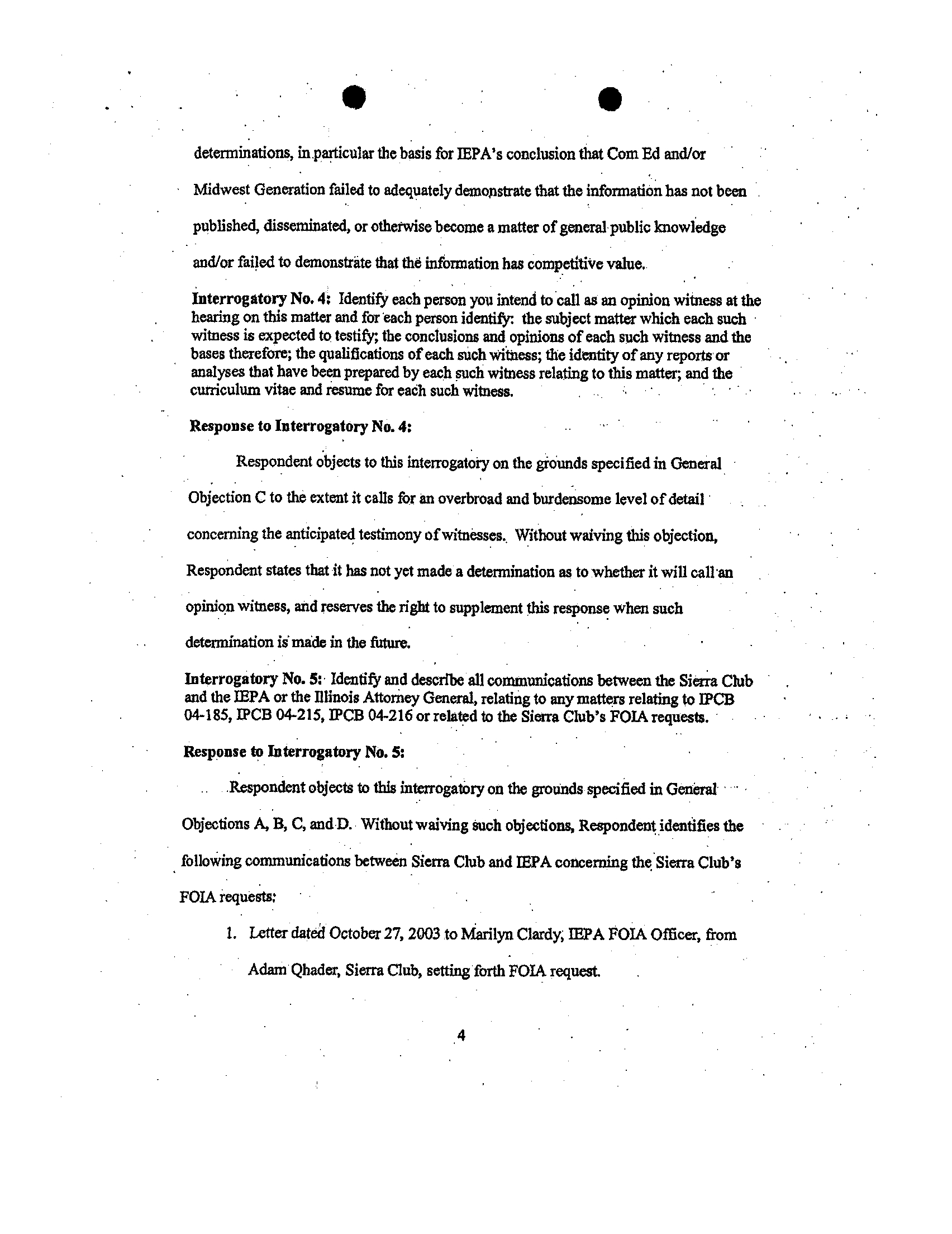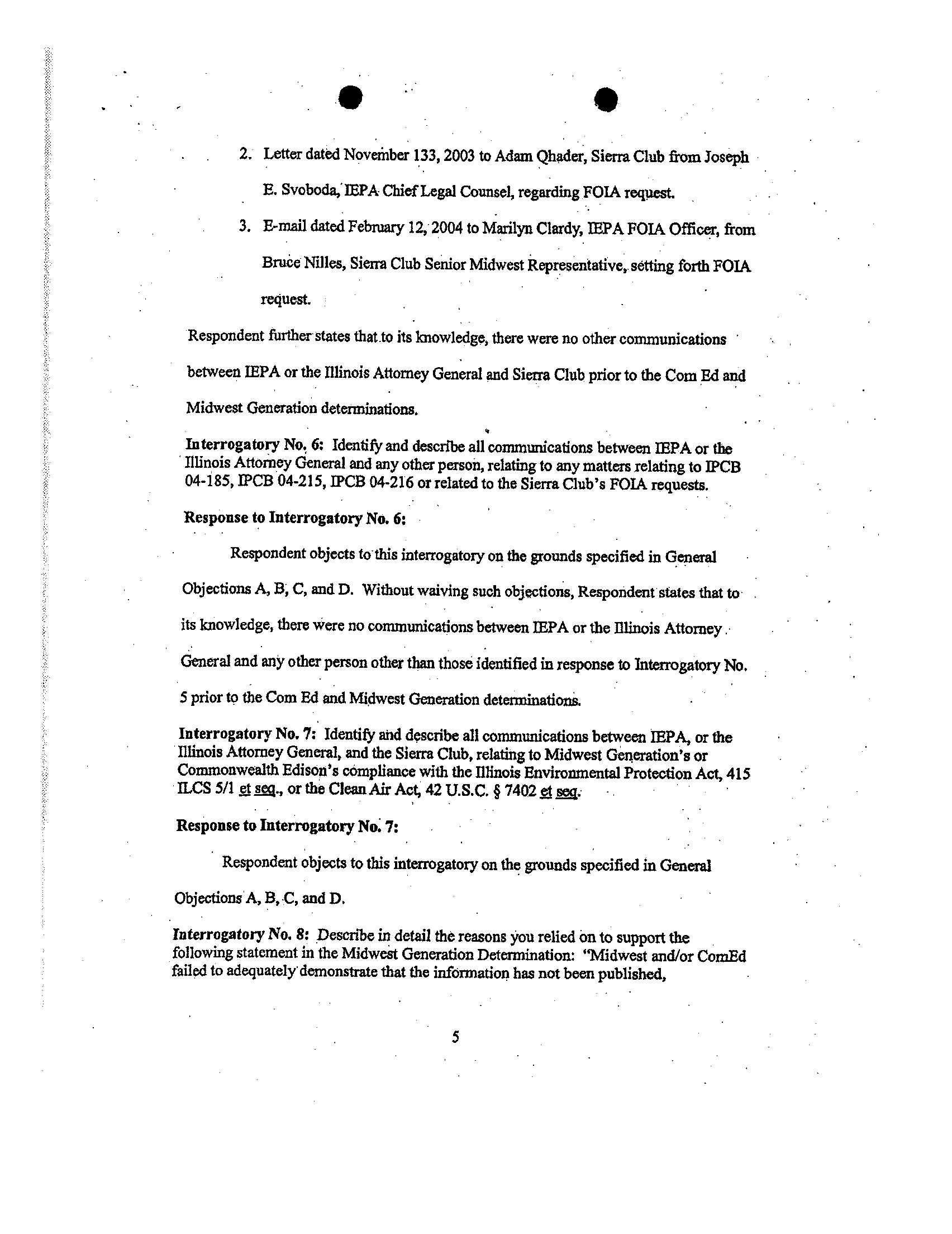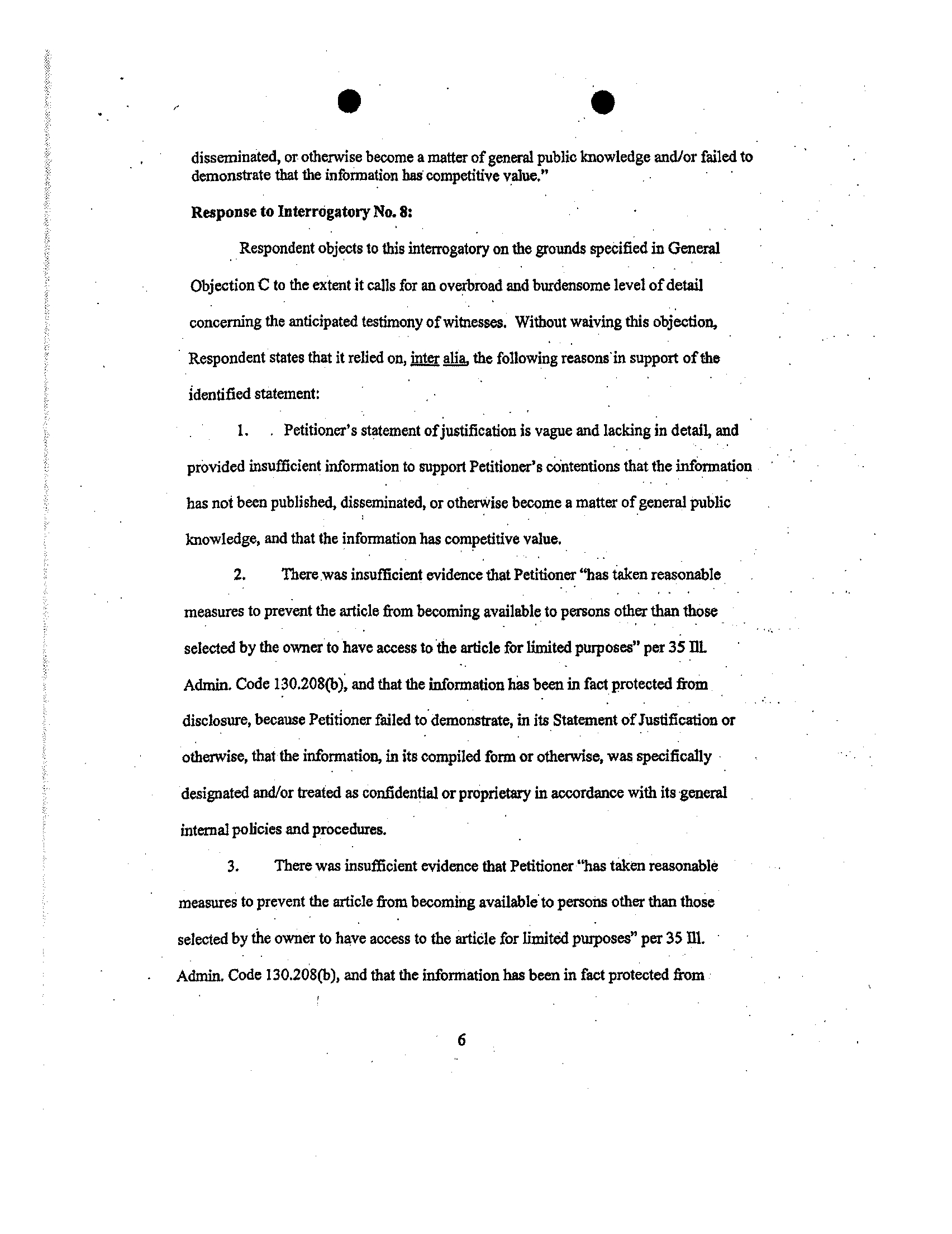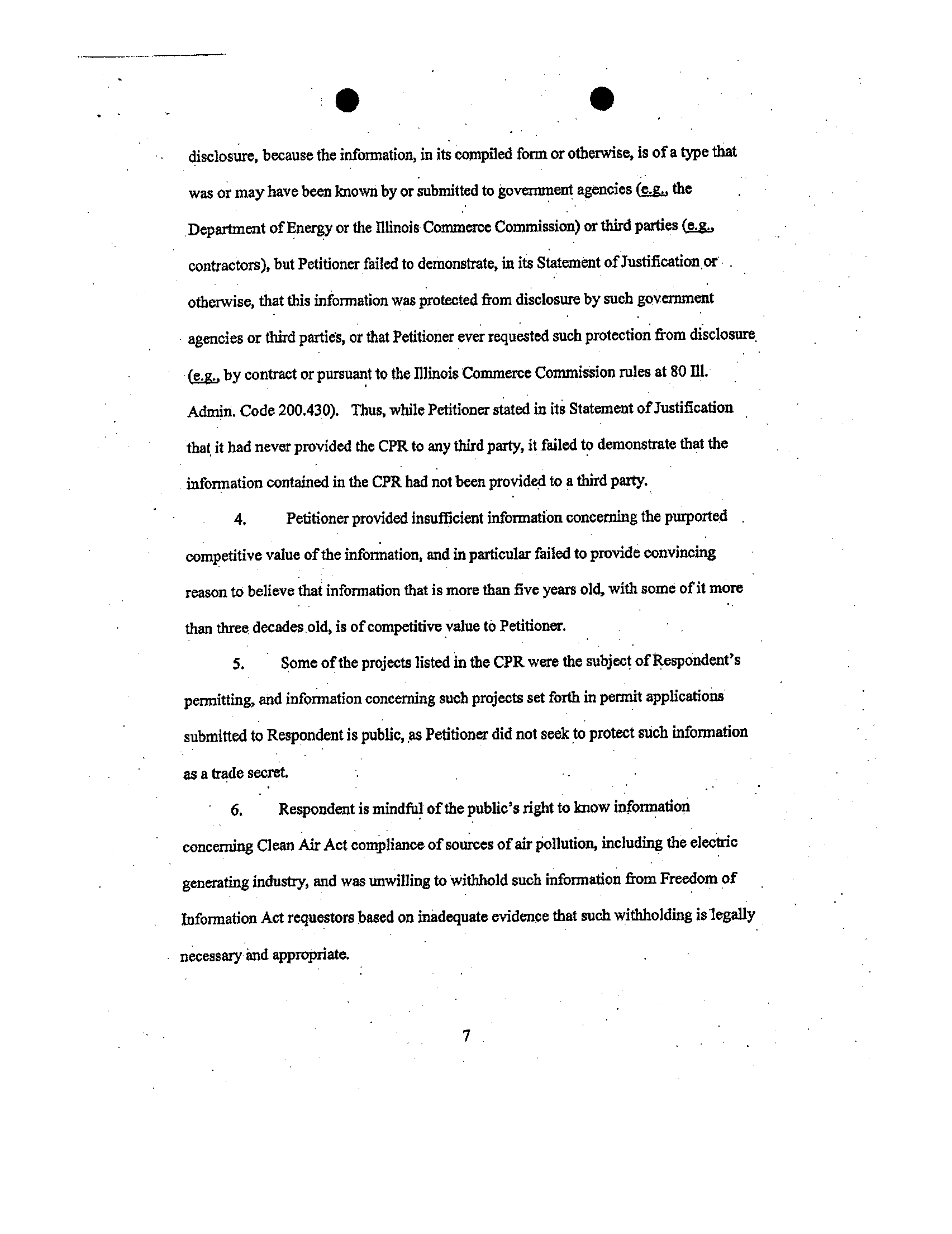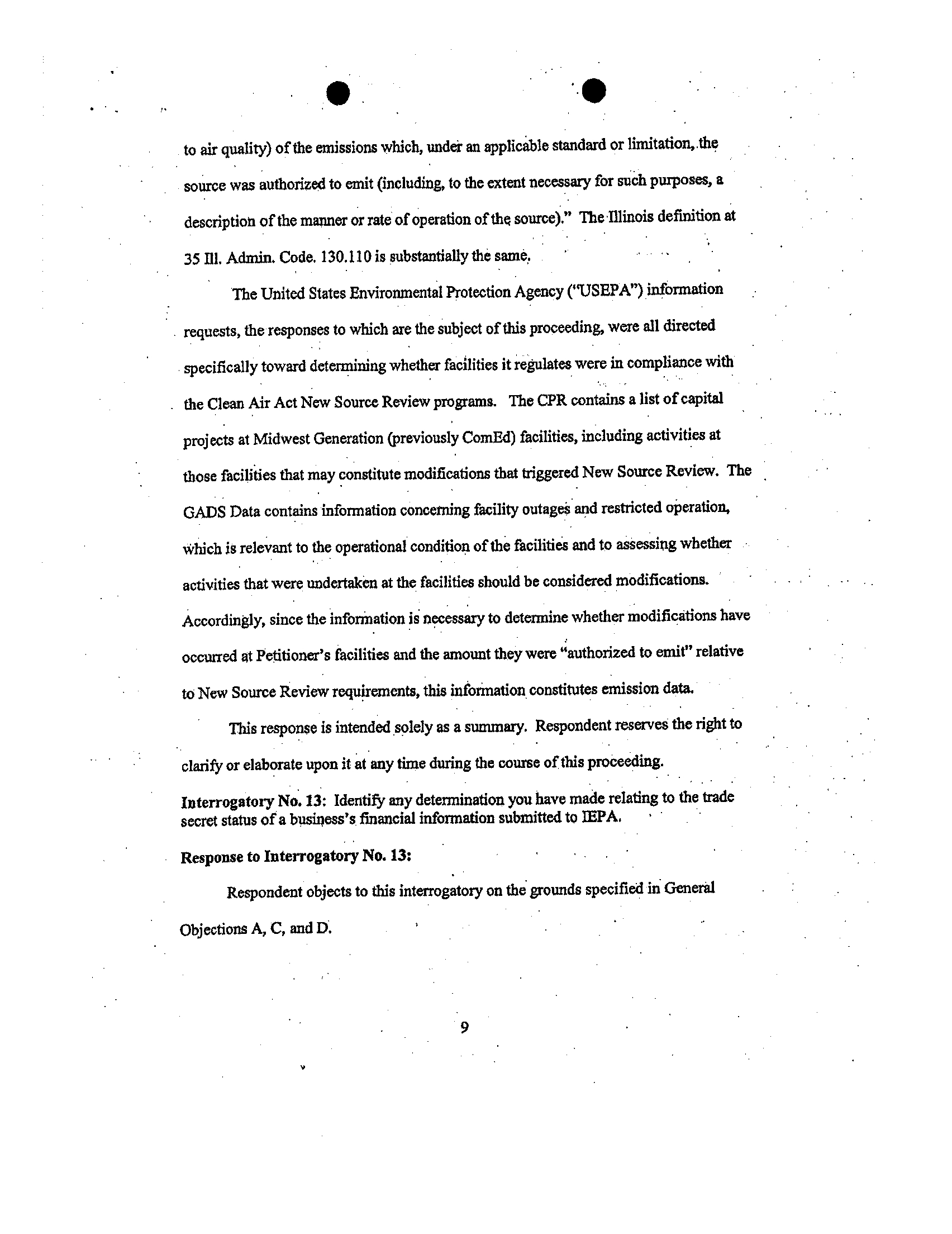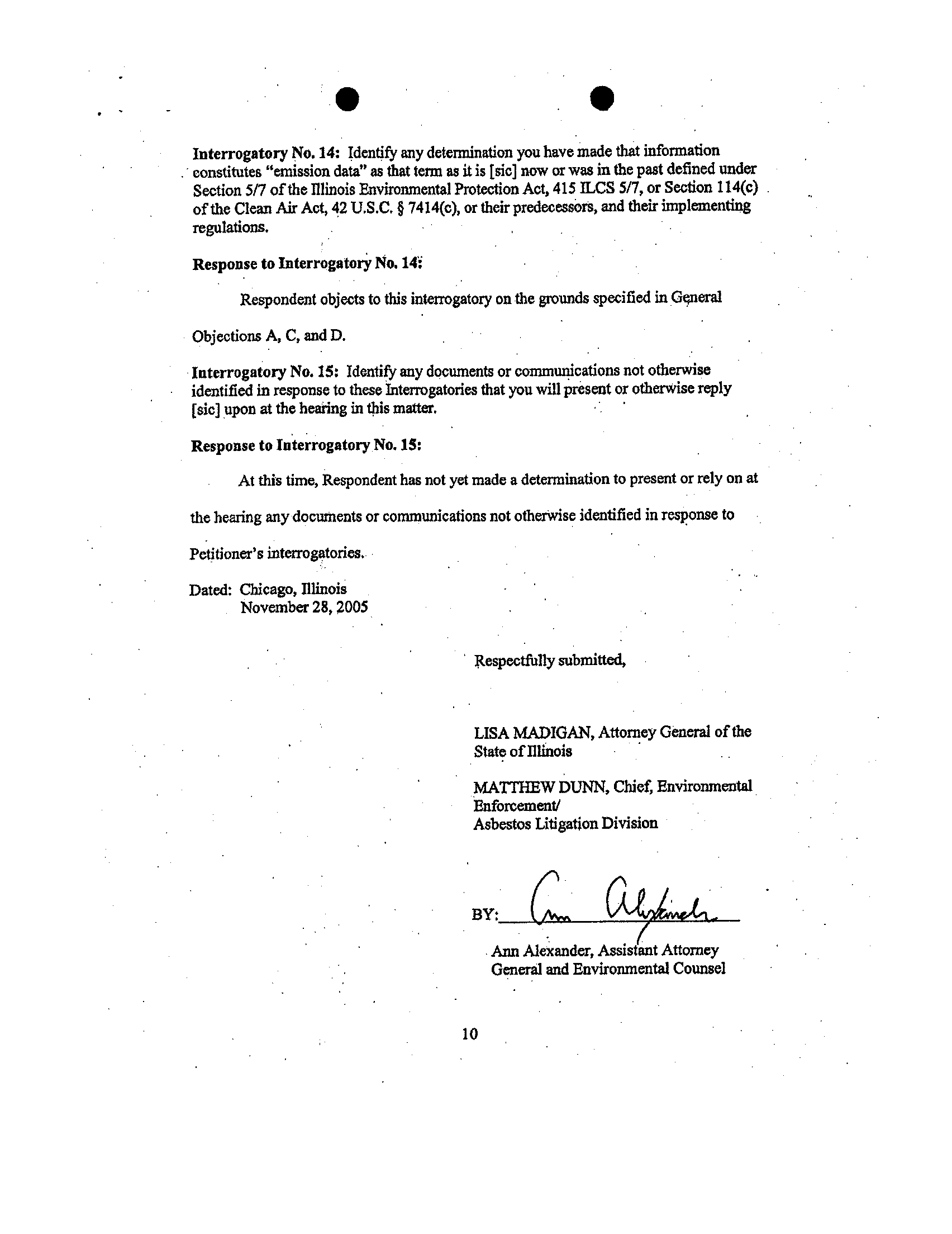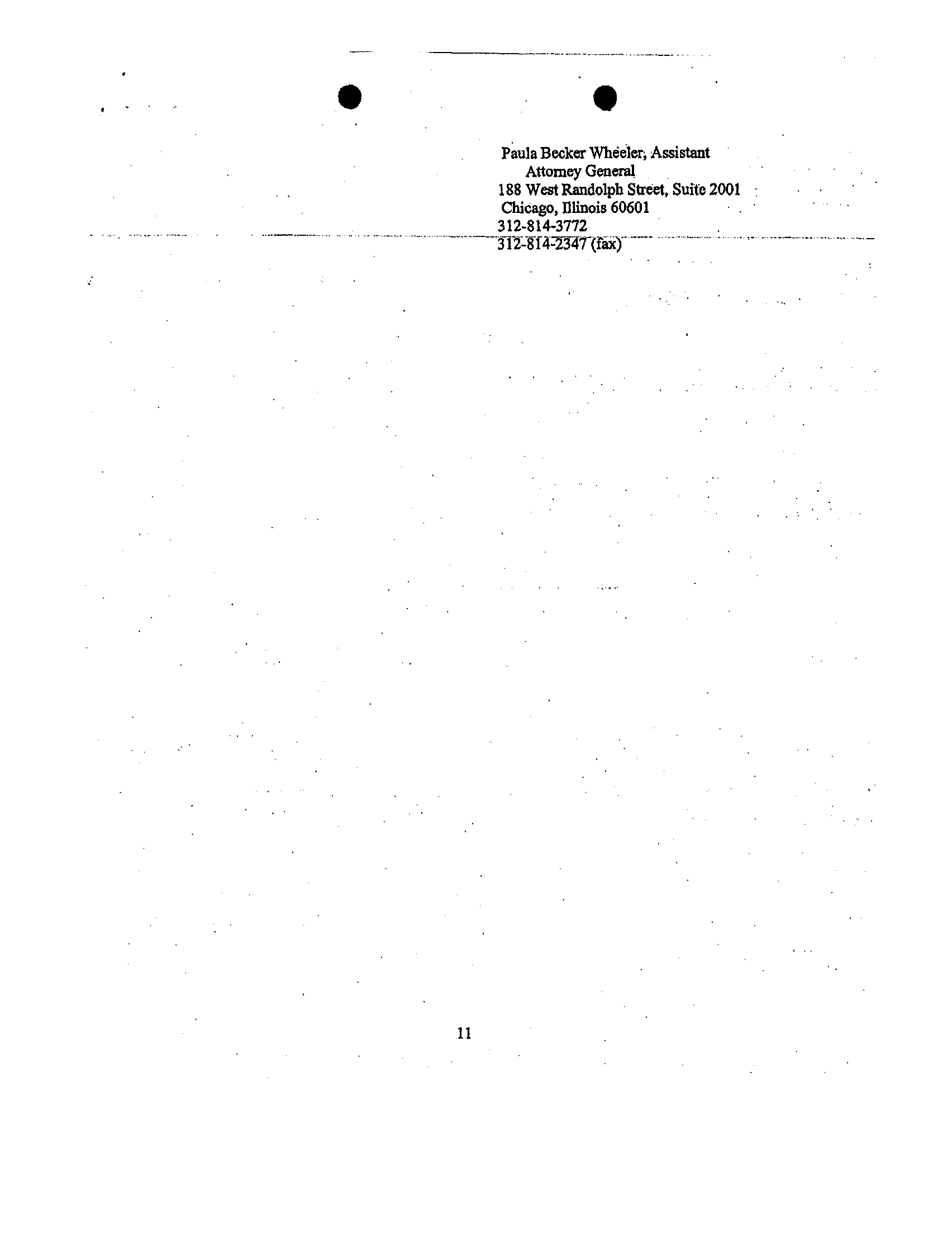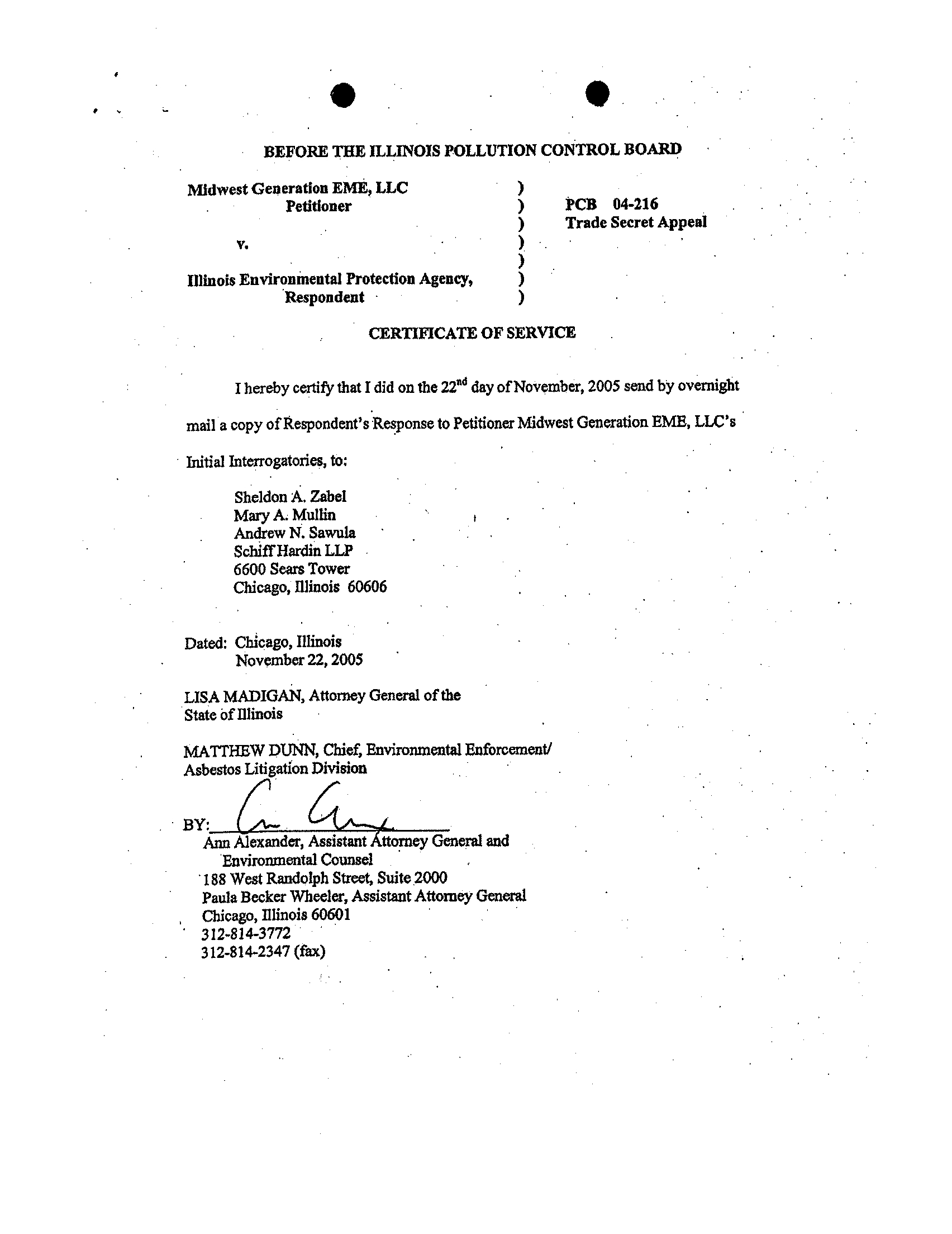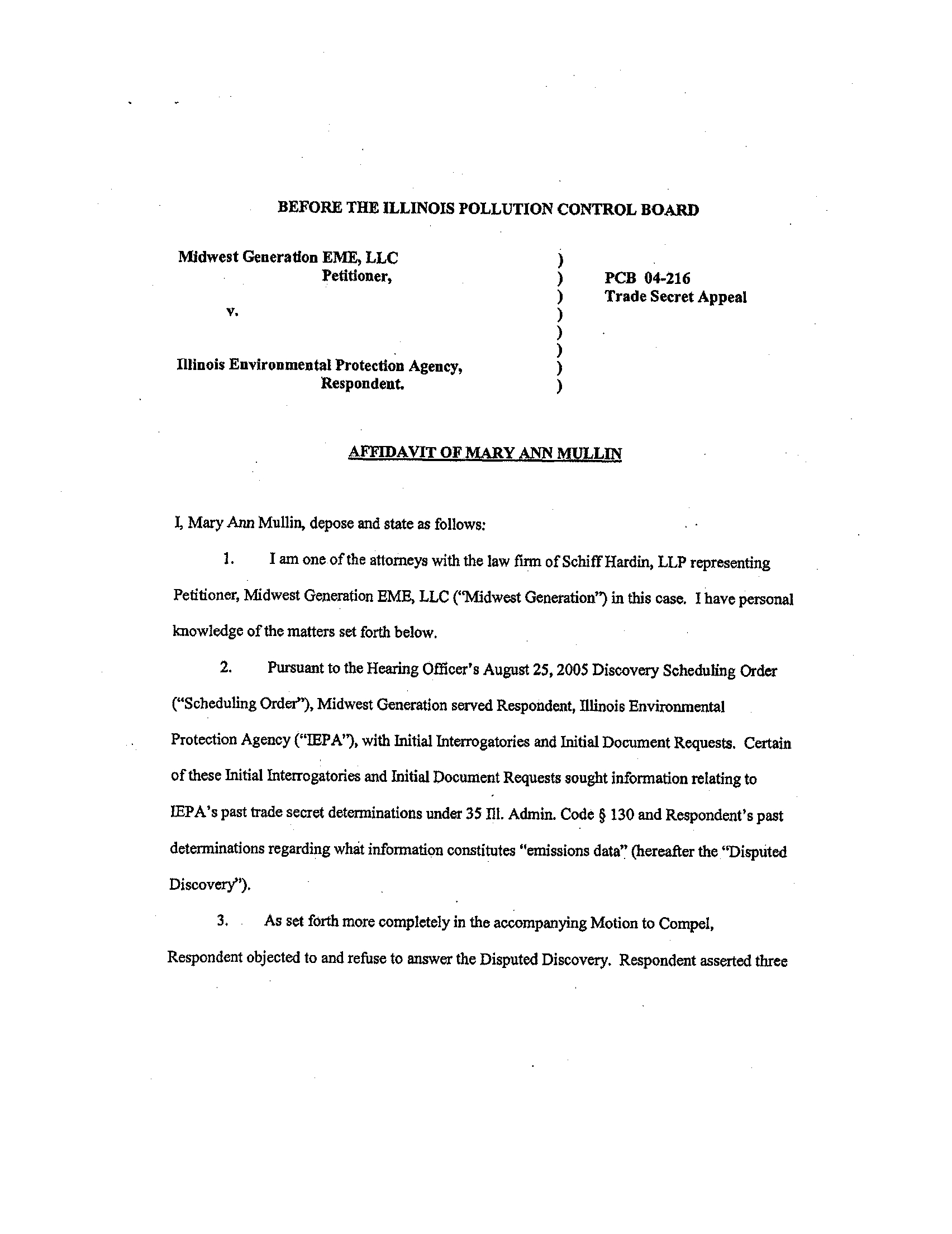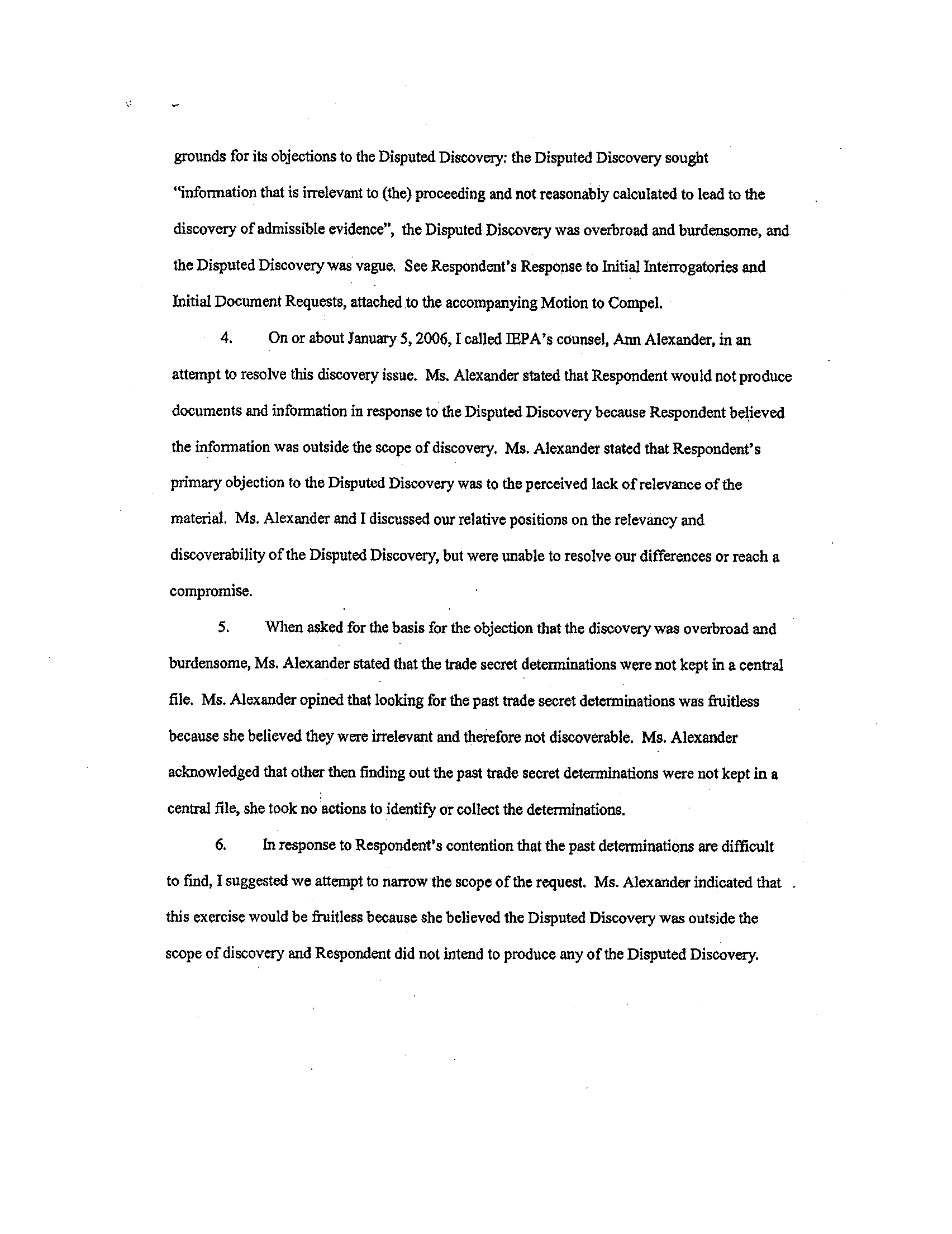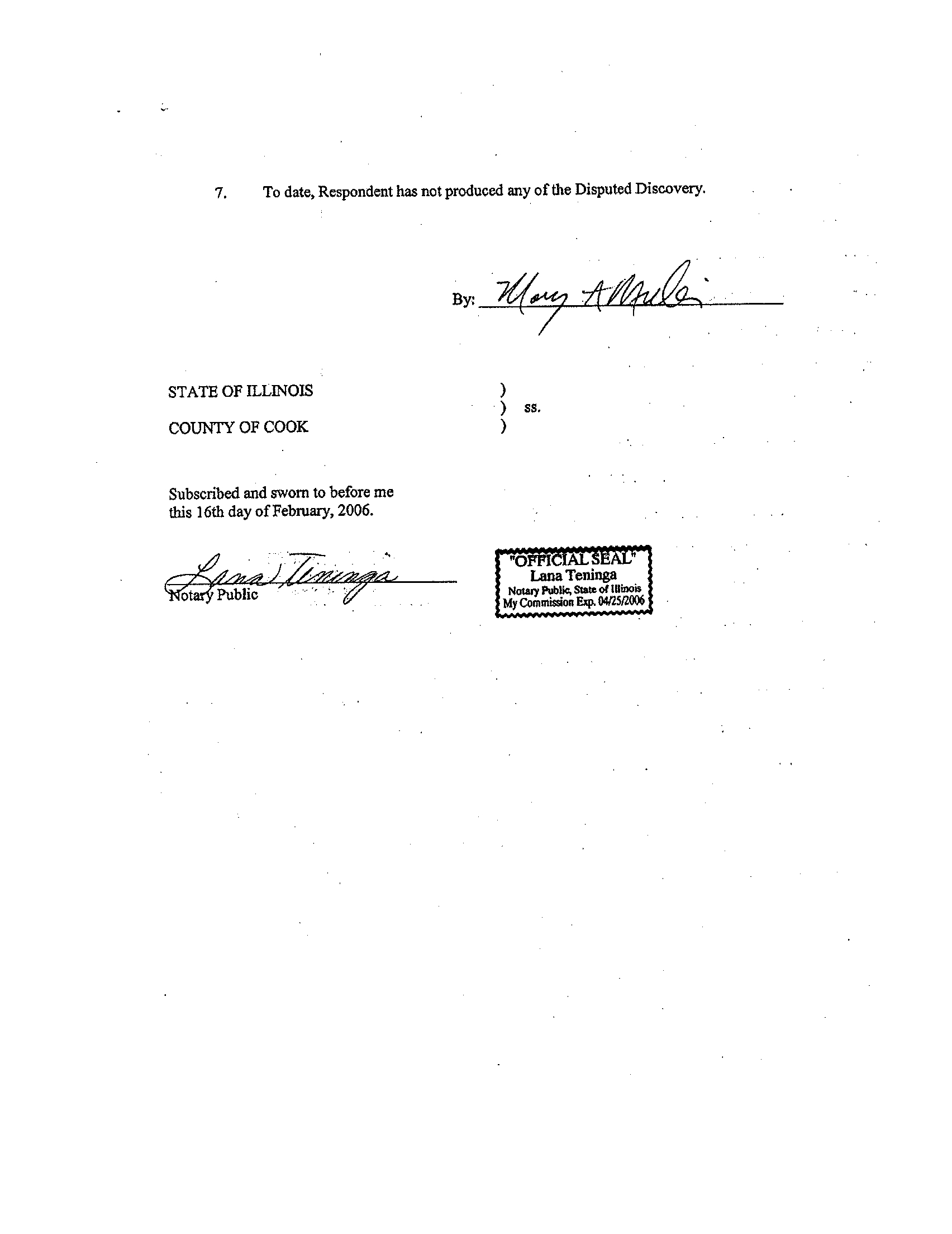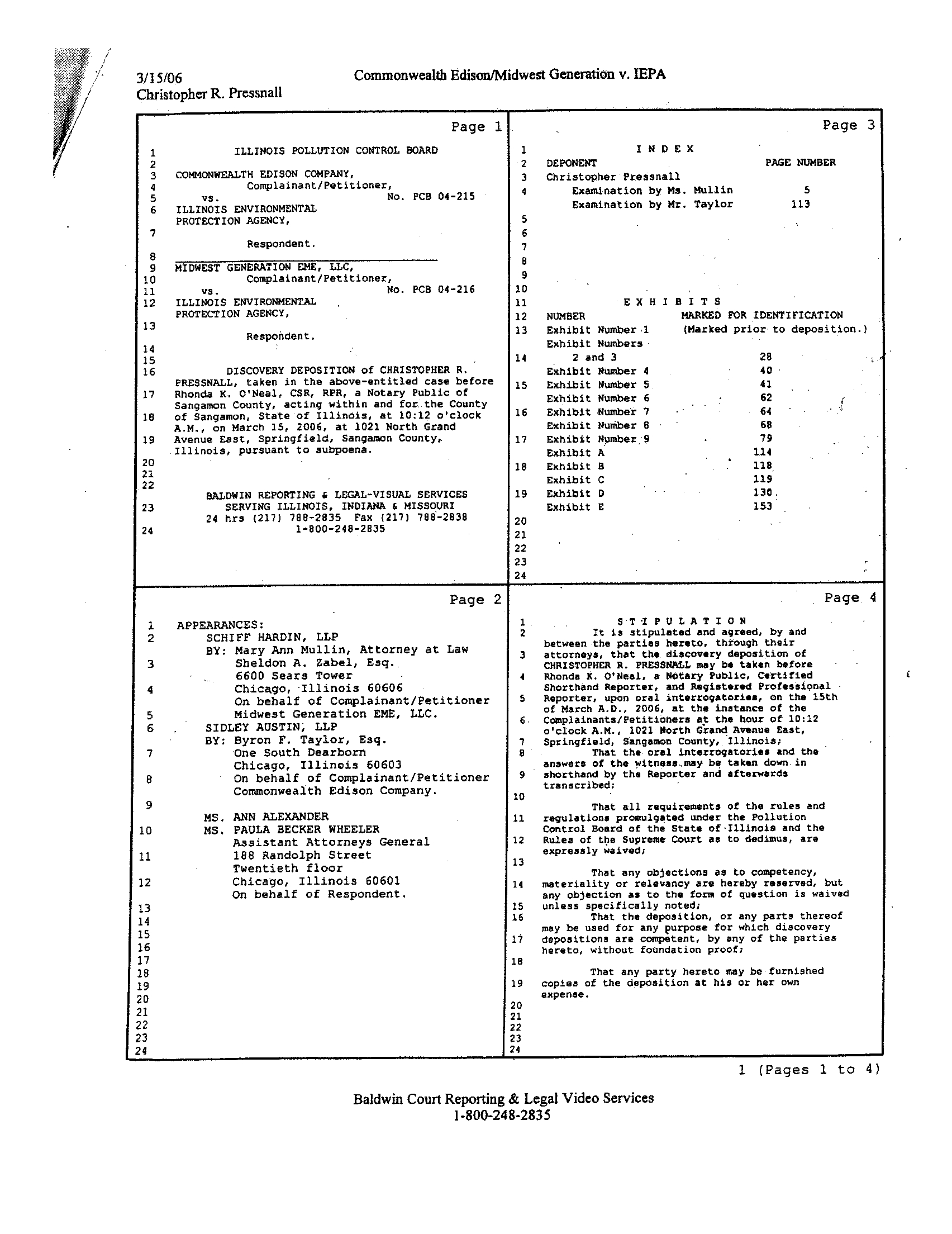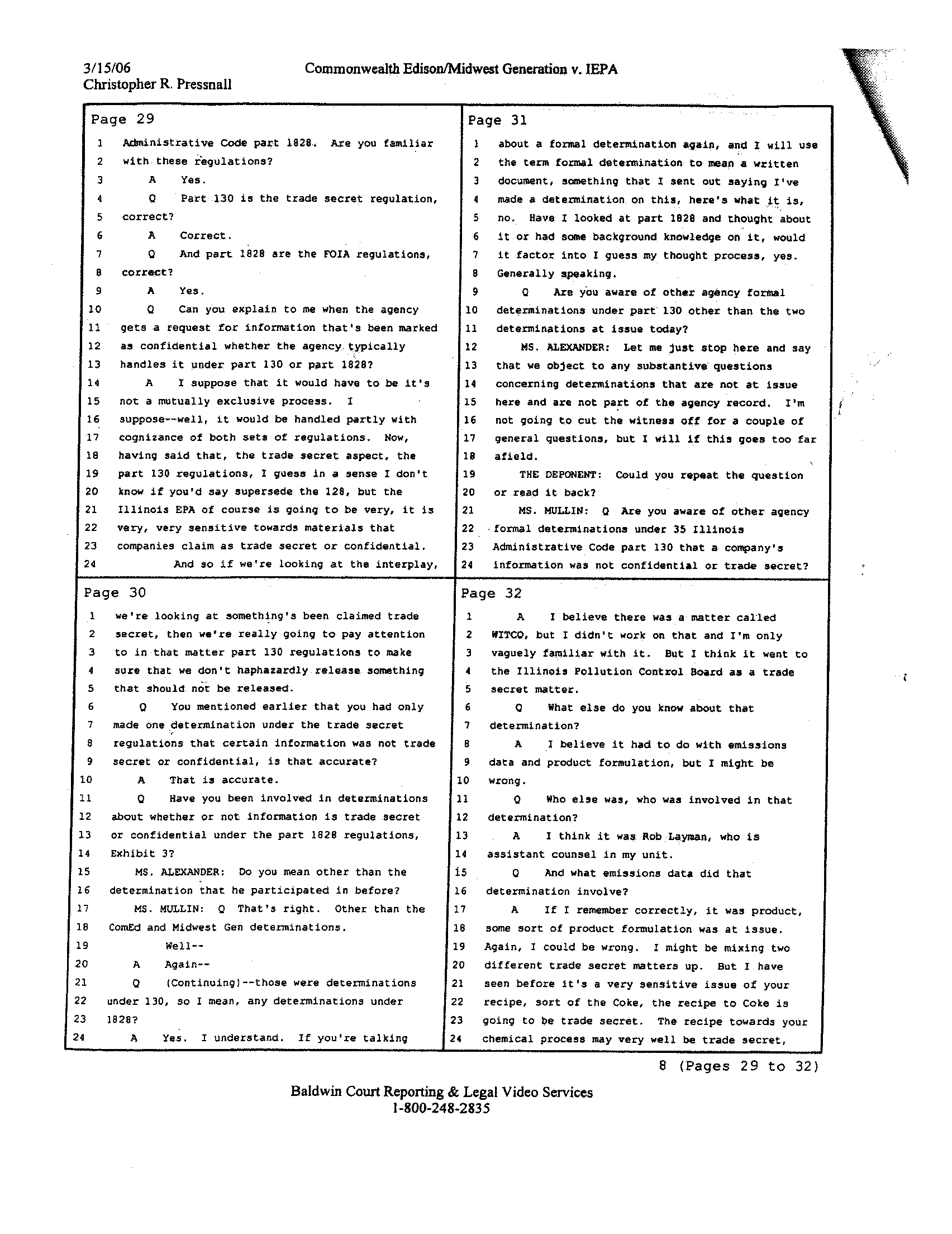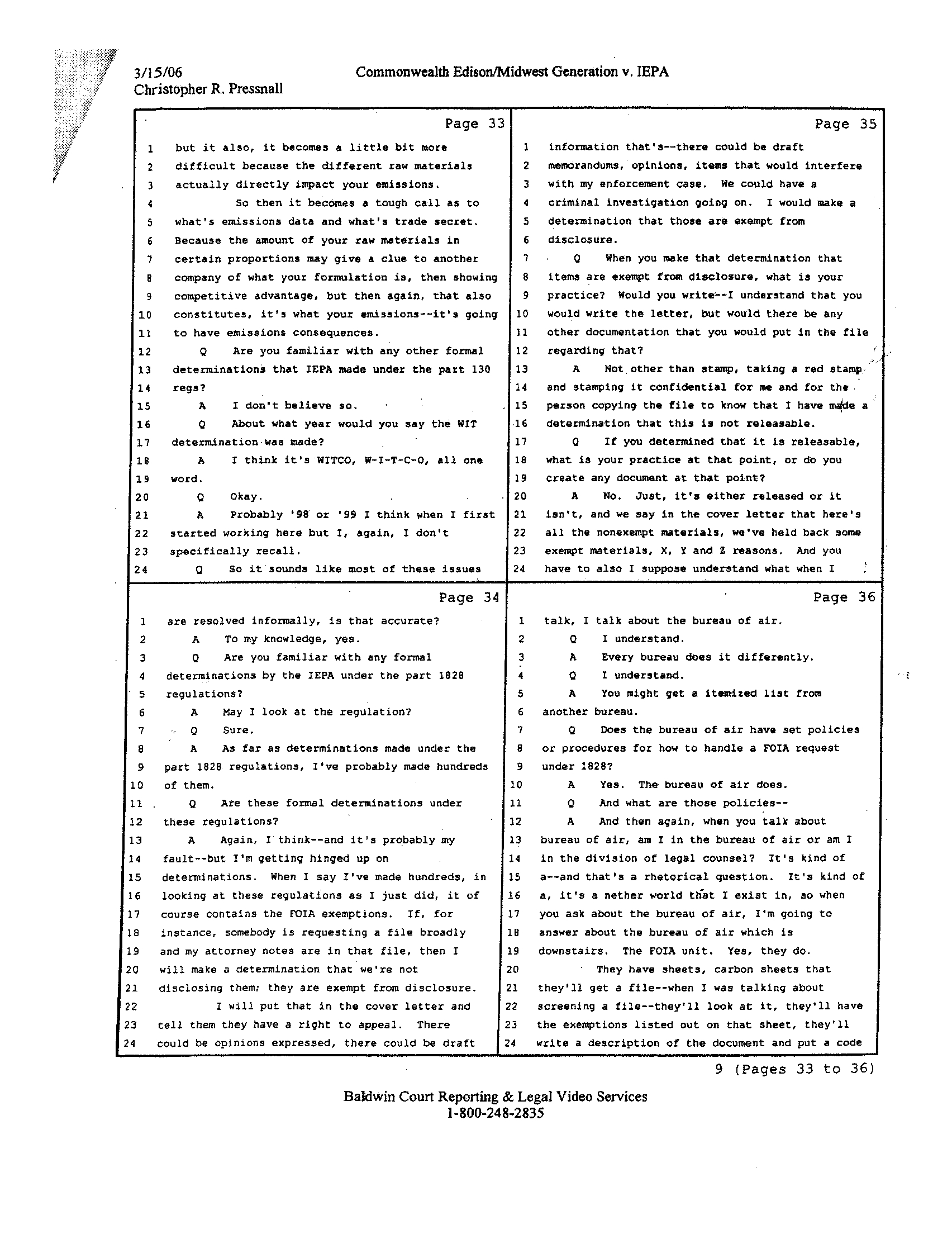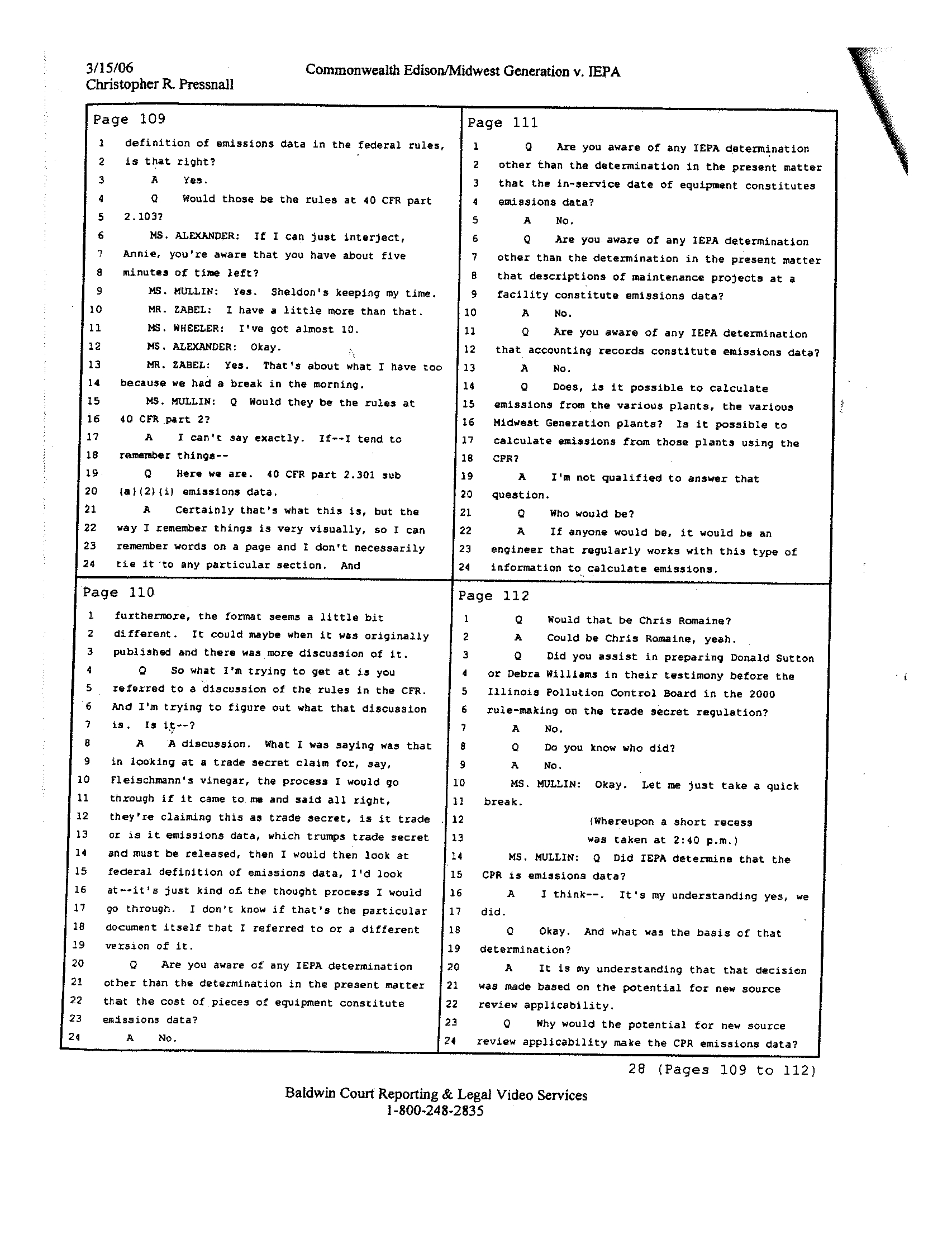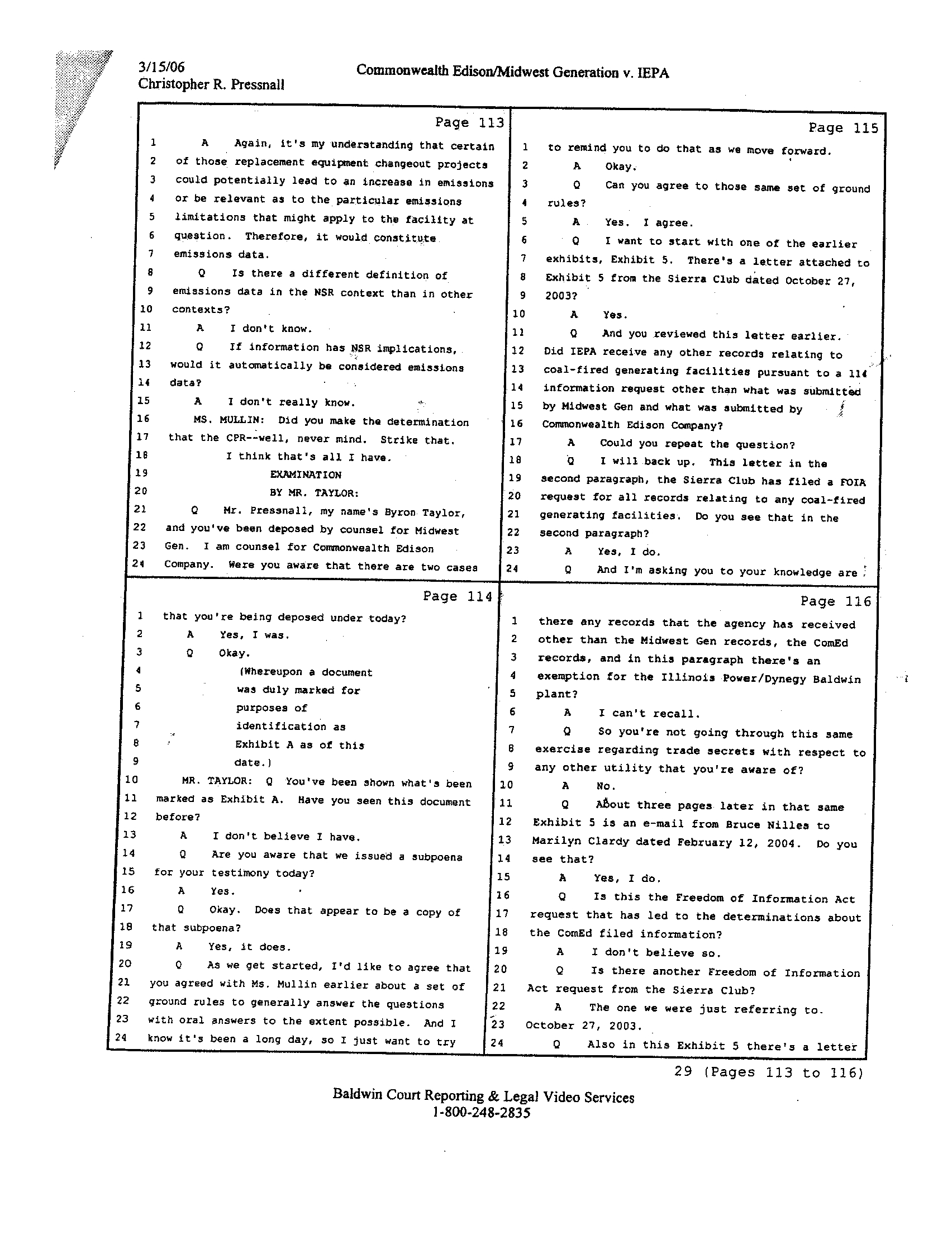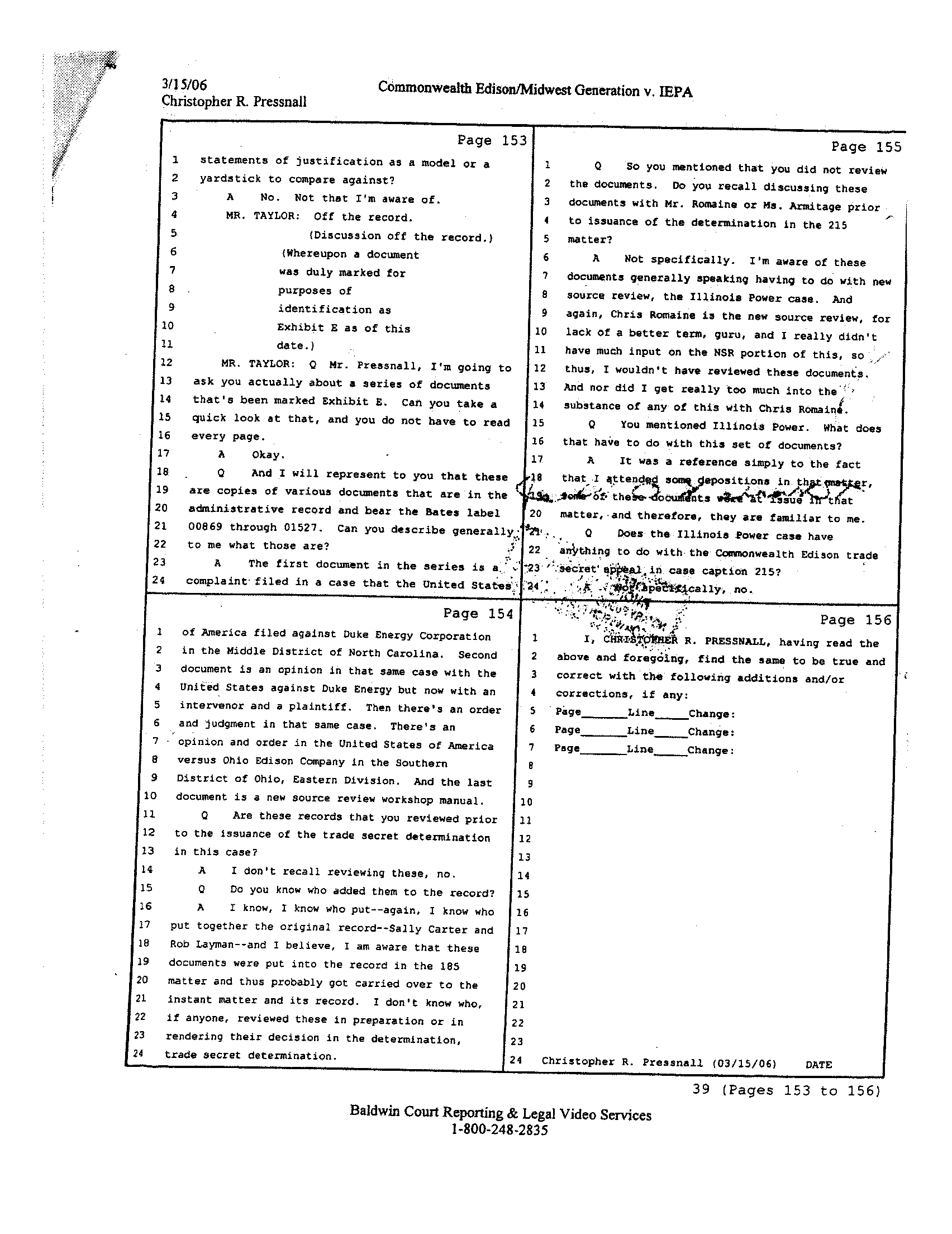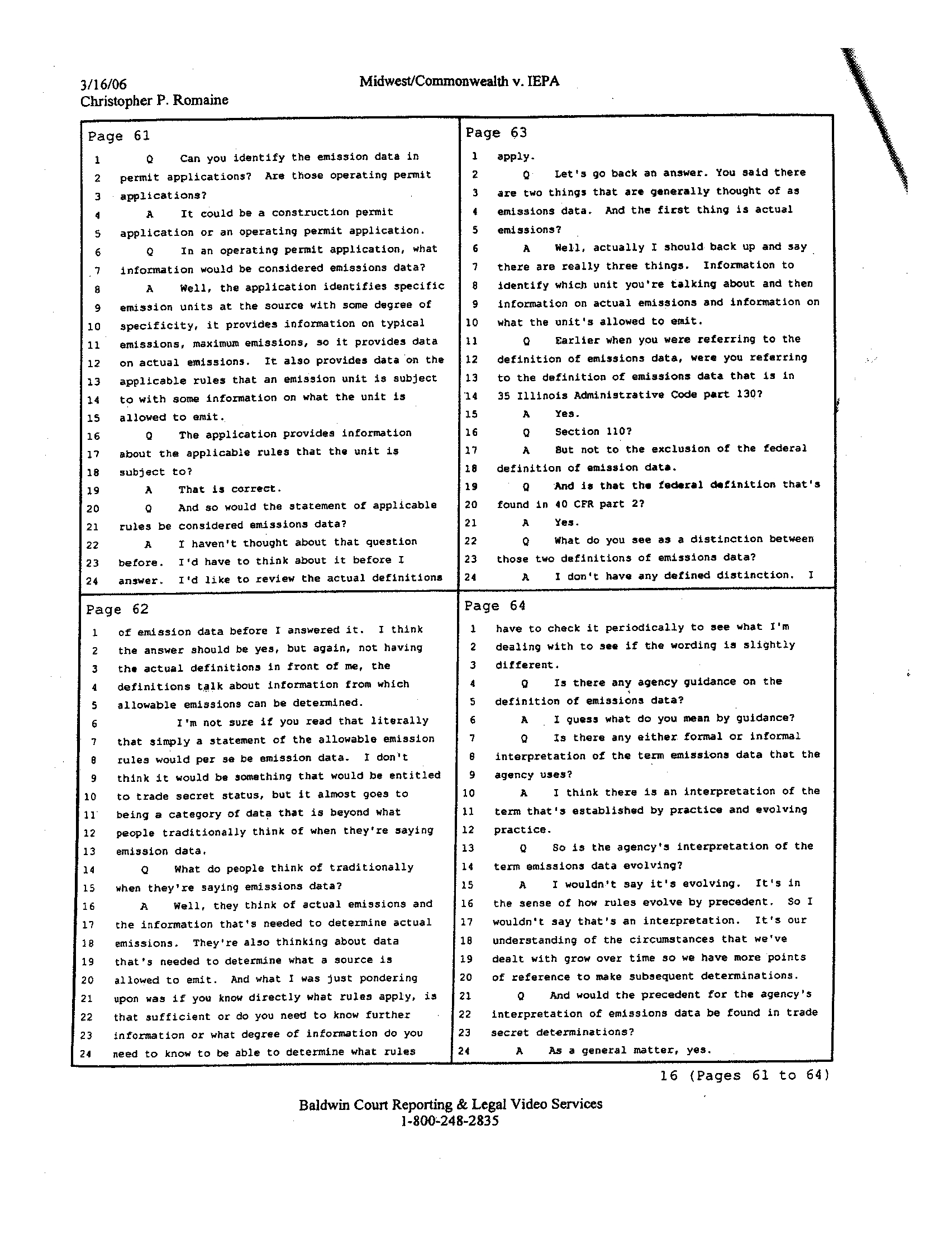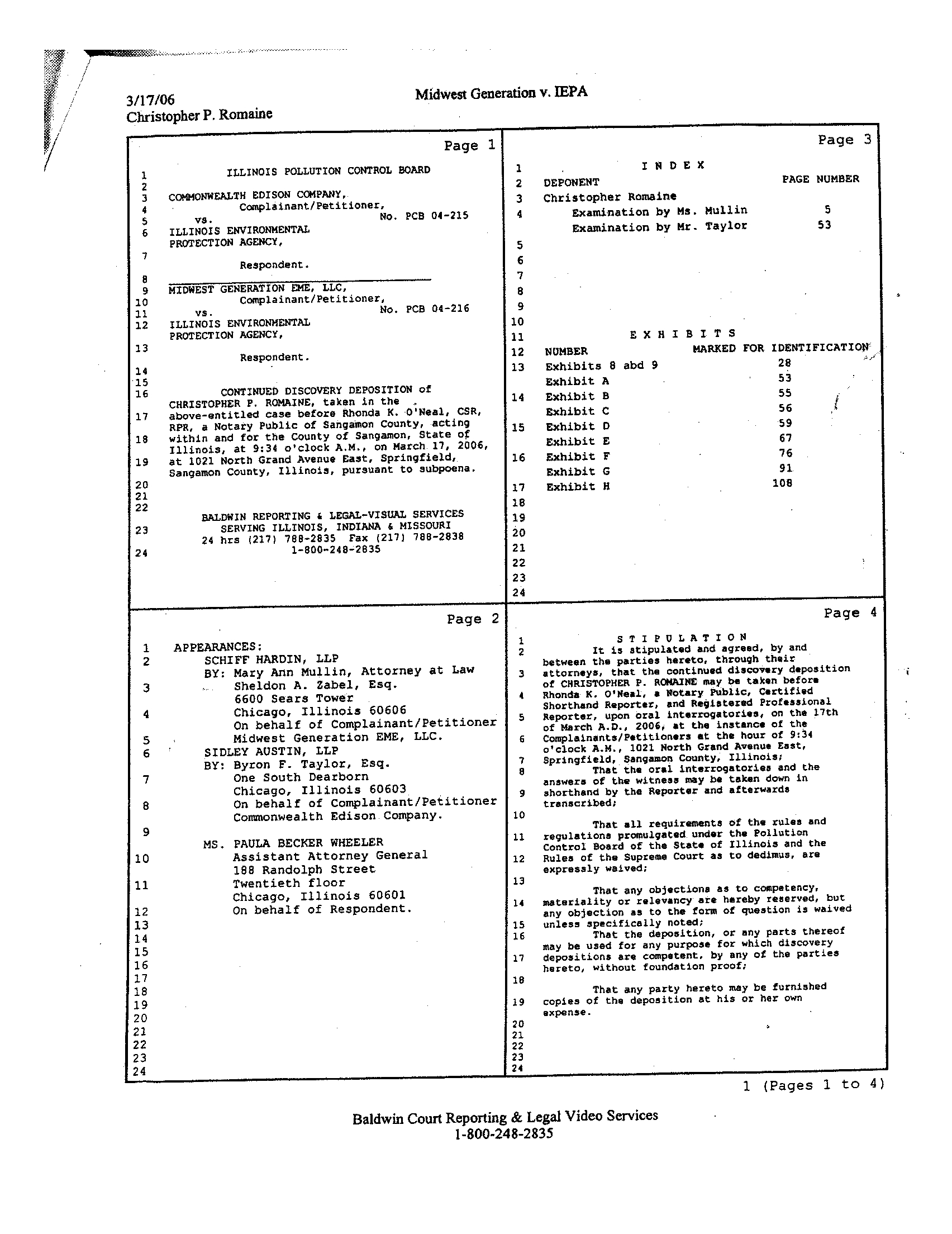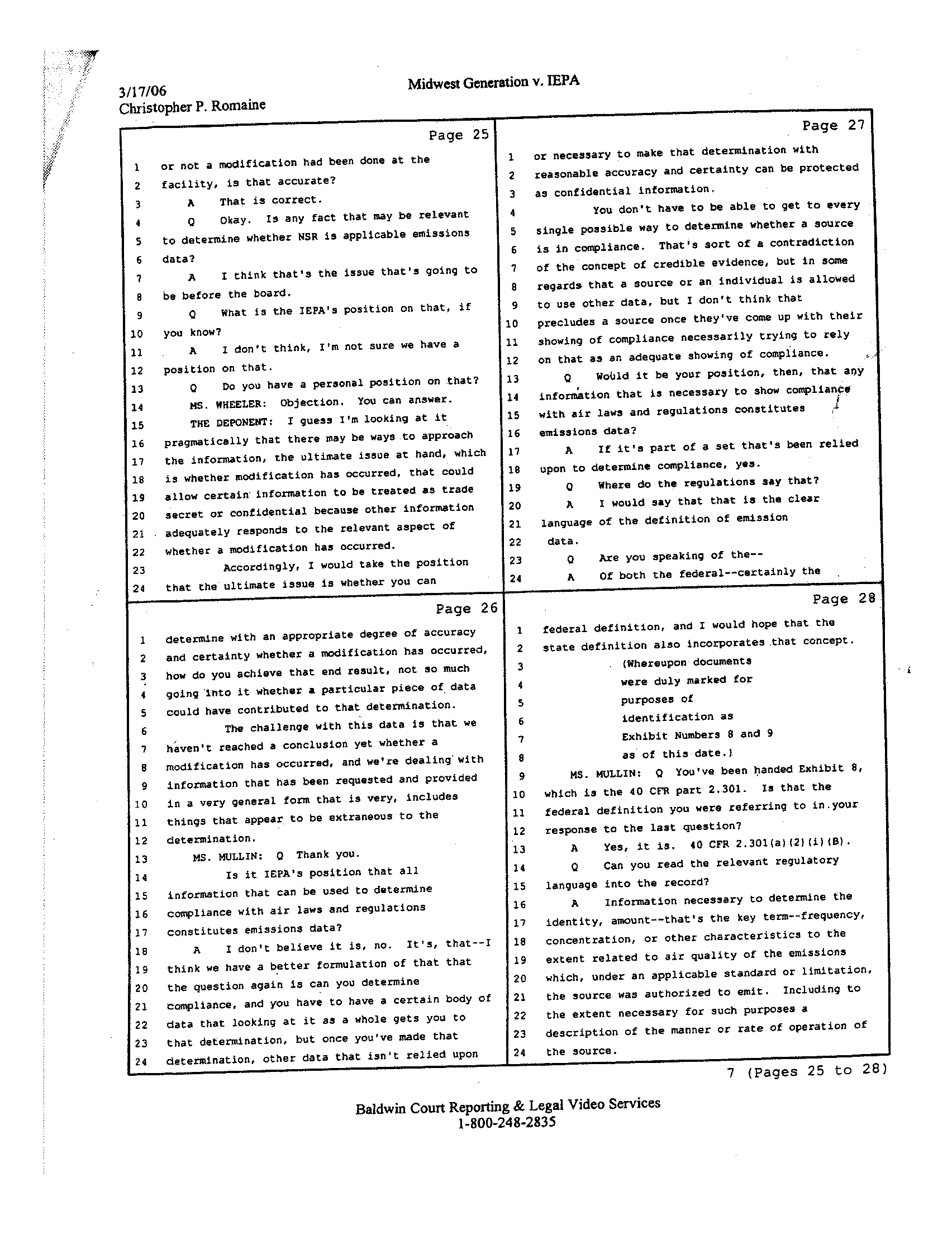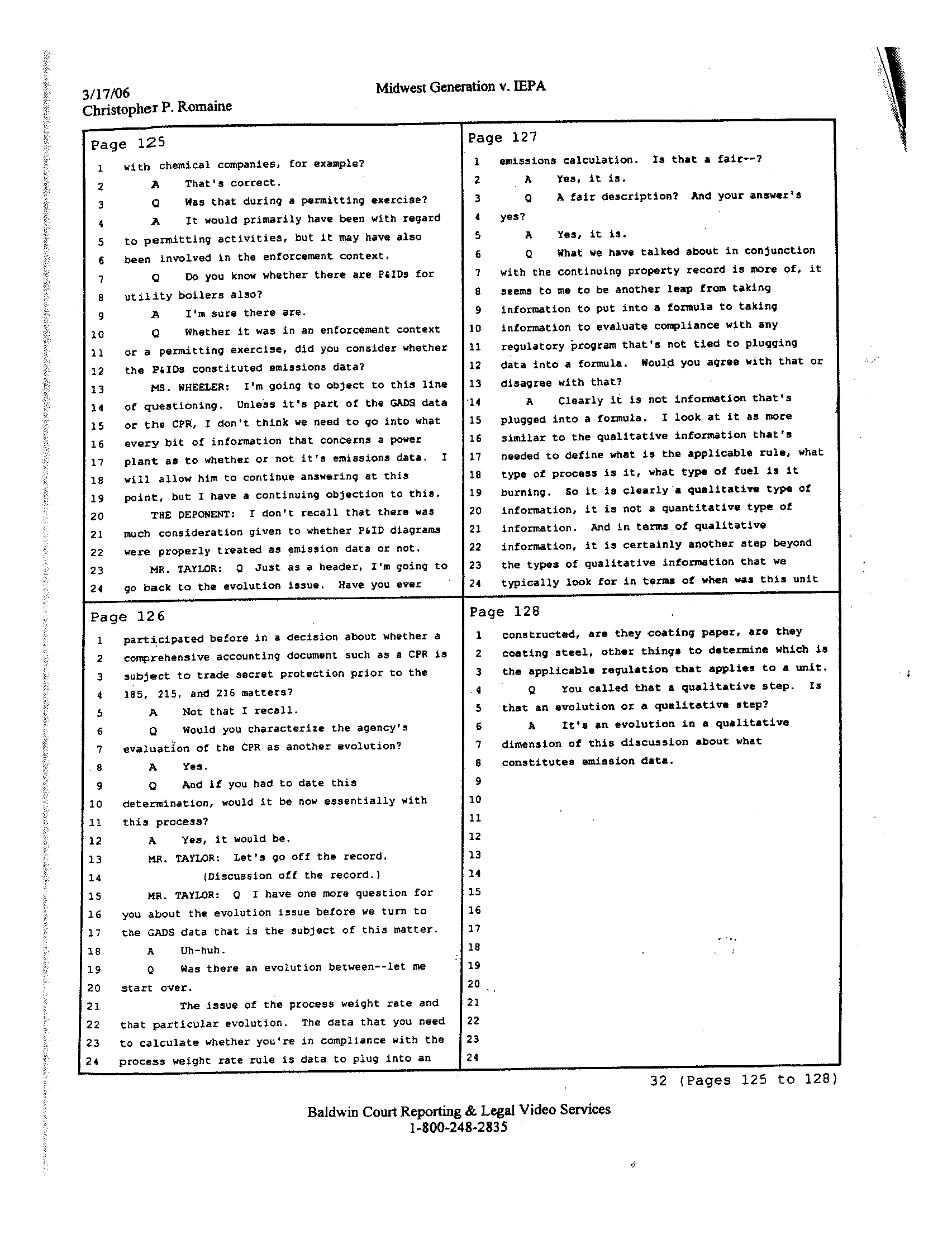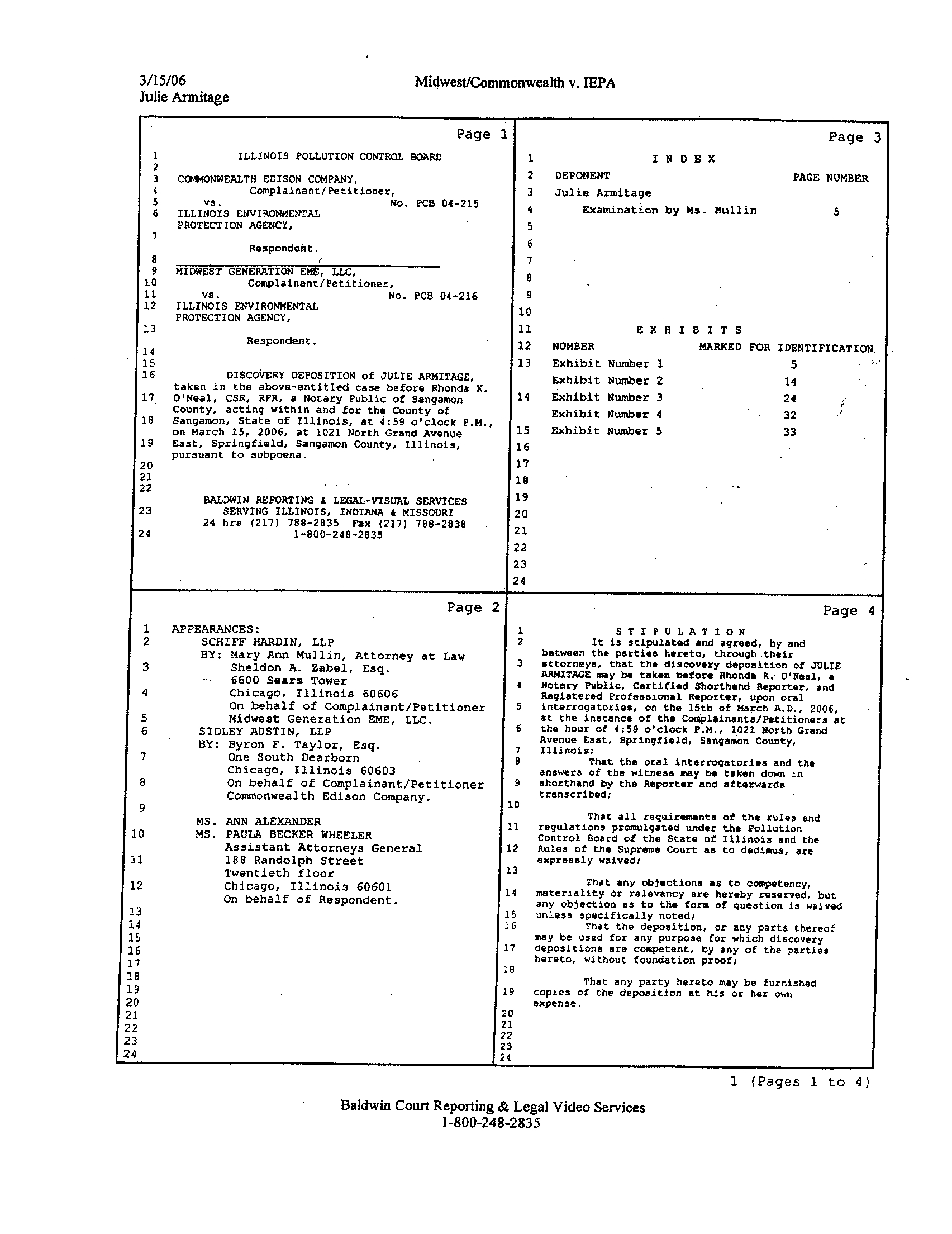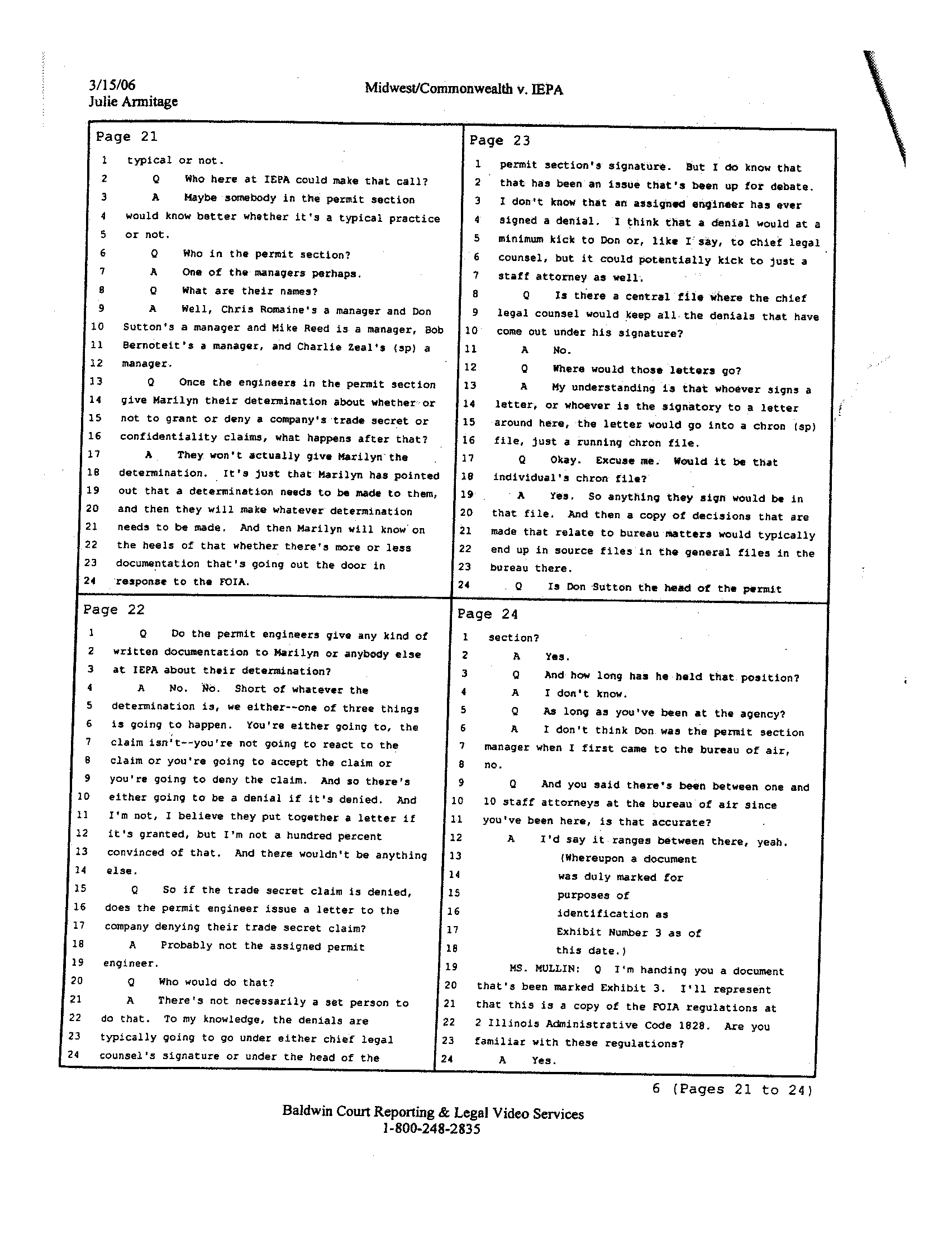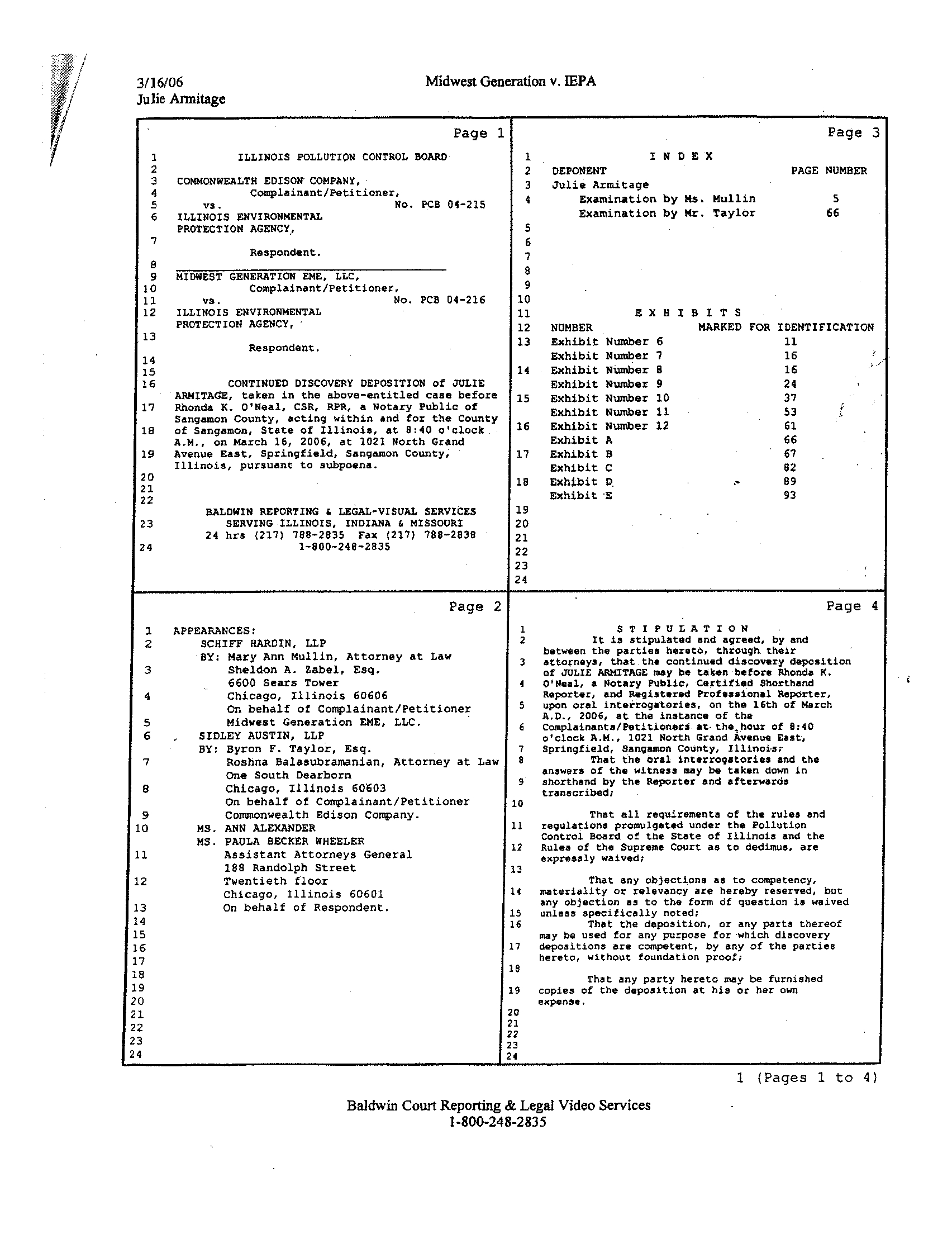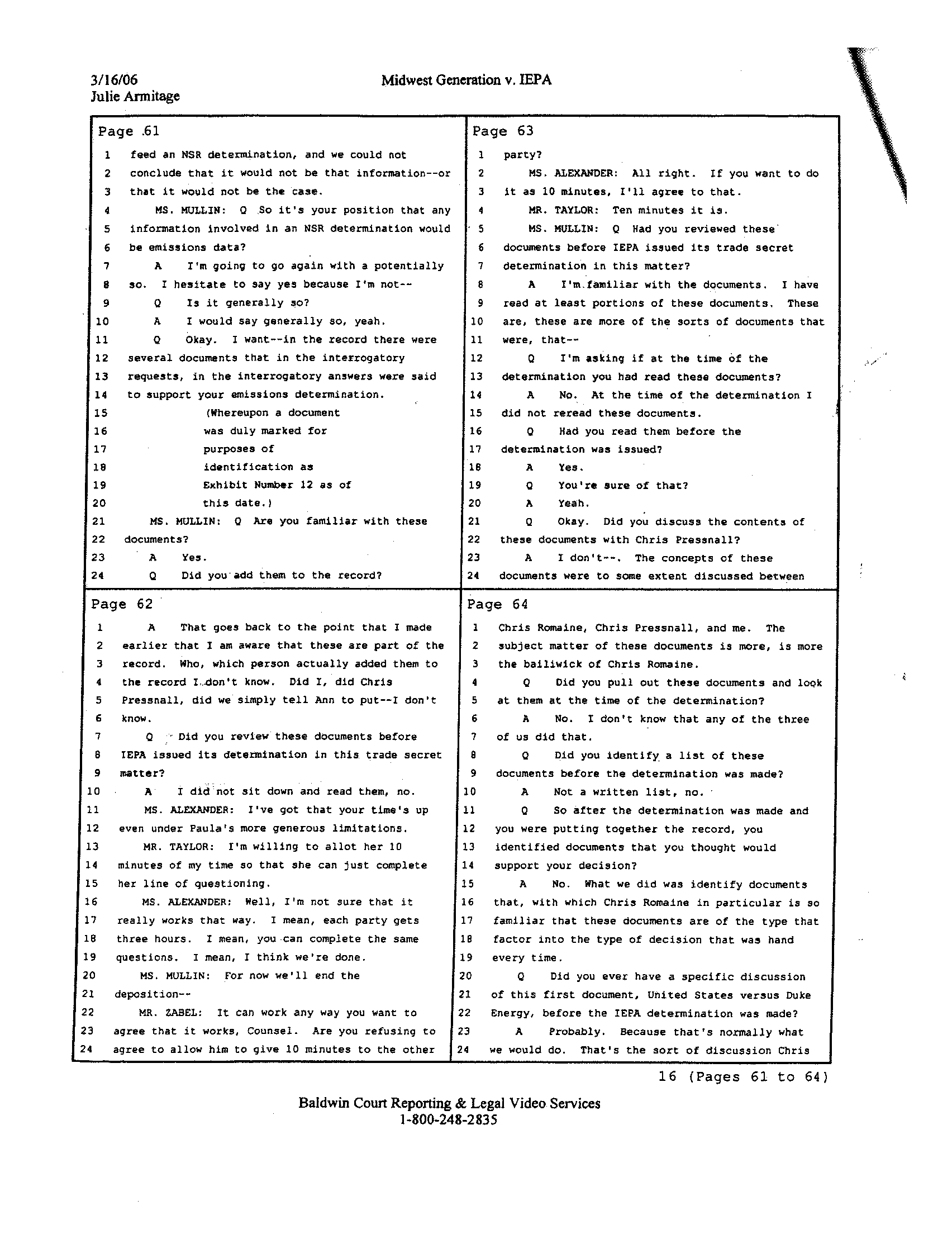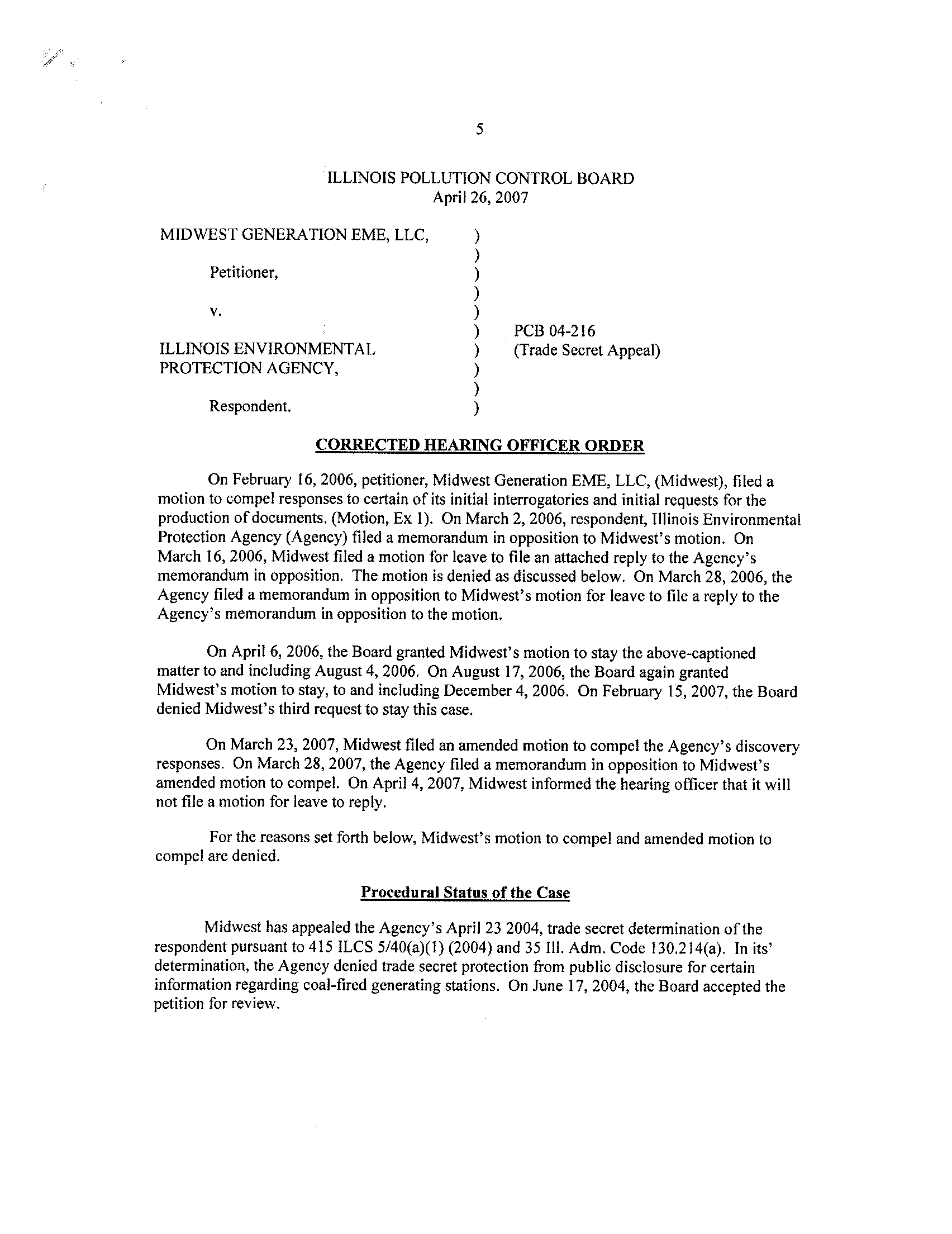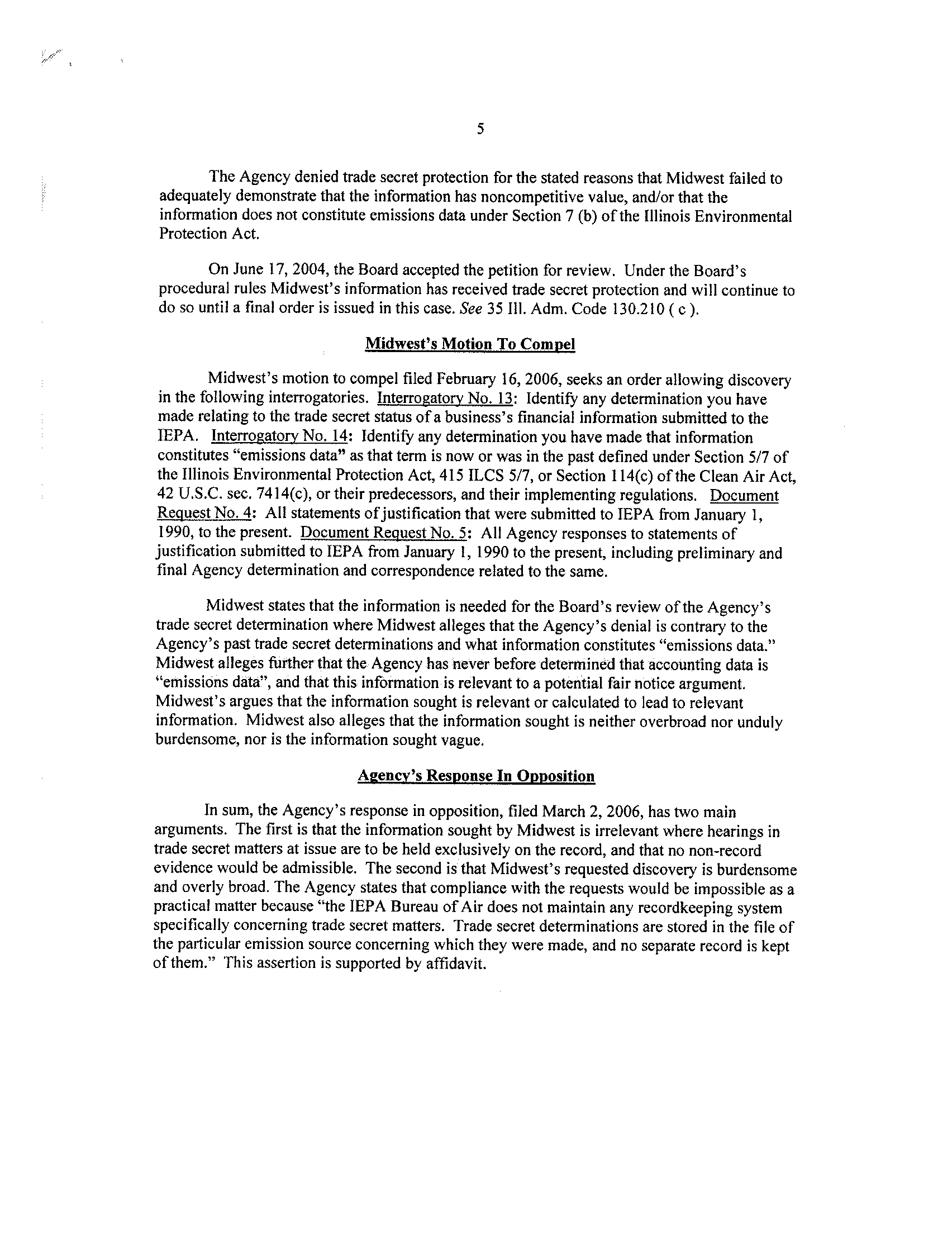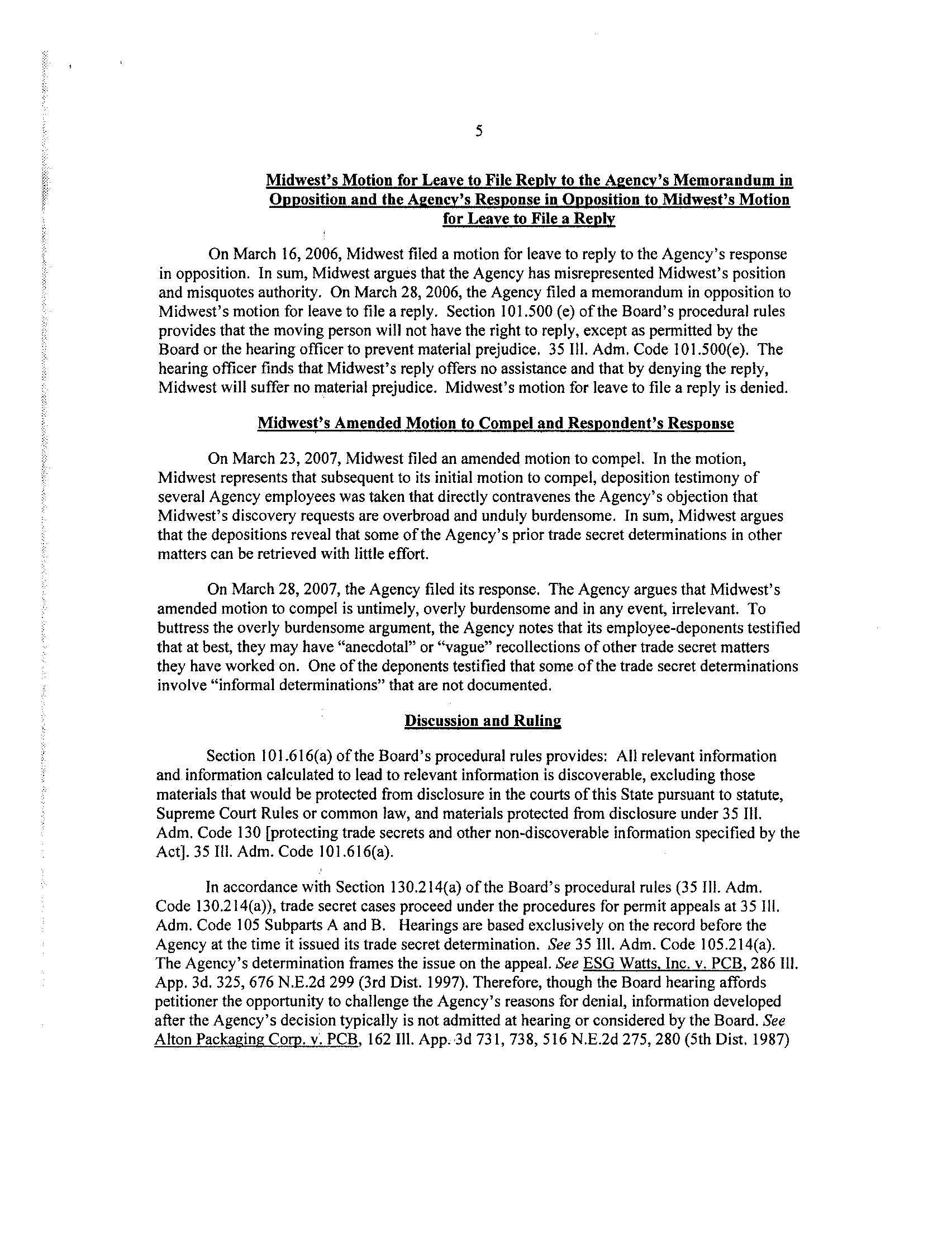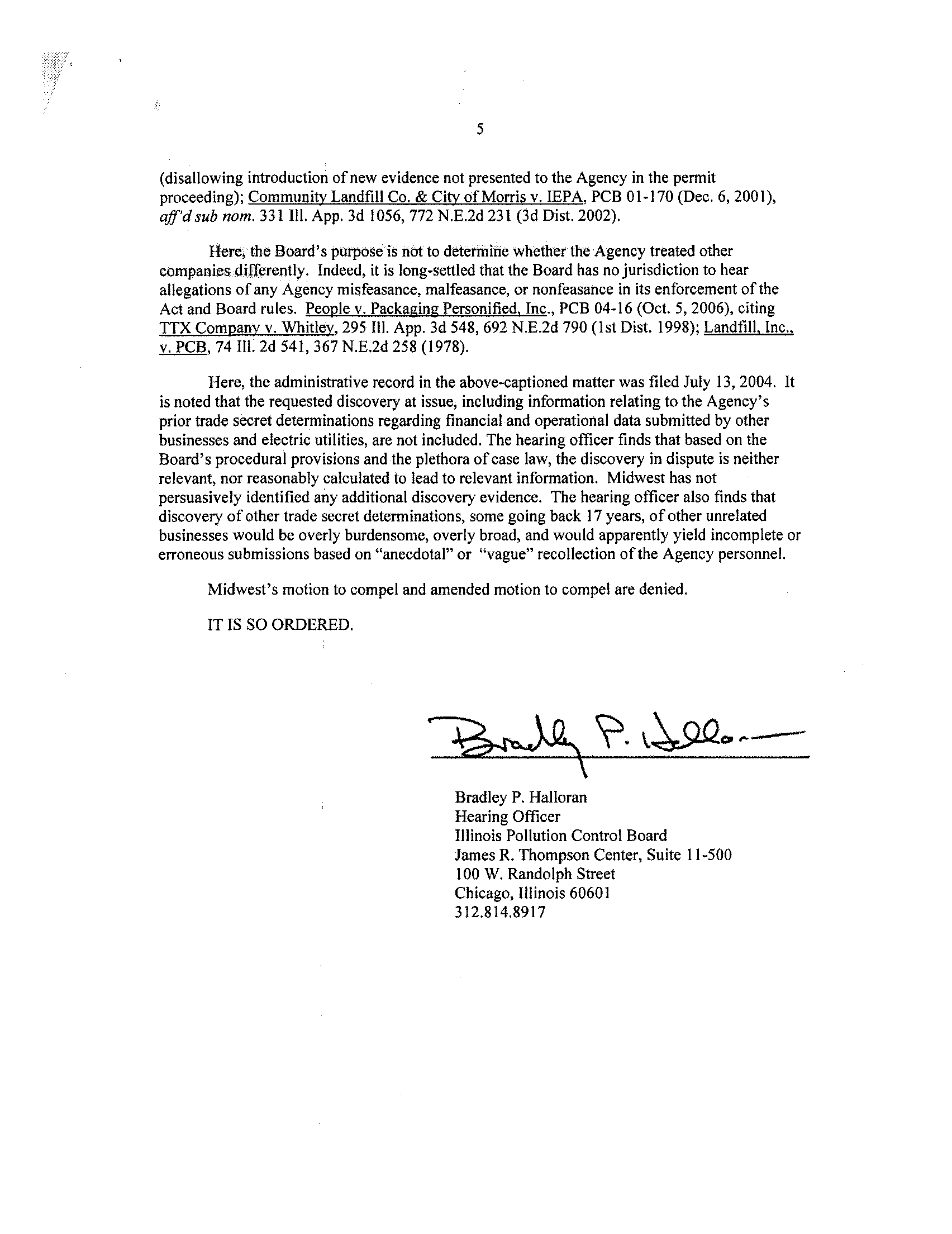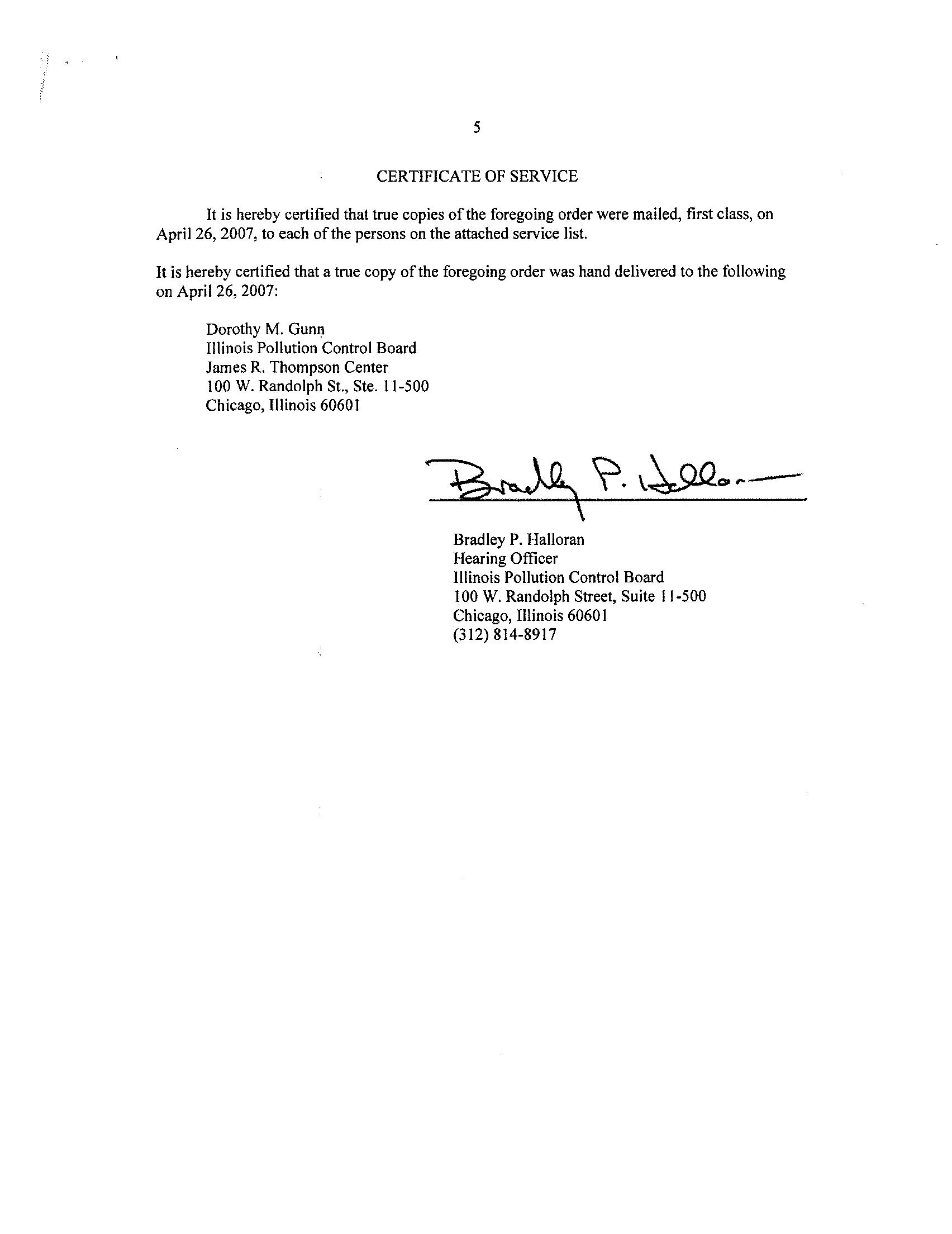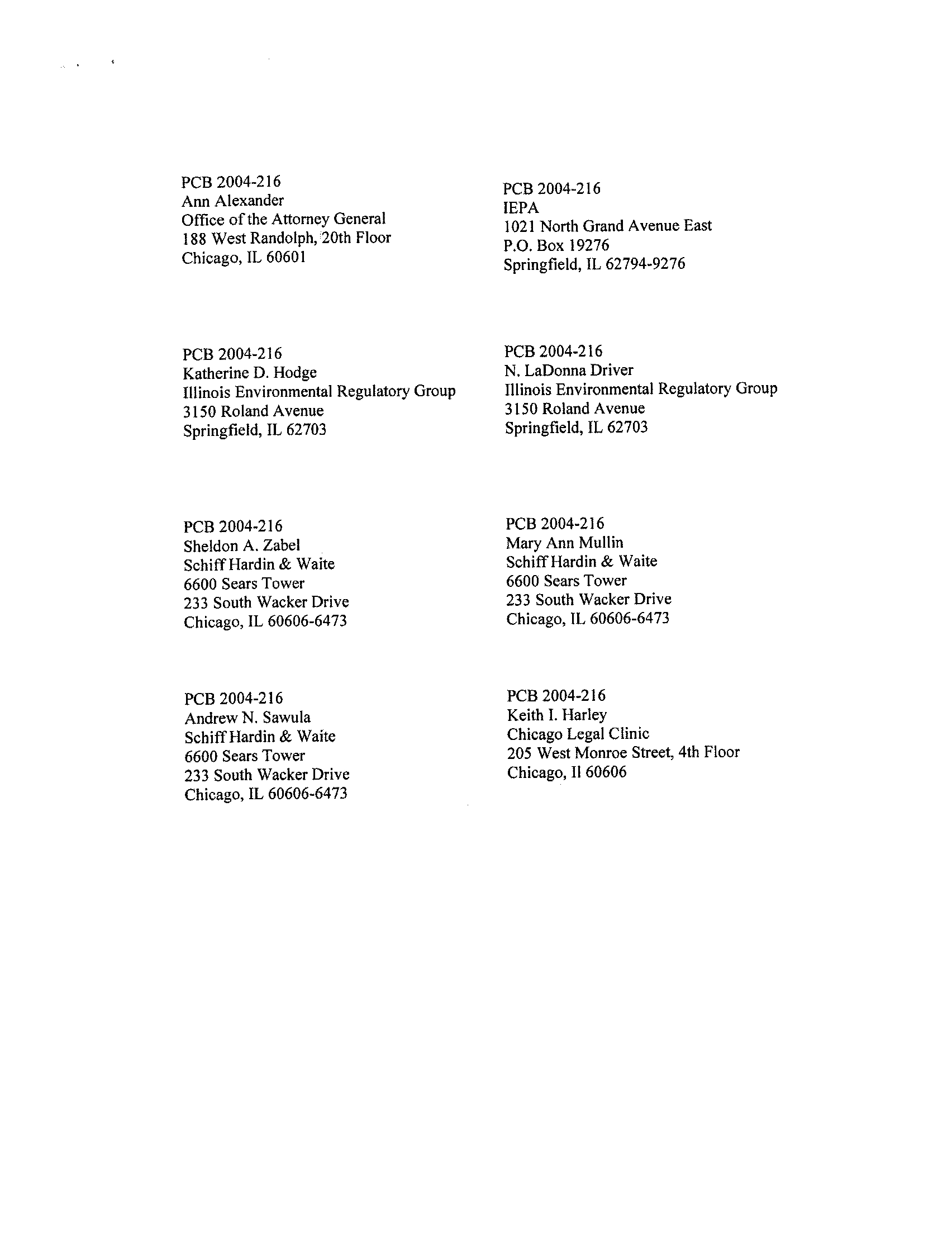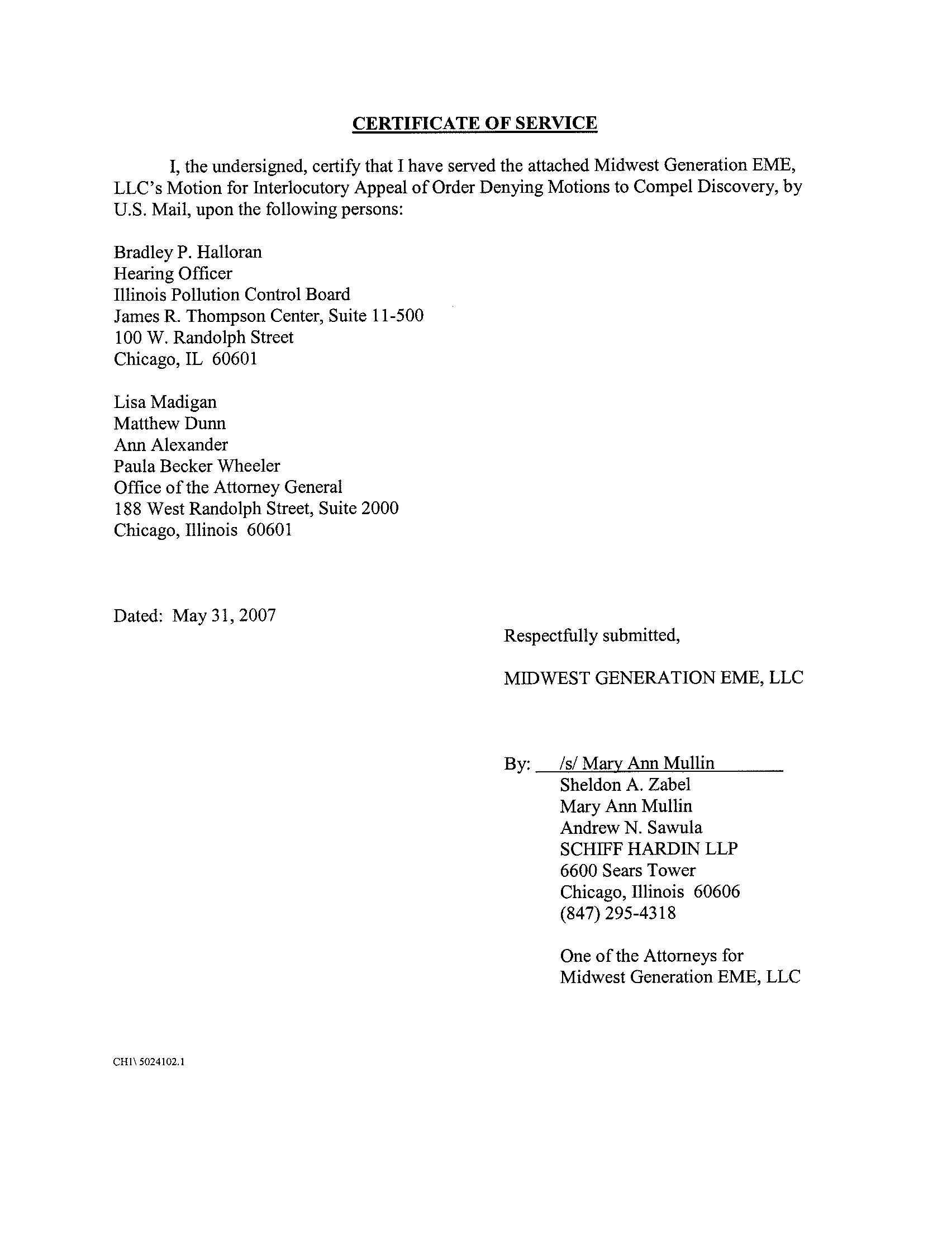Electronic Filing, Received, Clerk's Office, May 31, 2007
ILLINOIS POLLUTION CONTROL BOARD
)
)
MIDWEST GENERATION EME, LLC
)
Petitioner,
)
PCB 04-216
)
(Trade Secret Appeal)
v.
)
)
)
ILLINOIS ENVIRONMENTAL
)
PROTECTION AGENCY,
)
Respondent.
)
MIDWEST GENERATION EME, LLC’S MOTION FOR INTERLOCUTORY APPEAL
OF ORDER DENYING MOTIONS TO COMPEL DISCOVERY
Comes Now MIDWEST GENERATION EME, LLC (“Midwest Generation”),
through the undersigned counsel and pursuant to 35 Ill. Admin. Code. § 101.518, hereby files
this Motion for Interlocutory Appeal of the Corrected Hearing Officer Order denying Midwest
Generation’s Motion and Amended Motion to Compel the Illinois Environmental Protection
Agency’s (“IEPA’s”) responses to certain of Midwest Generation’s Initial Interrogatories and
Initial Requests for the Production of Documents.
BACKGROUND
1.
These proceedings arise from the IEPA’s April 23, 2004 determination denying
trade secret protection (the “Denial”), allegedly pursuant to 35 Ill. Admin. Code. § 130.214(a)
(“Section 130”), to excerpts from a confidential continuing property record (“CPR”) concerning
certain Illinois electric generating stations currently owned by Midwest Generation.
1
Midwest
1
The Continuing Property Record was maintained by Commonwealth Edison Company,
the former owner of the electric generating stations.
Electronic Filing, Received, Clerk's Office, May 31, 2007
-2-
Generation filed a Petition for Review of this determination, and the Pollution Control Board
(“Board”) accepted that Petition on June 17, 2004.
2.
Consistent with the Hearing Officer’s Scheduling Order in this matter, Midwest
Generation served IEPA with written discovery. Midwest Generation’s Interrogatories and
Document Requests sought, among other things, information relating to IEPA’s prior trade secret
determinations pertaining to financial and operational data — the same type of data at issue in
this trade secret dispute — submitted by other businesses. Midwest Generation further requested
the Agency’s prior analyses and/or determinations of what constitutes “emissions data,” because
IEPA used a novel definition of that term to deny trade secret protection to the CPR. The
relevant interrogatories and document requests are set forth below:
Interrogatory No. 13:
Identify any determination you have made relating to the
trade secret status of a business’s financial information submitted to IEPA.
Interrogatory No. 14:
Identify any determination you have made that
information constitutes “emission data” as that term is now or was in the past
defined under Section 5/7 of the Illinois Environmental Protection Act, 415 ILCS
5/7, or Section 114(c) of the Clean Air Act, 42 U.S.C. § 7414(c), or their
predecessors, and their implementing regulations.
Document Request No. 4
: All Statements of Justification that were submitted to
IEPA from January 1, 1990 to the present.
Document Request No. 5
: All agency responses to Statements of Justification
submitted to IEPA from January 1, 1990 to the present, including preliminary and
final agency determinations and correspondence related to the same.
(Petitioner’s Initial Interrogatories and Initial Document Requests, Exhibit A).
3.
IEPA provided no answers to the above-enumerated interrogatories, nor did it
agree to undertake reasonable efforts to locate responsive information.
IEPA instead
categorically objected that the discovery was overbroad, burdensome and vague.
See
(Respondent’s Responses to Interrogatories and Request for Production of Documents at 2,
Exhibit B).
Electronic Filing, Received, Clerk's Office, May 31, 2007
-3-
4.
Midwest Generation conferred with IEPA in an effort to resolve the discovery
disputes, but was unsuccessful. (Affidavit of M. Mullin, Ex. C).
5.
To obtain IEPA’s compliance with discovery, Midwest Generation filed its
Motion to Compel and Amended Motion to Compel, seeking responses to these very important
discovery requests. Therein, Midwest Generation explained that the discovery requests were
highly relevant to Midwest Generation’s reasonable expectation of what constituted “emissions
data” at the time Midwest Generation drafted its Statement of Justification. Midwest Generation
further contended that evidence of past agency interpretations of Section 130 (addressing trade
secret determinations) necessarily informed and guided IEPA’s application of those rules in
reaching their trade secret determination in this case, and that such information was therefore
plainly discoverable. In response to IEPA’s argument that the requested discovery was
burdensome and impractical, Midwest Generation reminded IEPA of its obligations to respond to
appropriate discovery by working with Midwest Generation to narrow the scope of the requests,
as opposed to stonewalling Midwest Generation.
6.
IEPA filed responses to the Motion to Compel and the Amended Motion to
Compel, opposing both motions.
7.
On April 26, 2007, the Hearing Officer issued a Corrected Order denying
Midwest Generation’s Motion to Compel (attached hereto as Exhibit G). Midwest Generation
now appeals the entry of the Corrected Order.
JURISDICTION
8.
The Board has jurisdiction to hear interlocutory appeals, by motion, from an
adverse order of the Hearing Officer. 35 Ill. Admin. Code § 101.518. Section 101.518 does not
specify the time period during which that appellate motion must be filed. However, other
Electronic Filing, Received, Clerk's Office, May 31, 2007
-4-
regulations within the Code provide a 35-day time period for seeking reconsideration or appeal
of an adverse determination.
E.g.
, 35 Ill. Admin. Code §§ 101.520, 105.404. Accordingly, this
motion should be deemed timely because it is filed within 35 days of the Corrected Order being
appealed, i.e., on or before May 31, 2007.
ARGUMENT
The Requested Discovery is Relevant to the Subject Matter of this Proceeding and
Reasonably Calculated to Lead to Evidence Bearing Upon Midwest Generation’s Appeal
9.
Under Board regulations, “all relevant information and information calculated to
lead to relevant information is discoverable.” 35 Ill. Admin. Code § 101.616(a) (emphasis
added). “Relevancy is determined by reference to the issues, for generally, something is relevant
if it tends to prove or disprove something in issue.”
Bauter v. Reding
, 68 Ill. App. 3d 171, 175
(1979). Discovery is designed to ensure a fair and just proceeding.
See Youle v. Ryan
, 349 Ill.
App. 3d 377, 380–81 (2004) (citation omitted). Discovery is particularly warranted when useful
facts are in the exclusive possession of the opposing party.
Burger v. Lutheran General
Hospital
, 198 Ill. 2d 21, 44-45 (2001) (citation omitted).
10.
In this case, Midwest Generation seeks discovery about prior IEPA interpretations
of the trade secrets regulation, Section 130, particularly its use of the term “emissions data.” The
document at issue in this proceeding — a Commonwealth Edison accounting document —
contains no emissions measurements whatsoever.
Nonetheless, the IEPA has taken the
remarkable position that the CPR is “emissions data” exempt from trade secret protection under
Section 130 of the Code, because the information contained therein could be used to enforce
compliance with air laws. (C. Romaine 3/17/06 Depo. at 27, Ex. E). IEPA admits that there is
no formal guidance on the definition of emissions data, that the guidance to the regulated
community comes from the IEPA’s “evolving practice,” as seen in trade secret determinations,
Electronic Filing, Received, Clerk's Office, May 31, 2007
-5-
and the IEPA’s denial of the CPR is a new evolution in the agency’s interpretation of the term
“emissions data.” (Romaine 3/16/06 Depo. at 64–66, 3/17/06 Depo. at 126, Ex. E). Midwest
Generation will argue that this is a new interpretation of the term “emissions data,” and the
interpretation is so broad and unprincipled that Midwest Generation could not have been on
notice that IEPA would consider the CPR “emissions data.” Put simply, under this new
approach, IEPA now apparently considers any document IEPA chooses to review in its
inspections or investigations of a business’ compliance with the Environmental Protection Act to
be “emissions data,” thereby allowing the “emissions data” exception to swallow the rule that
trade secret documents submitted to IEPA are entitled to protection from disclosure.
11.
Under Illinois precedents, prior agency interpretations of a regulation are
indisputably relevant in subsequent proceedings involving that same regulation. An agency
ordinarily is constrained by its prior interpretations, and cannot treat subsequent parties
differently without substantial justification.
Central Illinois Public Service Co. v. Pollution
Control Board
, 165 Ill. App. 3d 354, 366 (1988). “[A]dministrative agencies are bound by their
long-standing policies and customs of which affected parties had prior knowledge.”
Id.
at 363.
“While an agency is not required to adhere to a certain policy or practice forever, sudden and
unexplained changes have often been considered arbitrary.”
Greer v. Illinois Housing
Development Authority
, 122 Ill.2d 462, 506 (Ill. 1988).
12.
At the hearing on Midwest Generation’s petition, Midwest Generation will be
entitled to cross-examine IEPA personnel on the basis for their decision to adopt a novel
definition of the term “emissions data.” If, in fact, IEPA’s expansive interpretation of this term
is a departure from prior practice, as Midwest Generation believes, then this fact is powerful
evidence that the IEPA’s trade secret determination was arbitrary and unsupportable in law.
Although documents relating to prior interpretations of the term “emissions data” may not
Electronic Filing, Received, Clerk's Office, May 31, 2007
-6-
become part of the record, they nonetheless will substantiate and inform Midwest Generation’s
cross-examination and refutation of the IEPA’s Denial in this case. “Basic notions of fair play
require that parties have an opportunity to cross-examine, explain or refute facts which form the
basis for an administrative agency’s adjudication.”
Six-Brothers King Drive Supermarket, Inc. v.
Department of Revenue
, 192 Ill. App. 3d 976, 983–94 (1989). Accordingly, discovery of IEPA’s
prior trade secret rulings and/or interpretations of the term “emissions data” is reasonably
calculated to lead to evidence that may be presented at the Board’s hearing.
13.
The Hearing Officer erred in finding to the contrary. The Hearing Officer
concluded that the evidence relating to prior trade secret determinations was irrelevant because
“the Board’s purpose is not to determine whether the Agency treated other companies
differently,” and because prior trade secret determinations are not part of the record in this case.
(Corrected Order at 5). Both findings are erroneous, and should be rejected. As an initial matter,
the Hearing Officer’s ruling is contrary to Illinois law. As indicated above, it is the IEPA’s duty
to interpret regulations consistently for each party before it. If IEPA has applied a different
standard to Midwest Generation than it applied to other parties, than the Board likely will be
compelled to sustain Midwest Generation’s appeal.
See Alton Packaging Corp. v. Pollution
Control Board
, 146 Ill. App. 3d 1090, 1094 (1986).
14.
The Hearing Officer also incorrectly assumed that material outside the record is
not capable of being relied upon, or introduced for some limited purpose, at the Board hearing on
Midwest Generation’s appeal. This assumption was erroneous for multiple reasons. First,
Midwest Generation is entitled to cross-examine IEPA’s representatives about their basis for
denying Midwest Generation’s trade secret claims in light of prior, similar claims that apparently
were sustained.
Six-Brothers
, 192 Ill. App. 3d at 983. Due process requires that a party’s right
to cross-examination, be meaningful, i.e., informed by appropriate facts and circumstances.
See
Electronic Filing, Received, Clerk's Office, May 31, 2007
-7-
Northern State Home Builders Ass'n, Inc. v. County of Du Page
, 165 Ill.2d 25, 45 (Ill. 1995);
Midwest Generation v. IEPA
, No. 04-216, at 21 (PCB June 17, 2004). Without the requested
discovery, Midwest Generation’s cross-examination of IEPA at the Board hearing will be
meaningless: Midwest Generation’s counsel will ask about prior interpretations of “emissions
data,” and IEPA personnel, having successfully resisted the demand to review and disclose their
prior interpretations, will respond that they don’t know the answer to this essential question.
Second, evidence of inconsistent prior rulings can be used for impeachment purposes, and even
admitted for the limited purpose of constituting a prior inconsistent statement. 35 Ill. Admin.
Code § 101.626(f). Third, the Code specifically directs the Hearing Officer to admit evidence
based on “a good faith argument as to the interpretation of substantive law.” 35 Ill. Admin Code
§ 101.626(b). That is the case here. Midwest Generation contends that the trade secret
regulation, Section 130, by exempting “emissions data” from protection, means exactly what it
says, while IEPA contends that it means something broader. Under the Code, Midwest
Generation is entitled to present evidence of the reason for its belief that IEPA has misinterpreted
Section 130. Finally, Midwest Generation is permitted to supplement the record with “new
information” not available to Midwest Generation at the time of the original trade secret
determination, particularly when that information supports the notion that IEPA’s decision was
fundamentally unfair, and is thus unlikely to be included by the IEPA in the written record.
2
Land & Lakes v. Illinois Pollution Control Board
, 319 Ill. App. 3d 41, 48 (2000);
see also
2
That concern is particularly warranted in this case. In their depositions, IEPA
employees admitted that a number of the materials later inserted into the “record” were not
specifically reviewed by the Bureau of Air in reaching its trade secret determination. (Pressnall
3/15/06 Depo. at 153–155, Ex. D; J. Armitage 3/16/06 Depo. at 61–62, Ex. F). It is troubling
that the IEPA has included in the record materials it did not review
in issuing the Denial, while
simultaneously arguing that prior interpretations of the term “emissions data,” which the IEPA is
required to consider, are not even discoverable.
Electronic Filing, Received, Clerk's Office, May 31, 2007
-8-
Midwest Generation v. IEPA
, No. 04-216, at 21–22 (PCB June 17, 2004). IEPA has exclusive
knowledge about its prior interpretations and rulings. The fact that the requested information lies
exclusively in the custody of the opposing party is, once again, a strong argument in favor of
permitting discovery.
Burger
, 198 Ill. 2d at 44-45. If the requested discovery proves that IEPA
has abruptly changed course without substantial justification, then Midwest Generation will be
able to supplement the record with this new information, and such information will be fully
admissible at the hearing on Midwest Generation’s appeal.
To the Extent the Requested Discovery is Unduly Burdensome, IEPA Should Offer a
Subset of the Known Materials for Inspection
15.
The Hearing Officer further found that it would be unduly burdensome for the
IEPA to comply with Midwest Generation’s discovery requests, because trade secret
determinations are catalogued by site, rather than by subject matter. The Hearing Officer
expressed particular concern about the prospect of the IEPA searching all of its files for the last
17 years. (Exhibit G at 5).
16.
These concerns are misplaced. Midwest Generation’s discovery requests were
understandably broad because it lacks IEPA’s full knowledge of prior trade secret
determinations. Midwest Generation has repeatedly offered to meet and confer with IEPA to
narrow its requests to a few known determinations, as a starting point. (Mullin Aff. ¶ 6, Ex. C).
IEPA, unfortunately, has suggested that Midwest Generation will be satisfied only with a
complete review of every project over the past two decades. This is not true. When a party’s
discovery requests, tendered in good faith, turn out to be overbroad or unduly burdensome, the
proper approach is to respond with a subset of known information that is responsive and
reasonably attainable. The responding party should not simply refuse to comply with the
discovery request altogether.
See Welton v. Ambrose
, 351 Ill. App. 3d 627 (2004).
Electronic Filing, Received, Clerk's Office, May 31, 2007
-9-
17.
“To allow a defendant whose business generates massive records to frustrate
discovery by creating an inadequate filing system, and then claiming undue burden, would defeat
the purposes of discovery rules.”
Alliance to End Repression v. Rochford
, 75 F.R.D. 441, 447
(N.D. Ill. 1977) (citation omitted). Nonetheless, as contemplated by
Welton
, there is a middle
path through the parties’ positions, which IEPA pretends does not exist, and the Hearing Officer
erred by refusing to consider. As Midwest Generation pointed out in the proceedings below,
IEPA employees deposed in these proceedings have identified particular claimants whom they
believe may have been involved in trade secret proceedings before the agency. (C. Romaine
3/16/06 Depo. at 25–28, Ex. E; C. Pressnall 3/15/06 Depo. at 31–33, 107, Ex. D). Another
employee explained that trade secret determinations are tracked by source. (J. Armitage 3/15/06
Depo. at 23, Ex. F).
3
It should not be unduly burdensome for the IEPA to review and produce
the files of a few, specified sources within the Bureau of Air for trade secret determinations
made in those cases. Midwest Generation is willing to accept this production as a starting point,
and has been for over a year.
CONCLUSION
18.
It is time for the IEPA to stop obstructing Midwest Generation’s reasonable
investigation into past interpretations of the trade secrets regulation, and particularly the term
“emissions data.” Without this information, the Board cannot determine if the IEPA’s refusal to
confer trade secret protection on the CPR at issue on this appeal constituted an arbitrary
3
Although IEPA has been critical of attempts to rely on the memories of its own
employees, it is fair to assume that cases still in the mind of these IEPA employees at the time of
their depositions likely also would have been in their mind at the time they decided to deny trade
secret protection to Midwest Generation’s continuing property record. Furthermore, being
supported by sworn testimony, an investigation of the trade secret determinations made in the
identified cases is reasonably targeted, and thereby also reasonably calculated to lead to the
discovery of pertinent evidence.
Electronic Filing, Received, Clerk's Office, May 31, 2007
-10-
departure from past practice, as Midwest Generation and its counsel in good faith believe. The
Hearing Officer erred by misunderstanding the significance of the information sought, and by
accepting without question IEPA’s exaggerated claims of undue burden, without recognizing that
a small subset of the materials could be produced in a manner that would still advance the merits
of this appeal, and ensure that the ends of justice are served. The Board should reverse the
Corrected Order of the Hearing Officer, and direct that the IEPA produce the materials requested
for the sources identified by the IEPA deponents.
WHEREFORE, Midwest Generation respectfully requests that the Board grant its Motion
for Interlocutory Appeal, reverse the Corrected Order of the Hearing Officer, and direct IEPA to
provide full and complete responses to Midwest Generation’s discovery requests.
Dated: May 31, 2007
Respectfully submitted,
MIDWEST GENERATION EME, LLC
By: /s/ Mary Ann Mullin
Mary Ann Mullin
SCHIFF HARDIN LLP
6600 Sears Tower
Chicago, Illinois 60606
(847) 295-4318
Attorney for
MIDWEST GENERATION EME,
LLC
CH2\ 1863829.4
Electronic Filing, Received, Clerk's Office, May 31, 2007
Electronic Filing, Received, Clerk's Office, May 31, 2007
Electronic Filing, Received, Clerk's Office, May 31, 2007
Electronic Filing, Received, Clerk's Office, May 31, 2007
Electronic Filing, Received, Clerk's Office, May 31, 2007
Electronic Filing, Received, Clerk's Office, May 31, 2007
Electronic Filing, Received, Clerk's Office, May 31, 2007
Electronic Filing, Received, Clerk's Office, May 31, 2007
Electronic Filing, Received, Clerk's Office, May 31, 2007
Electronic Filing, Received, Clerk's Office, May 31, 2007
Electronic Filing, Received, Clerk's Office, May 31, 2007
Electronic Filing, Received, Clerk's Office, May 31, 2007
Electronic Filing, Received, Clerk's Office, May 31, 2007
Electronic Filing, Received, Clerk's Office, May 31, 2007
Electronic Filing, Received, Clerk's Office, May 31, 2007
Electronic Filing, Received, Clerk's Office, May 31, 2007
Electronic Filing, Received, Clerk's Office, May 31, 2007
Electronic Filing, Received, Clerk's Office, May 31, 2007
Electronic Filing, Received, Clerk's Office, May 31, 2007
Electronic Filing, Received, Clerk's Office, May 31, 2007
Electronic Filing, Received, Clerk's Office, May 31, 2007
Electronic Filing, Received, Clerk's Office, May 31, 2007
Electronic Filing, Received, Clerk's Office, May 31, 2007
Electronic Filing, Received, Clerk's Office, May 31, 2007
Electronic Filing, Received, Clerk's Office, May 31, 2007
Electronic Filing, Received, Clerk's Office, May 31, 2007
Electronic Filing, Received, Clerk's Office, May 31, 2007
Electronic Filing, Received, Clerk's Office, May 31, 2007
Electronic Filing, Received, Clerk's Office, May 31, 2007
Electronic Filing, Received, Clerk's Office, May 31, 2007
Electronic Filing, Received, Clerk's Office, May 31, 2007
Electronic Filing, Received, Clerk's Office, May 31, 2007
Electronic Filing, Received, Clerk's Office, May 31, 2007
Electronic Filing, Received, Clerk's Office, May 31, 2007
Electronic Filing, Received, Clerk's Office, May 31, 2007
Electronic Filing, Received, Clerk's Office, May 31, 2007
Electronic Filing, Received, Clerk's Office, May 31, 2007
Electronic Filing, Received, Clerk's Office, May 31, 2007
Electronic Filing, Received, Clerk's Office, May 31, 2007
Electronic Filing, Received, Clerk's Office, May 31, 2007
Electronic Filing, Received, Clerk's Office, May 31, 2007
Electronic Filing, Received, Clerk's Office, May 31, 2007
Electronic Filing, Received, Clerk's Office, May 31, 2007
Electronic Filing, Received, Clerk's Office, May 31, 2007
Electronic Filing, Received, Clerk's Office, May 31, 2007
Electronic Filing, Received, Clerk's Office, May 31, 2007
Electronic Filing, Received, Clerk's Office, May 31, 2007
Electronic Filing, Received, Clerk's Office, May 31, 2007
Electronic Filing, Received, Clerk's Office, May 31, 2007
Electronic Filing, Received, Clerk's Office, May 31, 2007
Electronic Filing, Received, Clerk's Office, May 31, 2007
Electronic Filing, Received, Clerk's Office, May 31, 2007
Electronic Filing, Received, Clerk's Office, May 31, 2007
Electronic Filing, Received, Clerk's Office, May 31, 2007
Electronic Filing, Received, Clerk's Office, May 31, 2007
Electronic Filing, Received, Clerk's Office, May 31, 2007
Electronic Filing, Received, Clerk's Office, May 31, 2007
Electronic Filing, Received, Clerk's Office, May 31, 2007
Electronic Filing, Received, Clerk's Office, May 31, 2007
Electronic Filing, Received, Clerk's Office, May 31, 2007
Electronic Filing, Received, Clerk's Office, May 31, 2007
Electronic Filing, Received, Clerk's Office, May 31, 2007
Electronic Filing, Received, Clerk's Office, May 31, 2007
Electronic Filing, Received, Clerk's Office, May 31, 2007
Electronic Filing, Received, Clerk's Office, May 31, 2007
Electronic Filing, Received, Clerk's Office, May 31, 2007
Electronic Filing, Received, Clerk's Office, May 31, 2007
Electronic Filing, Received, Clerk's Office, May 31, 2007
Electronic Filing, Received, Clerk's Office, May 31, 2007
Electronic Filing, Received, Clerk's Office, May 31, 2007
Electronic Filing, Received, Clerk's Office, May 31, 2007
Electronic Filing, Received, Clerk's Office, May 31, 2007
Electronic Filing, Received, Clerk's Office, May 31, 2007
Electronic Filing, Received, Clerk's Office, May 31, 2007



